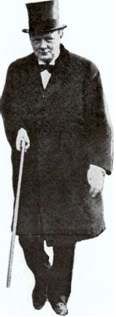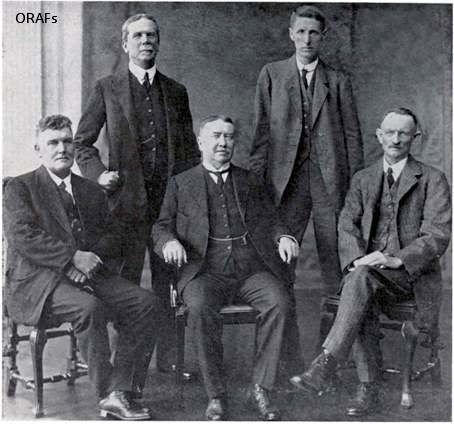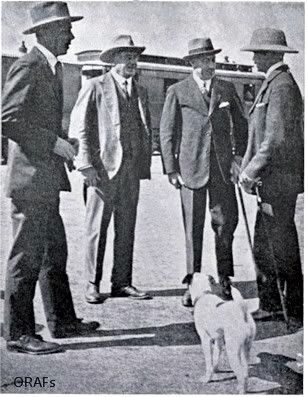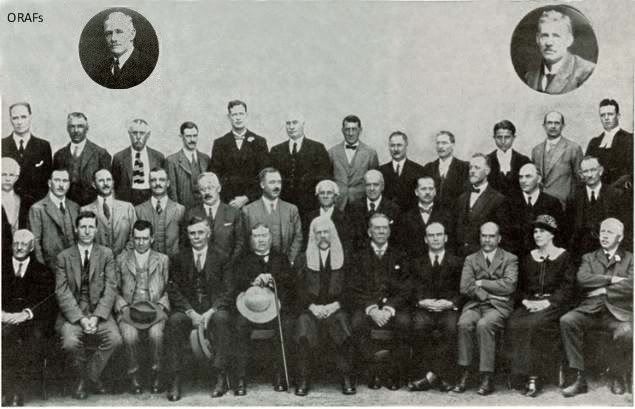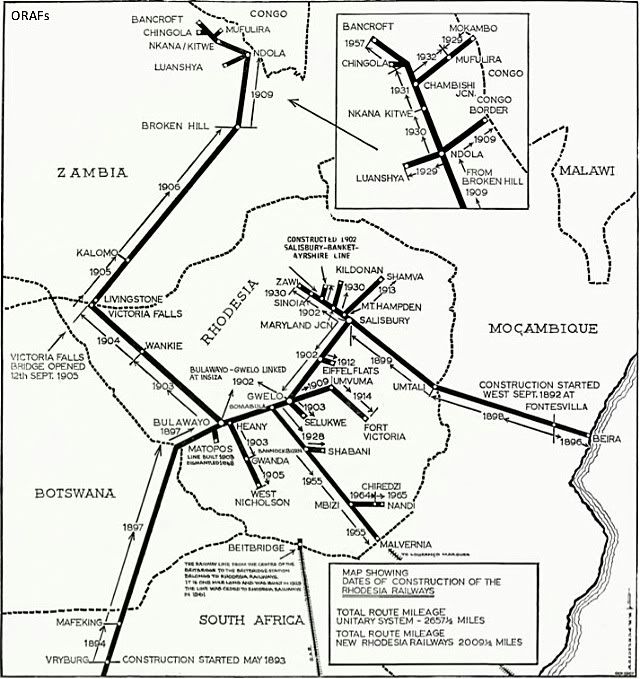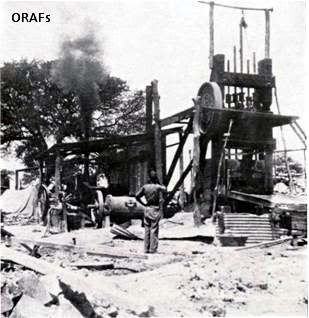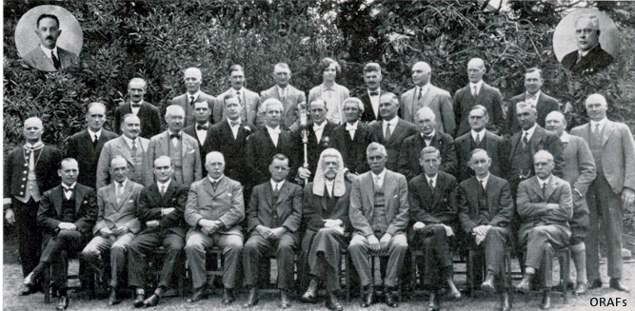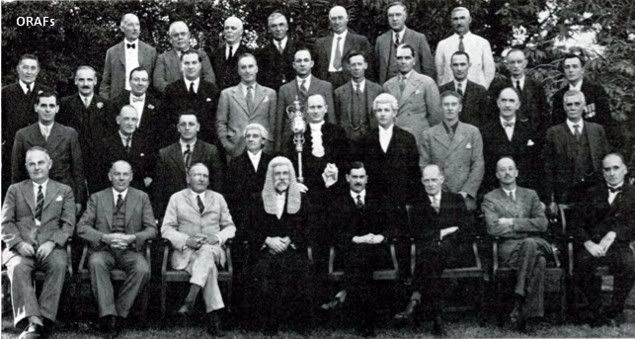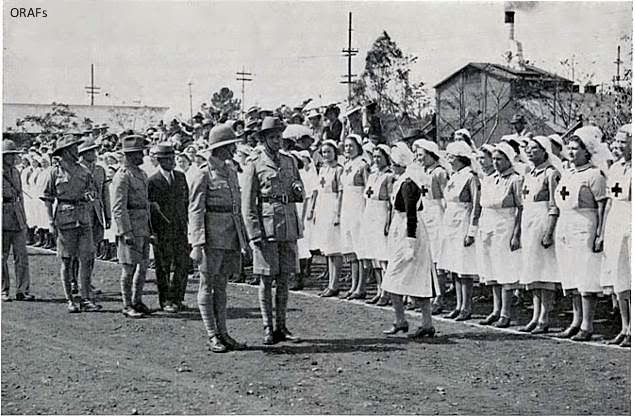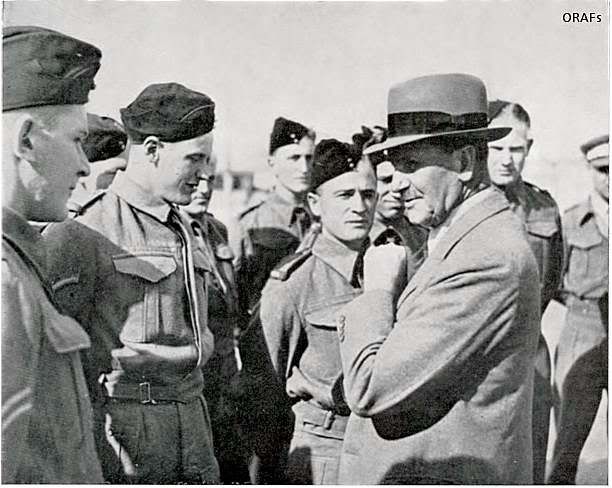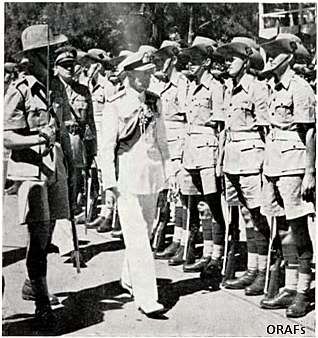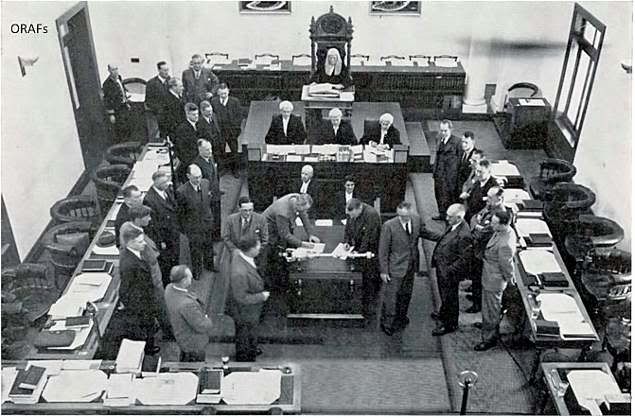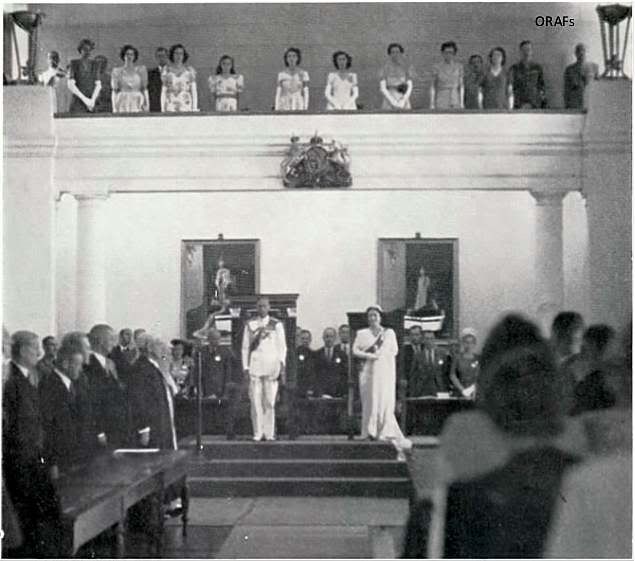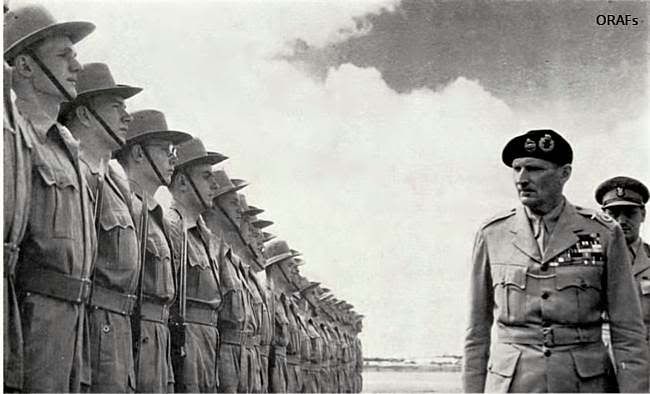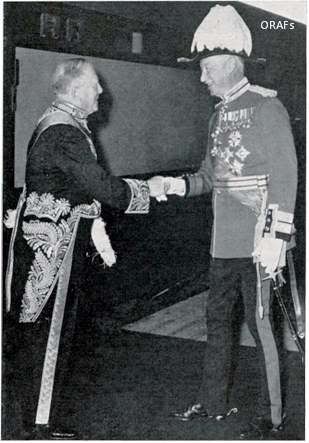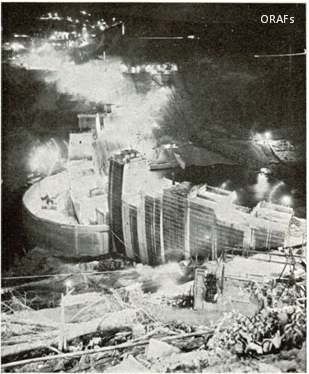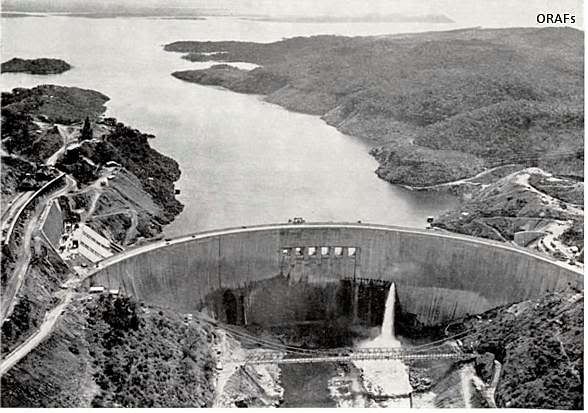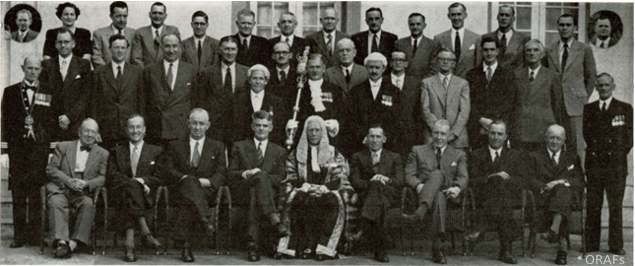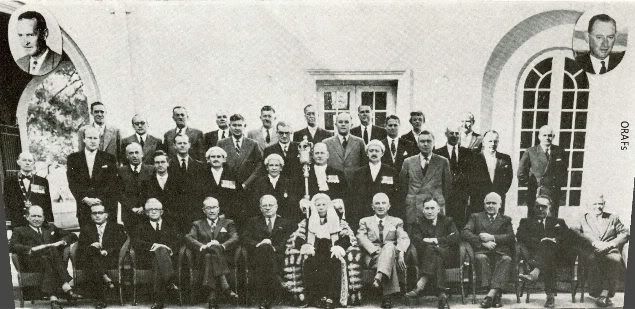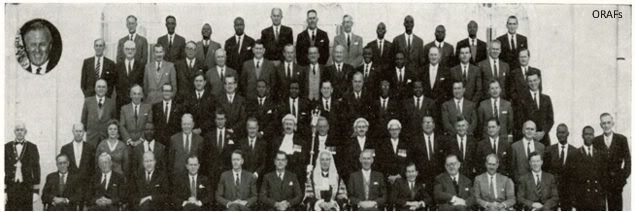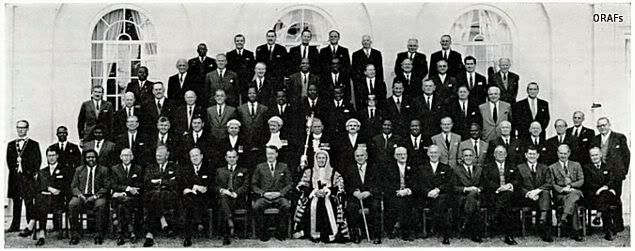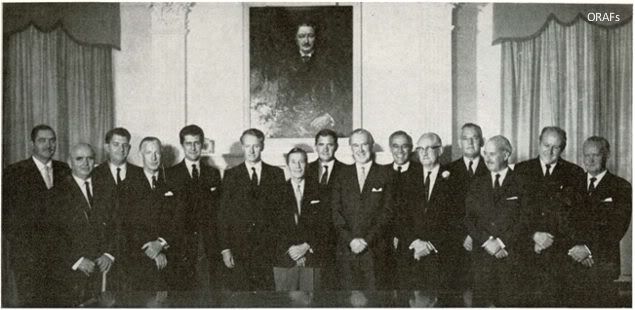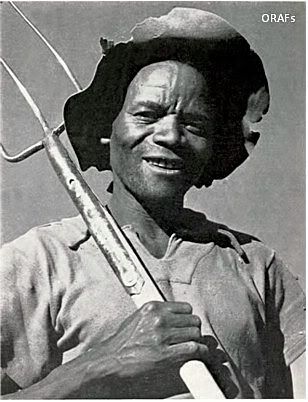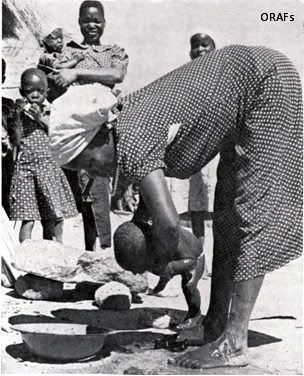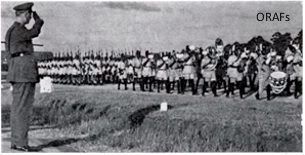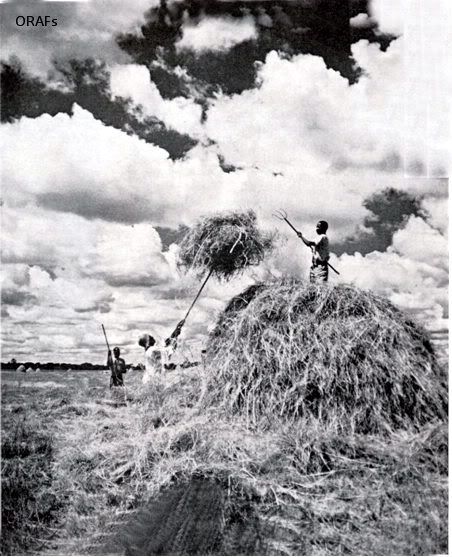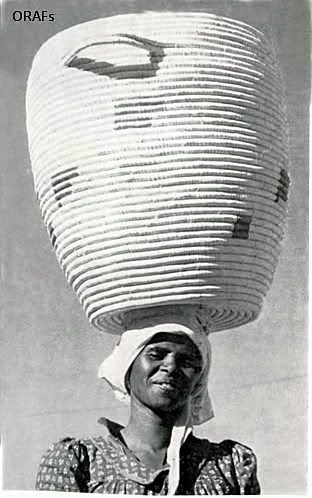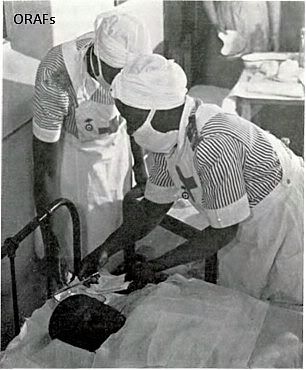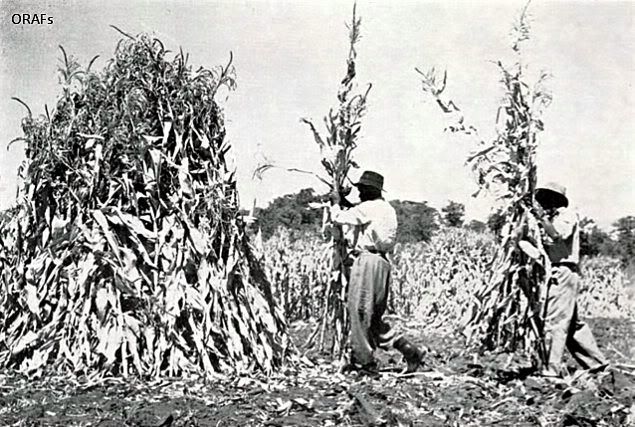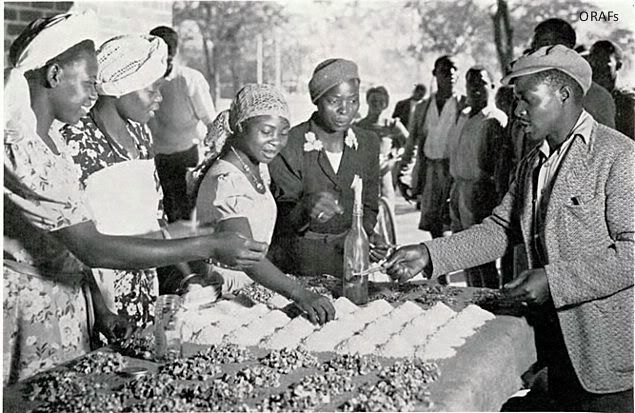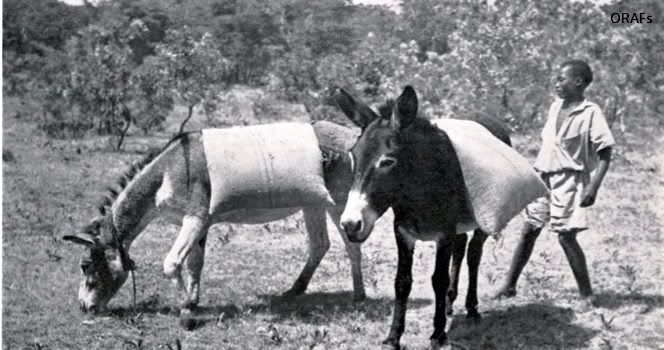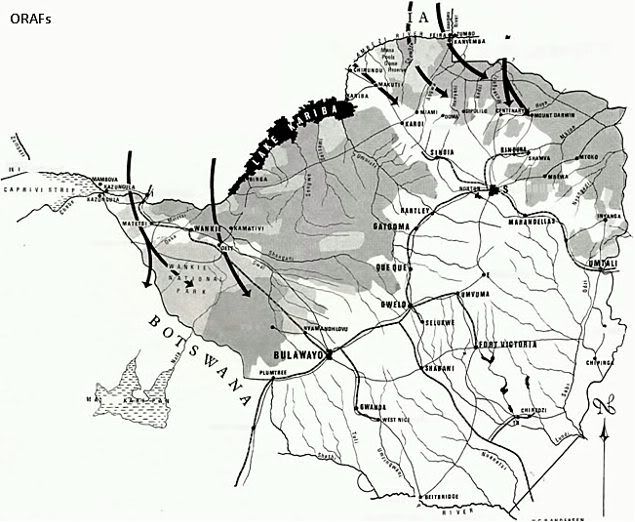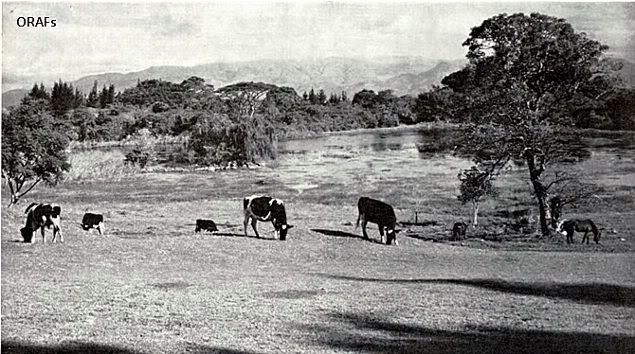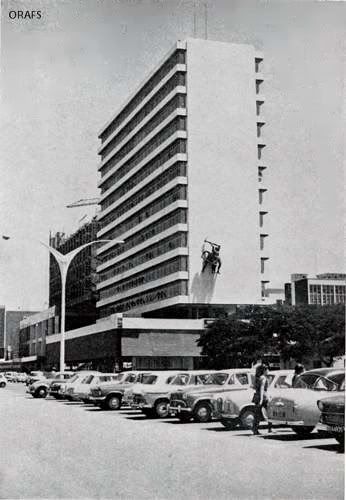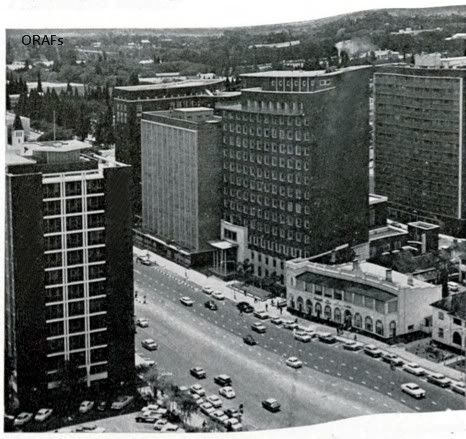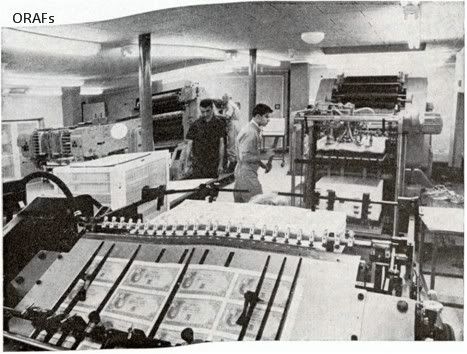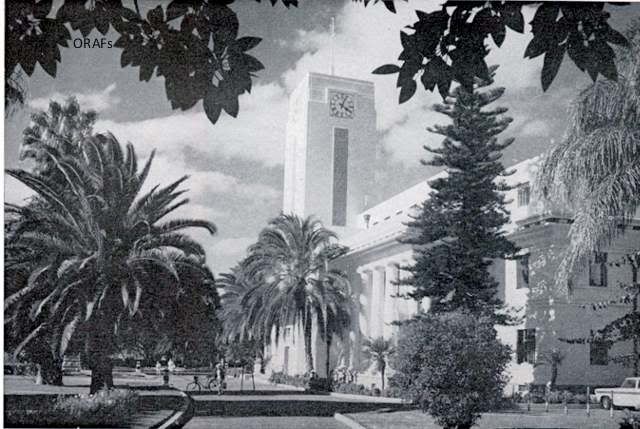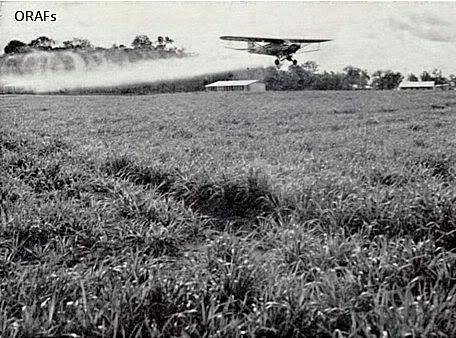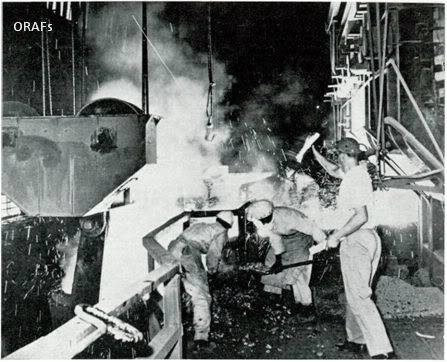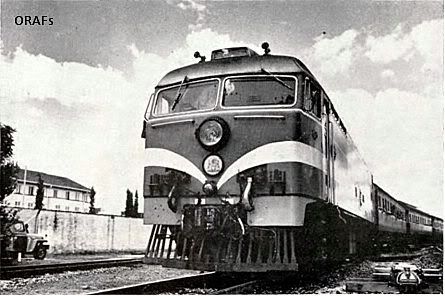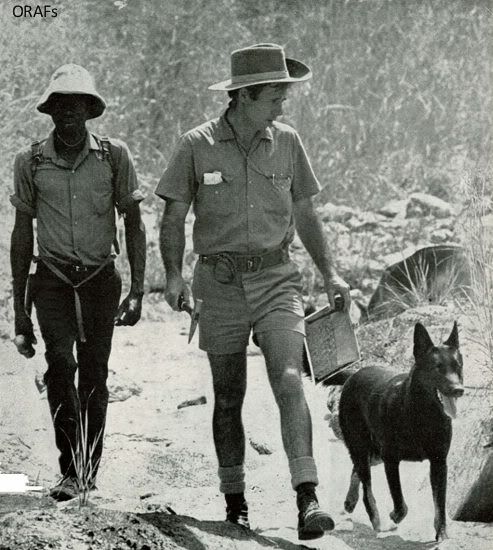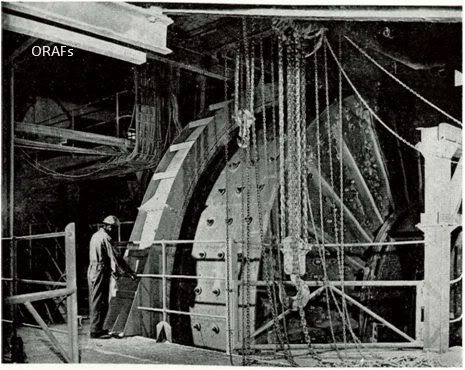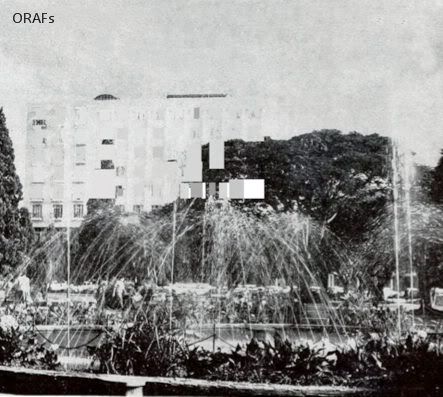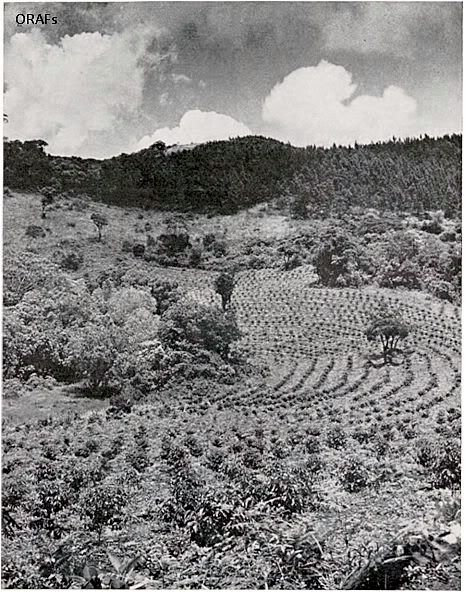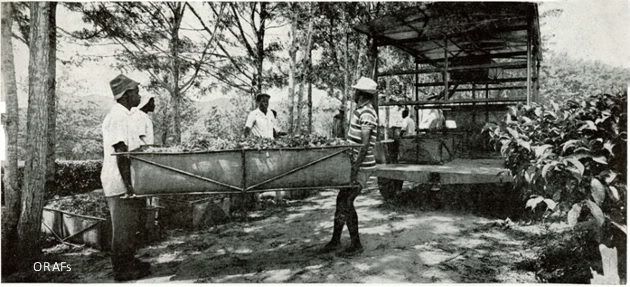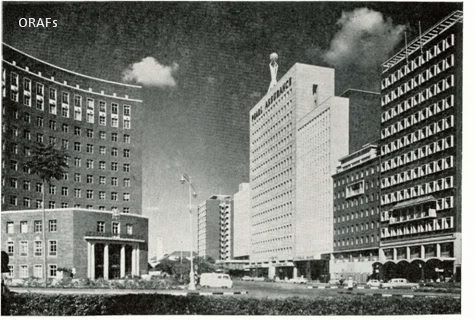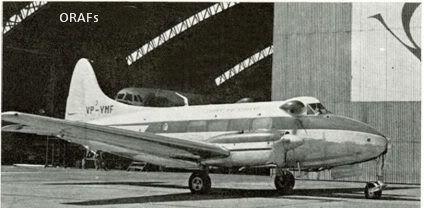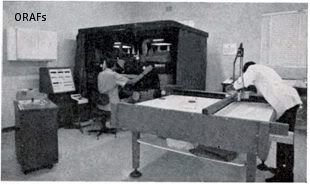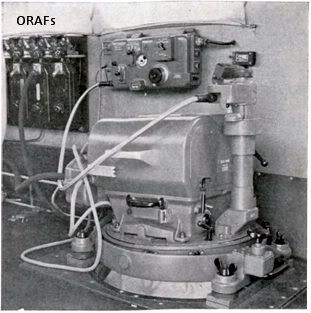Rhodesia- The Years Between

Cover
THE YEARS BETWEEN
1923 - 1973
HALF A CENTURY OF RESPONSIBLE GOVERNMENT IN RHODESIA
by
W. D. GALE, M.B.E.
The Clamour for Self-Government.
Tackling (The Problem.
Disposing of the Land.
Steady Expansion.
The Federal Experiment.
Tho New Leaders.
Patience Runs Out.
The Settlement Terms.
Proposals for Settlement.
The Test of Acceptability.
The Terrorist Threat.
A Flourishing Economy.
Chronological Table.
Contributed
You Cannot Plan Without a Map
Maps
Construction of Rhodesia Railways.
Terrorist Invasion Routes.
Index to Participants.
Except where stated otherwise, the photographs in this volume are acknowledged to the National Archives and the Photographic Unit, Ministry of Information.
Designed, Compiled and Published by: H. C. P. Andersen, P.O. Box 1566. Salisbury, Rhodesia
Printed in Rhodesia by: Mardon Printers (Pvt.) Ltd., at Salisbury.
COUNCIL THAT BECAME PARLIAMENT
The Legislative Council, precursor of the Parliament of today, consisted of nominated members of the Chartered Company's Administration and of members elected by the people. This photograph was taken in 1914 and includes many who were later to become members of the First Legislative Assembly under responsible government
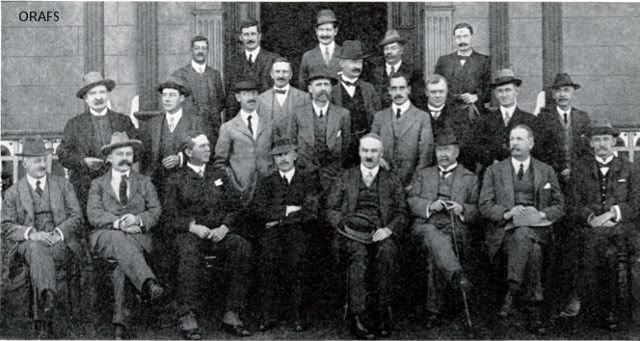
Front row, from left to right: Mr. (later Sir) Ernest Montagu; Major Gordon Forbes; Mr.
(later Sir) Francis Newton; Colonel Burnes Begg; Sir William Milton; Sir Charles Coghlan;
Colonel (later Sir) Raleigh Grey; Mr. (later Sir) Clarkson Tredgold.
Middle row, left to right: Mr. J. H. Kennedy; Mr. E. A. Begbie; Mr. B. I. CoUings; Mr. Arnold Edmonds; Mr. Lionel Cripps; Mr. George Mitchell; Dr. Eric Nobbs; Mr. George Duthie;
(later Sir) Francis Newton; Colonel Burnes Begg; Sir William Milton; Sir Charles Coghlan;
Colonel (later Sir) Raleigh Grey; Mr. (later Sir) Clarkson Tredgold.
Mr. M. E. Cleveland; Colonel (later Sir) Melville Heyman.
Back row, left to right: Mr. Colin Duff; Mr. James Robertson; Captain W. Bucknall;
Colonel W. Napier; Mr. Elles Edwards.
THE CLAMOUR FOR SELF - GOVERNMENT
FIFTY years ago the loyal British Colony of Southern Rhodesia was a quiet backwater well removed from the main stream of world affairs. Lacking a sea coast of her own, locked in by vast, poorly developed territories to the east, west and north, and by the infinitely greater and more vigorous Union of South Africa in the south, she lay well outside the beaten tracks of international communications, for in those days the steamship was the main medium of world transport. The aeroplane was in its flimsy infancy, and so was the radio, while the telephone was still a primitive instrument. The motorcar was a novelty, roads were sandy, potholed tracks and there was not a single road bridge across river or donga from one end of the country to the other. The horse and the ox were supreme and time was of no account. Life was placid and easy-going; the ulcer and the coronary thrombosis ranked well below malaria and black-water fever as a menace to human life. Nobody was very rich, but nobody was very poor, either, and since they were all members of the same isolated little community everybody knew everyone else, and everyone was an individual in his own right, especially if his skin was white. There were so few white skins and so many black skins, but they all lived happily together within the same boundaries. In many ways it was an idyllic existence, with its drawbacks, certainly, even with certain hardships, but since standards were the same for everybody nobody minded.
But that is not to say that nothing ever happened. In fact, a great deal had been happening, in the political sense, which was to change the face of the country and set Southern Rhodesia on a new course that was to bring her eventually to the forefront of world attention. For her first thirty-three years of European colonisation, she had been administered by the British South Africa Company, founded by Cecil Rhodes on the basis of a charter granted by Queen Victoria in 1889. which enjoyed great commercial as well as administrative privileges, and the residents had had little say in the direction of affairs. Major decisions were made by the Company's Board of Directors sitting in London and carried out by the Company's officials in Salisbury. The only opportunity the local population had of discussing, and if necessary objecting to, decisions that affected the very warp and weft of their lives, was in the Legislative Council in which both people's representatives and Company officials sat together under the chairmanship of the Administrator, with the latter having majority control so that the Company's viewpoint predominated. During Cecil Rhodes' lifetime the Company's policies had had a breadth of vision, and a feeling for the interests of the people on the spot, that enabled Company and settlers (as they were then called) to get along reasonably well together. But when Rhodes died in 1902 at the early age of 48, the people lost their champion and the Board lost its vision. Thereafter it seemed to the settlers that the Board's decisions were actuated by dreary commercial considerations, that the interests of the Company came before those of the people, and that it was using its administrative privileges for its own commercial advantage.
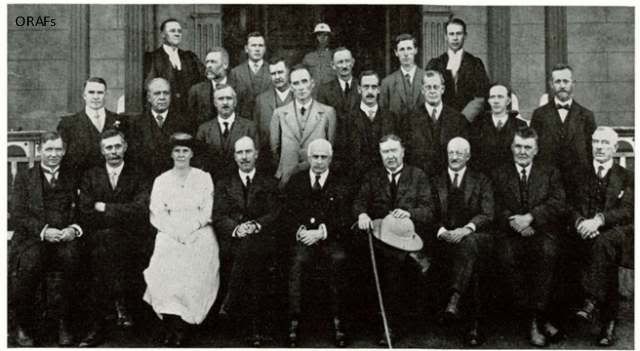
MEMBERS OF THE LEGISLATIVE COUNCIL, 1st SESSION 7th COUNCIL, 1920
Front row, left to right: R. Mcllwaine, Solicitor-General; P. D. L. Fynn, Treasurer;
Mrs. E. Tawse-Jollie; C. D. Douglas-Jones, C.M.G.Resident Commissioner; Sir D. Chaplin, K.C.M.G., Administrator; Sir Charles Coghlan; E. W. S. Montagu, Secretary for Mines and Works; J. McChlery; G. H. Eyre, Postmaster-General.
Second row, left to right: J. B. MacDonald; W. J. Boggie; W. D. Douglas-Jones; R. D. Gilchrist; E. A. Nobbs, Director of Agriculture;
J. D. MacKenzie, Attorney-General; J. Stewart; F. L. Hadfield.
Third row, left to right: L. Cripps; H. U. Moffat; R. A. Fletcher; W. M. Leggate.
Back row, left to right: J. G. Jearey, Clerk of Councils; A. R. Hone, Secretary; J. B. Grenfell-Hicks, Assistant Clerk.
The Rhodesians of those days were sturdy individualists. They had to be to survive. They were men and women of independent thought, accustomed to thinking for themselves, not at all inclined to meekly accept the dictates of titled gentlemen sitting in the cosy confines of their panelled boardroom in London Wall, issuing edicts that affected the lives of men battling against drought and flood and disease and poor markets and the thousand difficulties of life in a sub-tropical, poorly developed country. They objected to the fruits of their strenuous labours being diverted into the coffers of a commercial company, to the benefit (as they imagined) of unknown shareholders who naturally wanted to see a return on their money. As it happened the shareholders gained little. The cost of running the country barely kept pace with the revenue, and in most years the Company ended up with a deficit. But this did not deter the settlers from concluding that they could run the country better themselves. And so began the clamour for self-government.
It was led by a Bulawayo lawyer named Sir Charles Coghlan, the senior partner in the country's leading legal firm. Born in South Africa of Irish extraction, Coghlan had settled in Bulawayo in 1900 immediately after the lifting of the siege of Kimberley, in which he had played a worthy part as commander of redoubt. He soon began to take an interest in the affairs of his adopted country, and in 1907 emerged into the political limelight when he was chosen, with two others, to put the people's case to a party of Chartered Company directors from London, led by Dr. Starr Jameson, who were to investigate the settler's grievances.
Coghlan was particularly concerned at the Company's practice of diverting taxation revenue to its commercial accounts instead of applying it to the cost of the country's administration. He also objected to the Company's assumed right to dispose of land as it wished, usually to the friends of directors, and he accused the Company of abusing its legislative power in its own interests. So skilfully did he present his case that he became recognised as the champion of the people's rights, and after some hard bargaining he managed to secure some small but welcome concessions in regard to the mining laws, land titles and the allocation of revenues. His biggest gain, however, was to induce the Directors to reduce the number of officials on the Legislative Council from seven (which gave the people's representatives parity) to five, which gave them a majority on all except fiscal matters. He had hitherto refused to stand for election to the Legislative Council because of the official majority, but now that this barrier had been removed he offered himself for election in the general election of 1908.
A story is told of Coghlan's candidature which illustrates the tactics adopted by Company representatives in these matters, and also Coghlan's character. He was visiting relatives at Pietersburg in the Transvaal towards the end of 1907 when he received a telegram from his partner at Bulawayo, Allan Welsh (later Sir Allan Welsh, who became Speaker of the Southern Rhodesia Parliament) urging him to stand in the elections due early the following year. He was considering the matter when he received another telegram, this time from Mr. (later Sir) J. G. McDonald, a strong Company man, threatening that if he accepted nomination he (McDonald) would withdraw the business of all his companies from the legal firm of Coghlan and Welsh. That did it. Coghlan immediately wired Welsh to say that he accepted. He stood for the Western Division of Matabeleland, and after a hectic campaign was returned as senior member in April, 1908.
He was appointed leader of the Elected Members, and as such was chosen with two other delegates to represent Southern Rhodesia at the National Convention of the four South African States of the Cape Colony, Natal, Orange Free State and Transvaal, held at Durban in October, 1908. Its purpose was to consider whether the South African States should unite or federate, and Southern Rhodesia was invited as an interested party. At that time Coghlan believed that if South Africa united Rhodesia should enter the new State without delay, but at the Convention he was disillusioned by General J. B. M. Hertzog's implacable hostility to everything British and his uncompromising championship of Afrikanerdom. At the same time he was convinced that Rhodesia should ultimately become a part of the South African nation, and he was instrumental in seeing that the draft Bill (which later became the South Africa Act) provided for Rhodesia to decide at some future date whether and on what terms she should enter the Union of South Africa.
Caption
WINSTON CHURCHILL, who succeeded Lord Milner at the Colonial Office, was strongly in favour of Rhodesia joining the Union of South Africa, but eventually thought that Britain's terms for granting self-government a "very fair deal".
He explained his reasons after his return to Bulawayo.
The plight of Rhodesia under the control of a commercial corporation was most unsatisfactory, he said, and it was essential that the people should take over the reins of government. But not yet. The European population was too small to justify any claim to self-government at that stage. An alternative would be to join the Union of South Africa—but again, not yet. When the time came they must be able to do so freely and willingly, not as beggars but on equal terms, able to insist on fair and just treatment. In the meantime they must get on with developing the country.
The Union of South Africa came into being on May 31, 1910, and Coghlan was knighted for his services at the Convention, where his knowledge of constitutional law had been of the utmost value. He was the first Rhodesian, other than a Chartered Company civil servant, to receive a knighthood.
The running battle between the settlers and the Company continued. Small concessions were gained in the form of lower railway rates and easier tariff's, and the vexed question of the ownership of the land was referred to the Judicial Committee of the Privy Council. All this skirmishing was carried on with an eye to the ending of the Company's charter, for the original charter of 1889 was granted for a period of 25 years and was thus due to expire in 1914. But Coghlan and his colleagues viewed its termination with a certain amount of misgiving. They were by no means ready to replace the Company. The rising tide of Afrikaner nationalism ruled out any desire to enter the Union, and the prospect of direct Colonial Office rule had little appeal. The outbreak of the First World War on August 4, 1914, solved their dilemma. It was agreed that the country's best interests would be served by maintaining the status quo, and the Companys' charter was extended for a further ten years.
Politics went into the background as Rhodesia threw herself into the common war effort. In the Legislative Council Coghlan moved as an unopposed motion that the Company should recruit and train a thousand men for the armed forces, that the proceeds of new customs and excise duties be devoted to war purposes and that no part of the expense should be allowed to fall on the Chartered Company's private funds. But the Company was tardy in giving effect to the proposal to raise an armed force, and many men paid their own expenses to England to join British units. But other eager volunteers could not afford the cost, and a private recruiting campaign was launched by Coghlan's legal partner, Ernest Guest, who organised a private fund to pay their passages. These men were sent in a body to England and formed the Rhodesian platoon of the King's Royal Rifle Corps, in which they served with distinction. Shortly afterwards a battalion of the Rhodesia Regiment was raised by the Administration which served in the German South West Africa campaign, and when this ended Rhodesian troops, both European and African, endured the gruelling campaign in German East Africa, where the malarial mosquito was more deadly than the bullet.
Altogether, 6831 white Rhodesians went on active service in that war, representing 64 per cent of all European males between the ages of 15 and 44 and 25 per cent of the total European population. Seven hundred and thirty-two of them were killed or died of wounds or disease. The number of Africans who served with the Rhodesia Native Regiment in East Africa was 2 360, with another 360 in other services. It was a remarkable contribution for so small a country—the
highest in the Commonwealth in proportion to the total white population—but a heavy price was paid in development. Many farms and mines and businesses were abandoned, and although the women left behind did their utmost to keep things going the country as a whole suffered a severe economic setback.
The war effort was temporarily pushed into the background when, towards the end of 1916, the Chartered Company sent out two directors. Sir Starr Jameson and Dougal Malcolm, with the proposal that Southern Rhodesia and Northern Rhodesia (for the administration of which it was also responsible) should be amalgamated to reduce administrative costs in the interests of the shareholders. Both the administrative and commercial headquarters would be in Salisbury, staffs would be reduced, customs barriers between the two countries would disappear, railway rates would be lowered so that Southern Rhodesia's farmers would be able to compete more favourably in the Congo market, and native labour would become more plentiful. The idea certainly had advantages.
But it also had its snags, and Sir Charles Coghlan and his elected colleagues were quick to point them out. Southern Rhodesia would probably have to carry Northern Rhodesia's deficits as' well as her own, the small European population would become responsible for a much greater African population and would be overwhelmed by sheer weight of numbers. Already struggling against odds in upholding civilized standards of political and social life, the white voters would be swamped by a spate of black voters from beyond the Zambezi, where numbers of them could easily satisfy the simple education test for the franchise. Domination by the "Black North" would be a very real prospect.
But the greatest objection of all, in Coghlan's eyes, was that amalgamation would probably postpone the granting of self-government, which would be more easily attained if Southern Rhodesia were kept to its present bounds. So when the Company moved a formal motion in the Legislative Council session of April, 1917, favouring amalgamation, Coghlan and most of his colleagues voted against it. Three of the elected members voted with the Company's official members to carry it by a small majority, but in view of the opposition of most of the people's representatives the scheme was not proceeded with. In the circumstances of the time, Coghlan's attitude had a lot to justify it since his principal objective was self-government, but looking back in the light of subsequent developments the verdict must be that a great opportunity was missed.
Caption
RESPONSIBLE GOVERNMENT DELEGATION TO LONDON, 1922
Left to right, seated: J. McChlery; Sir Charles Coghlan, R. A. Fletcher.
Left to right, standing: Sir Francis Newton; W. M. Leggate.
Left to right, standing: Sir Francis Newton; W. M. Leggate.
The Judicial Committee of the Privy Council gave its decision on the ownership of the land of Southern Rhodesia towards the end of 1917. It was that the Chartered Company had no title to the un-alienated lands, but, so long as it administered Southern Rhodesia under the Crown it was entitled to dispose of them and apply the resulting revenue to reimburse itself for its administrative costs. This considerably cleared the air for determining the country's future.
The clamour for self-government grew—and so did the urgings of those who favoured entry into the Union. The champions of responsible government pointed to a danger arising out of the land decision—that if Rhodesia became a part of South Africa Southern Rhodesia's land would come under South African control and it could be used to settle thousands of landless Boers. And that, they argued, would jeopardise Southern Rhodesia's predominantly British character.
To Coghlan's dismay, some powerful voices were stepping up the pressure to join the Union. Lord Milner, who had been British High Commissioner in South Africa and was now Secretary for the Colonies, stated officially that in view of the small numbers of the European population as compared with the African, he did not consider that Southern Rhodesia was equal to the financial burden of self-government. Since direct rule by Whitehall was out of the question, the only alternative was to join the Union, a course which was favoured by the British Government and which was also powerfully advocated by General Smuts, who stood high in Imperial favour both as a soldier and a statesman The odds against self-government seemed overwhelming, and the Responsible Government League girded its loins in 1919 to do battle with the Rhodesia Union Association in the first post-war elections to be held the following year, which would clearly indicate the people's will.
The issue was a straight fight between the two factions for the 13 elected seats in the Legislative Council, and each side contested every seat. It was hard fought and the controversy raged up and down the land. The result was an overwhelming victory for the Responsible Government candidates, led by Coghlan, who won 12 seats, with only one going to the Unionists. At the first session of the new Council Coghlan moved a motion praying "the King's Most Excellent Majesty to establish forthwith in Southern Rhodesia the form of government known as Responsible Government, urgently required for the proper development of its resources and the freedom and prosperity of its people". It was carried by 12 votes to 5.
But the end of the road was nowhere in sight. In the House of Commons the critics, always vociferous where Southern Rhodesia was concerned, protested at the fate of 800 000 Africans being left in the hands of a small European population, and the Colonial Office dragged its feet. A Royal Commission under Lord Cave had been appointed to examine the financial implications of self-government, particularly the extent of the Chartered Company's deficits and to determine what compensation would be due to it on termination of the Charter. It showed no sense of urgency and its deliberation dragged on for months. It finally reported in January, 1921, and put the territory's debt to the Chartered Company at just over £3 000 000, mainly for public works.
At about the same time Winston Churchill succeeded Lord Milner at the Colonial Office and gave a new impetus to finalising Southern Rhodesia's future. He appointed the Buxton Commission to advise him as to when, and with what limitations, if any, responsible government should be granted, and the form the new Constitution should take. Lord Buxton and his colleagues got down to work with commendable despatch and reported in May that the existing position should be ended as soon as possible and that the elections of 1920 had clearly shown the people's wishes. They recommended that a deputation of elected members should visit London as soon as possible to help the Colonial Secretary draft the Constitution.
It was arranged that the deputation should visit London in the latter part of 1921. As the time for its departure approached, Coghlan found himself under considerable pressure to abandon Responsible Government in favour of entry into the Union. He was offered a seat in the South African Cabinet and blandishments were showered on him. But he resisted all temptation and refused to exchange "the legal for the political way of making bread and butter". But he did agree, at Churchill's insistence, that the deputation should visit General Smuts at Pretoria on its way to England, although the purpose was not at all clear since "nothing can influence us in carrying out the object for which we were elected and for which the deputation is going to England, namely, to settle a Responsible Government Constitution for Southern Rhodesia. Union does not come into the matter at all". The meeting was inconclusive. Smuts was "as charming as ever and very flattering," wrote Coghlan after a private interview between them, held at Smut's request. If the South African Prime Minister was disappointed at not being able to shake Coghlan's resolution, the Rhodesian leader was equally disappointed at not being able to induce Smuts to drop the Union issue.
The deputation found that Churchill himself was strongly in favour of Rhodesia joining the Union. Smuts wanted the support of Rhodesians in his Parliament to bolster his position against the growing strength of Afrikaner National-
Caption
1923. The visit oj the first Governor of Southern Rhodesia, Sir John Chancellor, to Gatooma.
Left to right. Captain Lowther, A.D.C., Mr. T J. Golding, Mayor; Lt.-Col. Sir John Chancellor,
K C.M.G., G.C.V.O , R.E, and the Magistrate of Gatooma.
K C.M.G., G.C.V.O , R.E, and the Magistrate of Gatooma.
It was arranged that the deputation should visit London in the latter part of 1921. As the time for its departure approached, Coghlan found himself under considerable pressure to abandon Responsible Government in favour of entry into the Union. He was offered a seat in the South African Cabinet and blandishments were showered on him. But he resisted all temptation and refused to exchange "the legal for the political way of making bread and butter". But he did agree, at Churchill's insistence, that the deputation should visit General Smuts at Pretoria on its way to England, although the purpose was not at all clear since "nothing can influence us in carrying out the object for which we were elected and for which the deputation is going to England, namely, to settle a Responsible Government Constitution for Southern Rhodesia. Union does not come into the matter at all". The meeting was inconclusive. Smuts was "as charming as ever and very flattering," wrote Coghlan after a private interview between them, held at Smut's request. If the South African Prime Minister was disappointed at not being able to shake Coghlan's resolution, the Rhodesian leader was equally disappointed at not being able to induce Smuts to drop the Union issue.
The deputation found that Churchill himself was strongly in favour of Rhodesia joining the Union. Smuts wanted the support of Rhodesians in his Parliament to bolster his position against the growing strength of Afrikaner Nationalism, and to Churchill this seemed desirable. Coghlan objected on the grounds that Rhodesian representation would have little eflfect and that the country would make faster progress if it governed itself than if it became a backwater appendage of the more powerful South Africa. He also emphasised the loyalty of Rhodesians to their British heritage and character and the magnitude of their contribution to the common effort in the late war, a point which, he afterwards related, brought tears to Churchill's eyes.
Another considerable adversary was the Colonial Office itself which supported the claims of the Chartered Company directors who were naturally anxious to obtain the greatest financial compensation possible. The Company had claimed the sum of £7 500 000 as the accumulated deficits incurred in the administration of both Southern and Northern Rhodesia on the assumption that if Southern Rhodesia became self-governing. Northern Rhodesia would pass to the control of the Colonial Office. But the Cave Commission had reported that if the Company's administration had been terminated on March 31, 1918, it would be entitled to £4 350 000 by way of reimbursement. It made no mention of who was responsible for the interest on this sum from March, 1918, onwards. The South African Government, on the other hand, was prepared to pay close on £7 000 000 for the Company's rights in Southern Rhodesia alone (apart from the mineral rights), so that the Company's support for Rhodesia's entry into the Union was understandable. If the decision went against them and Rhodesia was granted Responsible Government, on the other hand, the Company demanded protection against legislation affecting their ownership of the mineral rights and their control of the railways.
The Rhodesian delegation consisted of Sir Charles Coghlan, Mr. W. M. Leggate, Mr. John McChlery, all advocates of Responsible Government, and Mr. R. A. Fletcher, a protagonist of Union. All of them played a worthy part, but the main burden of handling the people's case fell on Coghlan because he knew the legal and constitutional aspects better than his colleagues. He was a very tired man when he returned home to Bulawayo at the end of the year.
Britain's terms for a Responsible Government Constitution were published on January 19, 1922. They covered the Letters Patent and the Draft Order in Council as well as the Constitution. The Order in Council annexed Southern Rhodesia to the Crown and the Constitution provided that certain classes of legislation would be reserved for the Secretary of State's approval. The reservations covered,
•Any law affecting the railways, whose position was protected.
•Any law, save in respect of the supply of arms, ammunition and liquor to natives, whereby natives may be subject, or made liable, to any conditions, disabilities or restrictions to which Europeans were not also subject.
•The Chief Native Commissioner and officials of the
Native Department would be appointed by the Governor with the approval of the British High Commissioner in South Africa. Lands set aside as Native Reserves would be preserved intact except in certain circumstances and then only in exchange for other suitable land.
The main bone of contention, the disposal of the un-alienated land, was to be handled by a Crown Land Agent, assisted by an Advisory Board, who was empowered to dispose of the land at fair and reasonable prices, "the revenue derived therefrom being paid to the B.S.A. Company so long as any part of the debt due to the Company on account of administrative deficits remains unpaid".
Winston Churchill thought all this was a "very fair deal". The Letters Patent, he said, would "confer on the people of Southern Rhodesia a full and satisfactory control of their government and administration, subject only to the reservations imposed by the peculiar history of the country. They embody a policy which, if the people of Southern Rhodesia decide ultimately to adopt it. His Majesty's Government would be ready to carry out".
There was, however, an alternative policy, that of entry into the Union of South Africa, and this the people of Southern Rhodesia would also have to consider. "Since the South Africa Act has not defined the conditions of entry it is my intention that a delegation should be appointed to confer with General Smuts to ascertain the exact terms on which Southern Rhodesia can enter the Union".
When these terms had been ascertained and sufficient time had been allowed for the alternative policies to be debated, the voters would decide the issue by means of a referendum. The date of the referendum was fixed for Friday, October 27 1922.
The delegation to interview General Smuts was announced at the end of February, 1922. Led by the Administrator, Sir Drummond Chaplin, it consisted of five members of the Legislative Council (Sir Charles Coghlan, Mr. W. M. Leggate, Mrs. Ethel Tawse Jollie, Mr. R. D. Gilchrist and Mr. John Stewart), five members of the Rhodesian Union Association (Mr. H. T. Longden, Colonel Sir Raleigh Grey, Mr. R. G. Garvin, Sir Bouchier Wrey and Mr. J. G. McDonald) and two members of the Northern Rhodesia Advisory Council, Sir Randolph Baker and Mr. L. F. (later Sir Leopold) Moore. They went to Cape Town at the end of March and the conference with Smuts and his Cabinet was held during the first two weeks of April. The proceedings were held in the strictest confidence and it was not until August 1, 1922, that an impatient public learnt of the Union's terms. They covered a wide field.
Southern Rhodesia would be entitled to a minimum of 10 members of the Union House of Assembly based on its European male adult population, which then stood at 12 085. As the population increased so would the representation up to a maximum of 17 members. Similarly in the Senate, Rhodesia would start off with five members, rising to 10 as the number of Assembly Members increased. A Rhodesian Provincial Council of 20 members would be established, with an Executive Committee of four, and the Administrator would be a Rhodesian resident.
The Union Government would contribute a subsidy to Provincial funds equal to half of Rhodesia's existing expenditure, and during the first 10 years not less than £500 000 would be spent annually on railway construction, irrigation, land settlement, public works and the improvement of communications. The Rhodes Clause, granting preferences to British goods, would disappear from the Customs tariff", but in return the Union Government would pay a special subsidy of £50 000 to Rhodesian Provincial funds for 10 years.
Since the figure of nearly £7 000 000 offered to the Chartered Company included the railways, the Union Government would take over the whole of the Rhodesia Railways system, and the rates and tariff's in force in the Union would be extended to Rhodesia. The price also included the unalienated land, over 40 million acres, and this would be thrown open for settlement under the control of a Land Board of Rhodesians situated in Rhodesia. The operations of the Union Land Bank would be extended to Rhodesian farmers.
The existing rights of civil servants, the police and the railway employees would be secured, the Native Reserves would be respected and no Rhodesian natives would be recruited for employment in the Union. There would be equality of language rights for English and Dutch (Afrikaans) as in the Union.railway employees would be secured, the Native Reserves would be respected and no Rhodesian natives would be recruited for employment in the Union. There would be equality of language rights for English and Dutch (Afrikaans) as in the Union.
On the whole these were generous terms and they considerably heartened the protagonists of Union. Many of the country's most prominent citizens were members of the Rhodesian Union Association, such as M. E. Cleveland, George Johnson, E. Lucas Guest (Coghlan's partner in the legal firm of Coghlan, Welsh and Guest), H. L. Lezard, R. A. Fletcher and C. S. Jobling, with H. T. Longden as chairman, and they were all active campaigners. They stressed the economic advantages of entry into the Union—the immediate injection of development capital, the accessibility of new markets, the creation of a greater and more prosperous Southern African state within the British Empire, in line with Rhodes's dream. They played down the bilingual aspect. Natal, the nearest equivalent to Rhodesia, had had no cause to regret joining the other three States in forming the Union— its English-speaking civil servants had been fairly treated, it was still predominantly English-speaking, and its resources had been greatly developed. Rhodesia should follow Natal's example.
Salisbury and Bulawayo, made no secret of their wholehearted support of Union. Although in their news columns they were scrupulously fair in maintaining a balance between the two sides, m their leader columns the two editors hammered home every point they could think of to prove the advantages of Union as compared with the niggardly terms on which Britain was prepared to grant Responsible Government. Their support was a powerful factor, offset only by the brave little Umtali Advertiser, a one-man weekly, which espoused the Responsible Government cause. The odds against Charles Coghlan and his colleagues were enormous.
But they were undeterred. They threw themselves into the campaign without thought for health or comfort. They addressed public meetings up and down the country, at little villages as well as in the larger centres, at wayside halts, at gatherings anywhere to get their message across to the voters. Travelling conditions in those days were appalling as compared with the standards of today. There were no broad, smooth highways, only rutted, potholed, dusty tracks. There were few motorcars so that outside places off the line of rail could only be reached by carts drawn by horses and mules. There were no bridges, and when it rained they were held up by flooded rivers or sank axle-deep in mud. When they travelled by train it was usually a goods train, and they often slept in "wretched wayside shanties", as Coghlan described them. The physical strain was tremendous, but they did not spare themselves.
Coghlan and his supporters were not hostile to the Union as such. Indeed, as he had done at the National Convention 12 years before, Coghlan believed that Rhodesia's ultimate destiny was to become a part of the Union, but only after a period of self-government when the country would be in a better position to dictate terms. Their immediate objective must be self-government, and so the Responsible Government campaigners pulled out all the stops to carry the public with them.
They appealed to the patriotic instincts of the average Rhodesian, the importance of maintaining their British character, of preserving their British heritage, of keeping English supreme as the sole national tongue. They pointed to the dangers of bilingualism if they entered the Union, of the country being swamped by Afrikaans-speaking South Africans, of Rhodesia being totally absorbed by their more powerful neighbour. They urged Rhodesians to stand on their own feet, to prove to the world that they were capable of managing their own affairs. Their rallying cry, "Rhodesia for the Rhodesians, Rhodesia for the Empire", had a powerful appeal, and everywhere they met with an enthusiastic response.
Public feeling ran high. Some of the meetings addressed by Unionist speakers were unruly. At Bulawayo a crowd urged that they should burn down the Chronicle office because of its support of Union and was only deterred by the Chronicle's manager who was on the platform and pointed out that he was a strong supporter of Responsible Government. At Gatooma a Unionist meeting on the eve of the referendum was disrupted by a "disgraceful exhibition of organised hooliganism as the chairman was defied and the speakers prevented from speaking by catcalls and rowdiness", as a reporter described the scene. The whole affair, he added, "will certainly not help the R. G. cause or add to the reputation of Gatooma".
One does know about the reputation of Gatooma, but the R. G. cause did not suffer. The voters went to the poll on October 27 and when the result was announced on November 6 it gave Responsible Government a decisive majority. It was the heaviest poll yet held in Rhodesia, with 14 856 votes being cast out of a possible 18 810. Responsible Government received 8 774 and the Unionists 5 989, a majority of 2 785. Twelve out of the 13 electoral divisions in the country returned a majority in favour of R. G., and in the 13th (Marandellas) the Unionists won by a majority of only 10 votes. It was an exact reflection of the 1920 general election.
The result was received with great enthusiasm throughout the country, and at Bulawayo a carnival was held that went on until the early hours of the morning. Coghlan was the hero of the hour, and when he addressed the revellers he told them that he had been assured by several prominent Unionists that now that the people had decided the issue they would accept the result and work wholeheartedly to make it a success. He appealed to all Rhodesians to bury their differences and work together for Rhodesia and for the Empire, for their King and for their flag, in all friendship with their friends in South Africa, without distinction of race or creed. (Loud applause).
But the fervour died down as it became evident that there would be some delay before Responsible Government could be introduced. British politics were in a state of upheaval. Lloyd George's ministry had resigned and been followed by a Unionist ministry under Bonar Law, and now there would have to be a general election, which meant that decisions on Rhodesia would have to wait a while. The Colonial Office was still haggling with the Chartered Company over the terms of settlement and it delayed issuing the new Constitution, but the Government finally announced that it would be introduced on October 1, 1923—almost a year after the Referendum.
On July 11 the British Government announced that on October 1 it would pay the Chartered Company the sum of £3 750 000 in full settlement of its accumulated deficits. The un-alienated land, with public buildings and works, would become the property of the people provided the new Government paid the Imperial Government the sum of £2 000 000 not later than January 1, 1924, together with interest at five per cent from October 1. Rhodesia was also required to repay two loans of £150 000 each advanced by Britain in 1922 and 1923. So the new Government was saddled with a heavy debt right from the start and gained little from its patriotism.
FIRST LEGISLATIVE ASSEMBLY, 1924
Left to right (sitting): Sir E. Montagu; W. M. Leggate; H. U. Moffat; P. D. L. Fynn; Sir C. Coghlan; L. Cripps (Speaker); Sir F. Newton: R. L. Hudson; C. Eickhoff; Mrs. E. Tawse-Jollie; J. W. Downie.
(Standing): C. C. D. Ferris (Clerk Assistant); Col. D. C. Munro; Col. C. F. Birney; Col. O. C. du Port; A. R. Thomson; G. F. Elcombe; J. Jearey (Clerk of the House); W. J. Boggle; H. Bertin; F. L. Hadfield; M. Danziger; R. A. Fletcher.
(Back row): R. D. Gilchrist; J. Martin; C. E. Gilflllan; G. M. Huggins; J. Murdoch Eaton; J. Cowden; L. K. Robinson; H. R. Barbour; E. Edwards (Press); Lewis (Hansard), A. Drew (Clerk); H. Hawtin (Hansard)
Inset: J. P. Richardson and F. P. Mennell.
It was essentially patriotism that had determined the referendum result. As the London Times said at the time: "It is abundantly clear that sentiment has been a great factor indeciding the issue. Over and above the argument that responsibility for the Union's liabilities would more than counterbalance any benefit from the Union's assets, far beyond practical considerations, lies the fervent desire of an essentially British people to remain British". The people of Rhodesia paid a high price to stay British.
The terms of the new Constitution were published on September 24, 1923, and five days later the first Governor of the Colony of Southern Rhodesia arrived in the person of Sir John Chancellor. On assuming office he read a message from King George V: "I have watched with interest and pride the rapid advancement of Southern Rhodesia during the period covered by a single generation which has elapsed since the country was placed under the protection of the British Crown. In that period, under the guidance of the British South Africa Company and a succession of distinguished Administrators, great and striking results have been achieved, and on this day when the Company relinquishes its powers of government, it is right and proper that fitting acknowledgment of the remarkable progress that has been achieved should be rendered to the Company and to its Founder, the illustrious statesman whose memory is enshrined in the country's name.
"The new Constitution imposes wide responsibilities on those who henceforward will guide the destinies of the country. I am confident that those responsibilities will be discharged both in the same spirit of loyal devotion to the Throne so consistently manifested in the past and with unflagging determination to promote to the utmost the social and material welfare of all classes and sections of the population".
Sir John himself made a resounding speech that exactly suited the occasion. "When one remembers the sufferings and hardships endured by the early pioneers, their victories over savage tribes, fighting against overwhelming odds and their struggles with the untamed forces of nature, when one remembers the vicissitudes the country has undergone owing to wars, drought and disease, one marvels at what has been achieved by men of British race under the inspiration of that great Englishman and empire builder, Cecil Rhodes.
The people of Rhodesia were given a choice between establishing a government of their own or joining the Union. Having regard to all the heavy responsibilities and liabilities that will be thrown upon a small community of British race living alongside a large African population who know little of Western civilisation, they might well have adopted the safer course. But no one who knows anything of Rhodesians and of the sustained courage with which they confronted the difficulties that stood in their path in the past has been surprised that they decided to face the risks and have a government of their own.
"We must advance with prudence and caution. We may hitch our wagon to a star, but we must not fail to see that we plant our feet on solid ground and not, through star-gazing, fall over the precipice".
Sir John lost no time in inviting Sir Charles Coghlan to accept the office of Premier of Southern Rhodesia and to form a ministry. On Monday, October 1, 1923, he was sworn in as Premier and Minister of Native Affairs. His Cabinet consisted of tried and trusted colleagues who had borne the brunt of the battle with him. It is as well that the modern Rhodesian should know something of the cahbre of these men who launched the frail Rhodesian canoe on the stormy sea of self-government. There were five of them apart from Coghlan, whose background has already been sketched and who was generally recognised as the man best fitted to be Rhodesia's political leader. They were:
Treasurer. P. D. L. (later Sir Percy) Fynn. Member of an old Cape family that had been continuously associated with the public service of South Africa for more than a century. Born in the Transkei in 1872. The Fynn family was closely associated with the founding of Southern Rhodesia and P. D. L. transferred from the Cape Colony service to the Southern Rhodesia service under the B.S.A. Company in 1896. He held various appointments in the Treasury until he succeeded Sir Francis Newton as Treasurer in 1919.
Minister of Agriculture and Lands. W. M. Leggate. Born in Lanarkshire, Scotland, in 1879. Served with the British Army in the Boer War and after the war entered Edinburgh University and took an honours degree in economics, in which he was a double Medalist. Came to Rhodesia in 1911 and started ranching and farming in the Hartley district. He took an active interest in politics and was an ardent supporter of Responsible Government. He had weak lungs and spoke in a rasping whisper, but that whisper could reverberate round a hall.
Minister of Mines and Works. H. U. Moffat. Grandson of Dr. Robert Moffat, the famous missionary, and son of Dr. John Smith Moffat, who was the first missionary at Inyati in 1859 and British representative with Lobengula from 1885 to 1891. Born at Kuruman in 1869 and educated at St. Andrews College, Grahamstown, he entered the service of the Bechulanaland Exploration Company in 1893. He came to Bulawayo with the Southern Column during the Matabele War and settled in Bulawayo to represent his company. He served in the Matabele Rebellion of 1896 and in the Boer War with the Rhodesian Field Force and was present at the relief of Mafeking. He subsequently played a prominent part in Southern Rhodesian affairs, as General Manager of his company, as a director of several big mining companies, as chairman of the Cattle Owners' Association and a member of the Chamber of Mines.
Attorney-General and Minister of Defence. Major R. J. Hudson, M.C. Born in 1885 at Mossel Bay, Cape, he studied law at Cambridge University and was admitted as an advocate of the High Court of Southern Rhodesia in 1910. He practised at Bulawayo. He served in the First World War in German South West Africa and in France, and was with the Royal Flying Corps from 1915 to 1919. He was awarded the Military Cross in 1916.
Colonial Secretary. (Minister of Internal Affairs). Sir Francis Newton. Born in the West Indies in 1857 and educated at Oxford, he qualified as a barrister-at-law of the Inner Temple. He arrived in South Africa in 1881 as ADC, and later became private secretary to the Governor of the Cape, Sir Hercules Robinson. In 1893 he was appointed Colonial Secretary and Treasurer of British Bechuanaland and for two years (1895 to 1897) was Resident Commissioner of Bechuanaland with headquarters at Mafeking. He was caught up in the Jameson Raid and in 1897 was transferred as Colonial Secretary to British Honduras, and after two years served in a similar capacity at Barbados.
In 1903 he returned to Southern Africa as Treasurer of the B.S.A. Company's administration in Salisbury, and he occupied that position for 15 years. He ran his department so well that when he retired in 1919 he was awarded the K.C.M.G. After his retirement he entered politics as a champion of responsible government and took an active part in the 1922 referendum campaign.
These men were all well suited to their new responsibilities. It was they Sir John Chancellor had in mind when he advised them to plant their feet on solid ground and not, through star-gazing, fall over the precipice.
CHRONOLOGICAL MAP OF THE CONSTRUCTION OF THE RHODESIA RAILWAYS
DURING THE FIFTY YEARS BETWEEN 1923 AND 1973 the following extensions to the railway system in Rhodesia were constructed: 1928 Somabula to Shabani, 1930 Sinoia to Zawi and Maryland Junction to Kildonan, 1955 Bannockburn to Malvernia to link up with the Portuguese line to Lourenco Marques, 1957 first tunnel near Wankie and new station on Wankie avoiding line, 1964 Mbizi to Chiredzi, 1965 Chiredzi to Nandi. In 1947 the Southern Rhodesia Government purchased Rhodesia Railways Limited for £19 000 000.
TACKLING THE PROBLEMS
THE total European population of Southern Rhodesia at the time of the Referendum was just under 35 000. The census of 1921 produced a figure of 33 620, of whom 18 987 were males and 14 633 were females. South Africa was the birth place of 11 634 of them (34,60 per cent) and the United Kingdom of 10 544 (31,36 per cent). The Rhodesian born numbered 8 308. The total population of all races was 899 187, of whom 96 per cent were Africans and 3,74 per cent were Europeans.
Bulawayo was the largest town, with a European population in 1923 of 16 363, and a rateable value of £2 440 027. Salisbury had 6 462 Europeans and a rateable value of £2 078 823. There were 1 874 Europeans in Umtali and 1 100 in Gwelo. These four centres were municipalities. There were Sanitary Boards at Fort Victoria, Que Que and Umvuma, which was then of some importance owing to the Falcon mine. The affairs of all other centres in the country were handled by Village Management Boards.
Education was reasonably well developed considering the size of the population and the meagre resources available. In the middle of 1922 there were 5 837 European pupils and 250 teachers, and 51 817 African children were also attending school. Secondary education was provided at the main centres. Salisbury had the Boys' High and the Girls' High, each with boarding accommodation, Bulawayo had Milton School for boys and Eveline School for girls, Umtali had its high school for both sexes and so did Gwelo with Chaplin. There were primary schools with boarding facilities for boys and girls at Sinoia, Enkeldoorn and Hartley and schools without boarding accommodation at other smaller centres. In addition, there were four primary schools going up to Standard IV in Bulawayo suburbs and three in the suburbs of Salisbury.
So the towns were well enough catered for, but what of the vast rural areas where children lived on lonely farms and mines and could not reach the towns? This problem was overcome in two ways. In areas where there were fewer than ten children requiring primary education the parents joined forces and engaged a governess with Government aid. These were known as "private governess schools" and there were 45 of them at the end of 1923. Where ten or more children could be gathered together farm schools were established, with a certificated teacher paid for by the Government in charge and with the parents providing the buildings and furniture. There were 50 of these schools at the end of 1923, and some notable Rhodesians i received their first elements of education at them.
A start had also been made on specialised education with the opening of the Matopos School in January, 1923, to give boys a good general education up to Standard VII as well as training in agriculture and general farming practices. And at Plumtree a famous Rhodesian educational institution had come into being with a boarding school for boys above Standard III.
The health services catered mainly for the European population. Bulawayo had 14 doctors, Salisbury had 12, there were two each at Gwelo, Shabani, Gatooma, Umtali, Mount Selinda and Shamva, and one each at the other smaller centres, a total of 57, including doctors at mission hospitals.
Southern Rhodesia had suffered a heavy drought in the 1921/22 season, followed by the most torrential rains recorded for several years in 1922/23. The maize crop took a hammering in both years and this was a serious matter for maize was the principal agricultural crop, accounting for 83 per cent of the total cultivated area. So severe was the setback that there was serious unemployment and the Administration found it necessary to warn intending immigrants that unless they had adequate capital or proof of definite employment to come to they would not be allowed to enter the country.
In 1923 the maize crop amounted to 1 505 580 bags, an average of 6,8 bags to the acre. Tobacco production had also suffered from the heavy rains and from disease, and in 1923 production was 2 540 942 lbs of Virginia leaf and 269 839 lbs of Turkish.
But the mining industry was in good heart. Gold was by far the most important mineral. In 1923 there were over 400 small workers, a fiercely independent breed that has largely died out today, who produced about 30 per cent of the total output. The output in 1923 amounted to 647 491 ozs valued at nearly three million pounds. The total production of gold from 1890 to 1923 was estimated to be worth over £57 millions.
Second in importance was chrome, followed by copper (almost all produced by the Falcon Mine at Umvuma), asbestos and coal.
Total exports in 1923 amounted to £5 368 994, a rise of over £1 million as compared with the previous year, so that the country was reasonably prosperous. Income tax was no hardship—a shilhng in the pound up to £500 of the taxable amount; over £500 the rate "was increased in respect of the whole amount by a penny in the pound for every £200 or part thereof in excess of £500 up to a maximum of 3/- in the pound. Married taxpayers received an abatement of £1 000, and single persons £500, with £50 for each child under 18 and £50 for each dependent.
Prices, too, were reasonable. In their summer sale for Christmas, 1923, Haddon and Sly offered "dainty nightdresses" at 9/6, evening dresses at 9 guineas and corsets from 12/6 upwards. You could get a new bicycle for 30/-, novels ranged from 2/9 to 7/6 each, with paperbacks at 9d, and you could travel from Cape Town to London, first class, by ship for £40 single and £72 return. If you decided to have Christmas dinner at Meikle's Hotel it would have cost you 12/6.
But perhaps the biggest contrast between then and now was in road conditions. An excited correspondent at Chipinga reported in 1923 that the new Native Commissioner travelled from Umtali to Tanganda by car—about 150 miles—in eight hours. The new Sabi road was in excellent condition "and in many places a speed of 30 miles per hour could be maintained for considerable distances".
Caption
In 1923 there were over 400 small workers,a fiercely independent breed that has largely
died out today,who produced about 30 per centof the total output of gold, which that year
amounted to nearly three million pounds.
In 1923 there were over 400 small workers,a fiercely independent breed that has largely
died out today,who produced about 30 per centof the total output of gold, which that year
amounted to nearly three million pounds.
And that was worth reporting when you consider that for the most part Rhodesia's roads in those days were tracks worn by ox-wagons, with a deep rut on either side and a razor back in the middle. When travelling, the motorist carried a pick and shovel to trim down the razor back when it was too high for clearance, a couple of sacks to cope with sand, and a supply of water, food and drink. The popular car was the Model T Ford, with two forward gears and a reverse gear and the petrol supplied from the tank to the carburettor by gravity feed. It could not climb steep hills in forward gear because the gravity feed was ineffective when the carburettor was higher than the tank, so the car had to be turned around—often by all in it man-handling it round in the narrow track—and driven upwards in reverse. And if you got stuck behind an ox-wagon you crawled forward in a cloud of dust.
That, very broadly, was the state of the country when Sir Charles Coghlan and his colleagues took charge on October 1, 1923. They devoted their first six months to getting their departments organised, for there was not much else they could do pending a general election in April, 1924, to elect the first Parliament of Southern Rhodesia. Coghlan was now approaching 60 and had an ailing heart which had suffered under the strain of the Referendum campaign. But he did not count the cost to himself and as leader of the Rhodesia Party (as the Responsible Government Party was now called) he threw himself into the election campaign. He and his Ministers travelled day and night to all parts of the country, addressing two and sometimes three meetings in a day. It was all very exhausting, but it was worth it. The Rhodesia Party won 26 out of 30 seats, the other four going to Independents, so now they were firmly in the saddle. To crown his triumph, Coghlan was shortly afterwards awarded the K.C.M.G.
With the growth of confidence the country's economy took an upward turn, and the increasing prosperity was reflected in annual surpluses that enabled more money to be spent on aspects of development that had been sadly neglected m the past, particularly in regard to roads and bridges. Rhodesia's reputation on the London money market improved (in 1927 a £1 million loan was fully subscribed in five hours), immigrants arrived in increasing numbers and there was expansion in all directions.
One of Coghlan's first acts after the general election of 1924 was to establish the Land and Agricultural Bank to provide easier credit facilities for farmers, who had been hard hit by a series of adverse seasons and by low prices for their products. The beef industry was stimulated by the Imperial Cold Storage Company being granted a monopoly in the establishment of abattoirs and refrigeration works in return for slaughtering at least 20 000 head of cattle a year. And in 1926, with the passing of the Defence Act, the Colony's military forces were reorganized, with separate territorial and permanent staff sections.
But the main problem was the railways. This was the most vital factor of all in determining the cost of living. The Chartered Company controlled the rates and benefited from the increased trade, yet still quibbled about paying income tax. It was essential that the Government should have a greater say, and a commission of enquiry was appointed to investigate the position. This led to a conference on the railways being held in London in the middle of 1926 and it was attended by Coghlan, H. U. Moffat and J. W. Downie. A satisfactory agreement was reached which gave the Government a greater say in policy, the fixing of rates and the creation of a reserve fund.
On their return Coghlan's main task was to pilot a Railway Bill through the Legislative Assembly giving effect to the London agreement. The session was held in December, at the hottest time of the year, in a small, crowded, stuffy chamber in which the heat at times was almost unbearable.
In those days, and for many years afterwards, the Legislative chamber was a single-storey room (the Treasury occupied the upper floor), air-conditioning had not been heard of, and the only ventilation was through the open windows. That is, when there was a breeze. When there was no breeze the members sweltered, the air was inert and somnolence could readily be excused. In this stifling atmosphere Coghlan, who was in charge of the measure, had to endure many weary hours of debate and he was a very tired man when at last the Bill was passed and a Railway Commission was established representing the principal users of Southern Rhodesia, Northern Rhodesia and Bechuanaland.
During this session Coghlan learnt that popularity often exacts a heavy price. Dissident elements in his party were jealous of the domination he had exercised for so long, and they were making his life difficult. Coghlan had always subordinated his personal interest to what he regarded as the national interest, and the knowledge that some of his so-called supporters did not have the same scruples worried and distressed him. In his weakened physical condition he found their strictures hard to bear. During this time he often expressed a desire to return to private life, but his sense of duty kept him to the task. His doctor was worried about his blood pressure and advised him to take things more easily. Coghlan himself realised that he could not stand the strain much longer and contemplated giving up after the general election due in May, 1929. But the decision was made for him long before then.
The session that ended in July, 1927, was his last. During it he had seen the recalcitrants form themselves into an opposition called the Progressive Party. As the House rose Coghlan collapsed and had to take to his bed for nearly three weeks. He recovered sufficiently to be able to welcome the Secretary of State for the Dominions, Mr. L. M. S. Amery, at Salisbury station in the middle of July and to have discussions with him the following week, and that was almost his last official task. On Sunday, August 28, he corrected the proofs of a circular to Salisbury voters and also gave an interview to a newspaper reporter. He looked pale and tired, and in the course of the interview referred to the hard knocks he had encountered in politics, particularly during the past few months. One sentence stuck in the reporter's mind. "There is one thing I have always endeavoured to do—my duty to my country to the best of my ability and according to my lights". It was Coghlan's epitaph. Later in the day he attended Mass at the Roman Catholic Cathedral (he was a devout churchman) and when he got home he collapsed. Only two members of his Cabinet were in Salisbury at the time, H. U. Moffat and W. M. Leggate, and they were at his bedside when he died.
Although he was known to be ailing, few had known just how ill he was and his death came as a profound shock to the whole country. He was buried on the Tuesday in the cemetery at Bulawayo, and later the Bulawayo Town Council petitioned the Governor to have his remains interred at View of the World in the Matopos, with Cecil Rhodes, Starr Jameson and the men of the Shangani Patrol, as one who had "deserved well of his country". The consent of Parliament was necessary and this was given at the following session. On August 14, 1930, in the presence of thousands of people from all over Rhodesia, his coffin was lowered into its rocky tomb a short distance down the hill from the others.
And so passed a truly great Rhodesian, who had given himself unsparingly in the service of his country and his fellows. In his public life he had always been effective, in spite of a somewhat ponderous delivery, because of his sincerity and mastery of his subject. His swift, sure penetration of an argument, his grasp of essentials, his unfaltering memory and polemical skill, and above all his high moral standards, were his main assets.
Rhodesia was the poorer for his passing.
SECOND LEGISLATIVE ASSEMBLY, 1929
Front row, left to right: Capt. H. Berlin; H. H. Davies; Maj. the Hon. R. J. Hudson; The Hon. J. W. Downie; The Hon. H. U. Moffat; The Hon. L. Cripps (Speaker); The Hon. P. D. L. Fynn; The Hon. W. M. Leggate; The Hon. R. A. Fletcher; C. Eickhoff (Deputy Speaker). Second row: B. Munsen (Chief Messenger); R. D. Gilchrist; D. MacGillivray; G. Mitchell; Maj. E. L. Guest; J. Murdoch Eaton; C. C. D. Ferris (Clerk Assistant); R. V. Gorle, V.C. (Serjeant-at-Arms); J. G. Jearey (Clerk of the House); C. S. Jobling; G. R. Milne; M. D. Claxton; J. L. Martin; Capt. R. E. Downes; J. Cowden.
Back row: J. H. Malcolm; A. R. Welsh; G. M. Huggins; G. Munro; Miss K. M. Davidson (the late Mrs. W. D. Gale) (Assistant Librarian); Capt. L. L. Green; M. Danziger; S. M. L. O'Keeffe; L. J. W. Keller.
Inset: Col. A. J. Taylor; A. R. Thomson.
DISPOSING OF THE LAND
DISPOSITION of the unalienated land was one of the most urgent problems facing the first administration, and Coghlan had given it a lot of thought. The position as at March 31, 1924, was that, of Southern Rhodesia's 96 million acres (38 492 000 ha) approximately 51 million acres (20 million ha) had been alienated to companies and individuals or set aside as native reserves, and 45 million acres (18 million ha) remained unalienated. Of this, 15 million acres (6 million ha) were available for settlement. To encourage land settlement land was made available at an average price of 5s per acre, plus a quitrent of Is per unit of 50 acres payable to the Government.
But it was the broader question of the equitable division of the land between Africans and Europeans that engaged Coghlan's attention. He had always believed that the two races should live their separate lives in their own areas. Under the 1920 Order in Council just over 21 million acres (8 451 000 ha) were set aside as Native Reserves and these were confirmed in the 1923 Constitution. Africans were also given equal rights with Europeans to acquire land outside the Reserves, but Coghlan felt that this was undesirable and would lead to friction if Africans bought land in European farming areas. Would it not be better to set aside entirely separate areas for occupation by Europeans and Africans in which the danger of racial competition would be avoided ?
This was too big a principle for the fledging Government to determine on its own authority, and in 1925 Coghlan set up the Southern Rhodesian Land Commission with Sir William Morris Carter as chairman. It took a year to consider the matter, and its report showed that it agreed with Coghlan's thinking. It gave some cogent reasons for its recommendation that separate areas should be established.
"The evidence which has been given leaves no doubt as to the wishes of all classes of the inhabitants ... and we have no hesitation in finding that an overwhelming majority of those who understand the question are in favour of the establishment of separate areas in which each of the two races, black and white, should be permitted to acquire interests in land. The Natives realize the growing difficulty of obtaining land in competition with the whites.
"However desirable it may be that members of the two races should live together side by side with equal rights as regards the holding of land, we are convinced that in practice, probably for generations to come, such a policy is not practicable or in the best interests of the two races. Until the Native has advanced very much further on the paths of civilization it is better that the points of contact in this respect between the two races should be reduced. A lengthy period should be afforded for the study of the whole question of the future relations between the two races in an atmosphere which is freed as far as possible from the setbacks which would ensue from the irritations and conflicts arising from the constant close proximity of members of races of different habits, ideals and outlook upon life".
Wise words, which apply as soundly to the position today as they did in 1926.
Coghlan died before he could introduce legislation to give effect to the commission's recommendations, and the responsibility fell on his successor, Mr. H. U. Moffat. In 1930 the first land Apportionment Act allocated 48 632 000 acres (19 452 800 ha) for European occupation and 29 197 000 acres (11 678 800 ha) for exclusive African use. A further 17 793 000 acres (7 117 200 ha) were left unassigned for future allocation and half a million acres was set aside as forest area This position held good until 1941 when the second Land Apportionment Act increased the African holding by some eight milHon acres in which Africans could acquire or lease land. In 1969 the Land Apportionment Act was repealed and replaced by the Land Tenure Act under which the land was almost equally divided between the races, with 45 million acres being allocated to African occupation, over 38 million acres for European use and the balance of some 12 million acres being assigned for national land, forest area and national parks.
For his first three years as Southern Rhodesia's Premier, Mr. Moffat continued on his placid way. He lacked Coghlan's drive and personality and as a popular leader he had little appeal. He was unimaginative and cautious, and he staunchly adhered to Sir John Chancellor's advice to keep his feet on soHd ground. But he was sound and he kept the country on its course of steady development. And then in 1931 he faced his first great crisis as Southern Rhodesia began to feel the impact of the Depression which had engulfed the more developed nations two years before. Export markets dried up, the country could no longer pay for its imports, development came to a standstill, unemployment was rife and managers as well as junior clerks suddenly found themselves out of work. The farming community was particularly hard hit. During his visit in 1926 Mr. Amery had promised that Britain would take all the tobacco and cotton they could produce and they had gone bald-headed into increased production. But Britain did not (or could not) keep her promise and the short-lived boom in these crops was followed by a slump. They were beginning to climb out of it when they were hit by the Depression and hundreds of them flocked into the towns for work. But there was no work.
The Government provided what employment it could by putting them to work on the roads for a few shillings a day, and for the first time in the country's history white men wielded picks and shovels. Then the Chief Roads Engineer, Mr. Chandler, had a briUiant idea. Instead of merely filling up potholes and trimming down the razor backs, why not lay two strips of concrete a car's width apart and do away with the dust nuisance? Mr. Moffat seized on the suggestion. Strip roads began to radiate from the main towns in all directions, concrete soon gave way to tar macadam, and within a few years motorists were able to travel from end to end of the country without hitting potholes or bogging down in sand. The strip roads were cheap to construct and effective in their purpose, and Rhodesia's pioneering effort in this direction aroused widespread interest in countries, such as New Zealand, with similar problems. At the same time rivers and drifts were spanned by low-level bridges which at least prevented sumps from being holed by rocks, though they were usually put out of action during the rains when the rivers came down in flood. The strip roads had their disadvantages, of course, such as razor-sharp edges being exposed as the outside gravel was worn away, which made getting on and off them a tricky business. But by and large they were a tremendous boon to the travelling public, and Mr. Chandler deserved the plaudits that were heaped on him.
The Depression had another result—it changed the course of the country's political history. In 1932 the Moffat Government introduced a measure to reduce civil service salaries by ten per cent to help the budget. In doing so it raised the ire of a Salisbury surgeon who was a Rhodesia Party backbencher noted for his trenchant criticisms of various aspects of Government poUcy. Mr. Godfrey Martin Huggins represented a civil service constituency in Salisbury and he strongly opposed the proposal. But he had no room for manoeuvre. Since a provision in the Constitution was involved it required a two-thirds majority to pass, and out of the 30 members the Government had 20 and the Opposition 10. Therefore every Government member had to support it. Defeat would have demanded the Government's resignation and Huggins was unwilling to precipitate a general election since one was due to be held in the ordinary course the following year. He announced that he would therefore vote for the measure and then would immediately resign from the Rhodesia Party and cross the floor. He did so the following day and became Leader of the Reform Party Opposition.
Mr. Moffat was a tired man. The strain of guiding the country through the Depression had exhausted him. But there was one last thing he wanted to do—get control of the mineral rights from the British South Africa Company. He addressed meetings up and down the country to counter the Opposition's arguments (a) that the Company did not own them and therefore could not sell them, (b) if the Company did own them it would hold the country to ransom by demanding too high a price. But it was clearly estabUshed that the Company did own the rights and the directors indicated that they had no intention of holding the country to ransom. In fact, they agreed that morally the rights belonged to the people. In 1933 they sold the mineral rights to the Government for two milhon pounds—one of the best investments ever made.
The Company's ownership of the railways was a different proposition. Southern Rhodesia was not the only party concerned, since the system traversed Bechuanaland and Northern Rhodesia also, and so the British Government was involved. The country had to wait until 1947 before it was able to purchase the Rhodesia Railways for £19 miUion, with the exception of the Umtah-Beira line which reverted to Portuguese ownership, in terms of the original agreement with the Portuguese Government, in 1949.
As the general election of 1933 approached, Mr. Moffat resigned to allow the Rhodesia Party to go to the country under a fresh leader. His successor was Mr. George Mitchell, hitherto Minister of Mines, who took office just as the Ministerial Titles Act was promulgated and so became the country's first Prime Minister. The election was held three months later and Mr. Huggins and his Reform Party were swept into power. Thus the Rhodesia Party Government bowed out, after giving Southern Rhodesia strong and stable administration during the first vital ten years of self-goverrmient. In no sense had it, through star-gazing, fallen over the precipice.
In his first year Mr. Huggins had considerable difficulty with a dissident group of Reform Party members. In 1934 he accepted an offer of support from the remnants of the Rhodesia Party and, with loyal followers in his own party, formed the United Party. In the subsequent election he was returned with an overwhelming majority, and he governed Southern Rhodesia ably and successfully for the next 20 years.
THIRD LEGISLATIVE ASSEMBLY, 1934
Front row, left to right: The Hon. C. S. Joblmg; The Hon. J. H. Smit; Capt. R. E. Downes; The Hon. L. Cripps (Speaker); The Hon. G. M. Huggins; The Hon. S. M. L. O'Keeffe; Capt. The Hon. W. S. Semor; The Hon. R. D. Gilchrist. Second row: Lt.-Col. E. L. Guest; H. H. Davies; D. Macintyre; J. G. Jearey (Clerk of the House); R. V. Gorle, V.C. (Serjeant-at-Arms);
Front row, left to right: The Hon. C. S. Joblmg; The Hon. J. H. Smit; Capt. R. E. Downes; The Hon. L. Cripps (Speaker); The Hon. G. M. Huggins; The Hon. S. M. L. O'Keeffe; Capt. The Hon. W. S. Semor; The Hon. R. D. Gilchrist. Second row: Lt.-Col. E. L. Guest; H. H. Davies; D. Macintyre; J. G. Jearey (Clerk of the House); R. V. Gorle, V.C. (Serjeant-at-Arms);
C. C. D. Ferns (Clerk Assistant); Maj. L. A. M. Hastmgs; Lt.-Col. J. B. Brady; The Hon. P. D. L. Fynn.
Third row: Maj. G. H. Walker; J. H. Malcolm; L. J. W. Keller; Lt.-Col. T. Nangle; Sir H. G. Williams; N. H. Wilson; R. H. B. Dickinson;
D. M. Somerville; W. A. E. Wmterton; R. A. Fletcher; C. W. H. Caple (Messenger).
Back row: F. D. Thompson. A. R. Thomson; A. R. Welsh; J. L. Martin; J. Cowden; E. W. L. Noakes; C. W. Leppington.
STEADY EXPANSION
THE six years following the election of the United Party Government saw steady expansion in every aspect of the economy. In agriculture perhaps the most notable feature was the development of the tobacco industry, which had taken a heavy knock in the 1926 slump and remained in the doldrums for some years afterwards. The Government took a hand in reconstructing the industry, but it is the growers themselves who deserve the credit for its reaching the heights it later achieved. The Rhodesia Tobacco Association got the growers efficiently organised, set up a research establishment manned by some of the best scientists in their field in the world and formed a selling organisation that introduced the Rhodesian Virginia product to countries all over the globe. The main market, however, was Britain and much of the Rhodesian production was geared to the requirements of the British manufacturer and the tastes of the British smoker. That, as later events proved with devastating clarity, was a mistake. But at the time it seemed the correct policy and it contributed greatly to the country's prosperity.
The cattle industry, also, was placed on a sounder footing. The Coghlan Government had granted a monopoly to the Rhodesian Export and Cold Storage Company, a subsidiary of the Imperial Cold Storage and Supply Company of South Africa, but private enterprise was unable to deal effectively with the problems of the cattle industry following the Depression, and so, in 1938, the Cold Storage Commission, a statutory body, took over the operations of the Export and Cold Storage Company and assumed sole responsibility for the marketing side of the cattle industry. During the subsequent years the Commission constructed a grid of abattoirs and meat works throughout the country which enabled the industry to meet the stringent hygiene standards of sophisticated importing countries in Europe and also to make the fullest use of by-products. The Commission is required to buy residual slaughter cattle at sales in the Tribal Trust Lands at minimum guaranteed prices, and has thus brought benefit to the African population. The stability and vigorous growth of the cattle industry of today is entirely due to the far-seeing step taken by the Huggins Government in 1938.
Another imaginative development was the setting up of the Electricity Supply Commission in 1937, the brain child of the then Minister of Mines, Captain W. S. Senior. Captain Senior was a mining man who realized the enormous value of electric power to mines and farms outside the range of the municipal power stations that served the main centres. Unfortunately, he did not live to see the E.S.C. develop beyond its infant stages, for he was killed in an air crash while piloting his own private aircraft. But he died knowing that he had created an invaluable stimulant to the development of his country.
The development of basic industries considered essential to the country's economic health was an important factor in the Huggins Government's pohcy of industrial expansion. Where private enterprise was unable or unwilling to develop a basic resource, the Government undertook the initial development and nursed the industry to the point at which it became viable. Then, when private enterprise became interested in taking over, the Government sold on conditions that safeguarded the national interest. This happened in the case of the iron and steel industry at Redcliff, near Que Que, where large deposits of iron ore and limestone clamoured for exploitation. The Government established an Iron and Steel Commission to initiate the basic works, and then a group of British steel companies took over as the Rhodesian Iron and Steel Company, or Risco for short. This led in turn to the establishment nearby of a number of important secondary industries which have made Que Que one of the most vigorous industrial areas in the country.
The same policy was followed in regard to cotton and sugar. After the First World War the growing of cotton was encouraged by the Empire Cotton Growing Corporation and a research station was set up at Gatooma to iind disease-resistant strains. For years Rhodesian cotton was exported in the raw state to Manchester to be made into blankets, shirts, shorts and dresses for the African market and shipped back to Rhodesia, which meant that their cost was unduly high. The Government therefore established spinning mills at Gatooma, which led to the development of a flourishing textile industry, and the mills were later sold to a big Lancashire concern.
Caption
SECOND WORLD WAR.
A parade of military nursing sisters, on the Drill Hall grounds, Bulawayo, in 1941, being inspected by the acting Governor, the late Sir Robert Hudson. The officers accompanying the Governor were, from left to right: Captain Jack Horton; the late Major N. Creasy; Captain Leach, a senior medical officer; (Sir Robert Hudson); Captain Ray Stone; and Major L. E. Creasy {later Serjeant-at-Arms in the Federal Assembly). Photograph by the Bulawayo Chronicle.
SECOND WORLD WAR.
A parade of military nursing sisters, on the Drill Hall grounds, Bulawayo, in 1941, being inspected by the acting Governor, the late Sir Robert Hudson. The officers accompanying the Governor were, from left to right: Captain Jack Horton; the late Major N. Creasy; Captain Leach, a senior medical officer; (Sir Robert Hudson); Captain Ray Stone; and Major L. E. Creasy {later Serjeant-at-Arms in the Federal Assembly). Photograph by the Bulawayo Chronicle.
Caption
The Prime Minister, Sir Godfrey Huggins, visiting Rhodesian troops m the Middle East in 1943.
It was the same with sugar in the south-east Lowveld. A dogged and determined pioneer, Tom McDougal, after battling for years against setbacks and difficulties that would have daunted most men, proved that it was possible to grow sugar in that region. Shortage of capital was a deterrent until the Government took over and expanded McDougal's pioneer efl'ort into an experimental scheme. It was later sold to Natal sugar interests who have since developed it into the vast Triangle Sugar Estates. In more recent years powerful Rhodesian, South African and Mauritian interests have developed the Hippo Valley Estate nearby, growing sugar and citrus. The far-sighted initiative of the Huggins Government laid much of the foundation for Rhodesia's sound industrial development.
Caption
1947. King George VI inspecting the guard of honour mounted by the Royal Rhodesia Regiment at the opening of Parliament. The King is accompanied by the guard commander. Major G. H. Hartley {now Col. G. H. Hartley, O.B.E., Speaker in the Legislative Assembly), and followed by Major General S. Garlake.
1947. King George VI inspecting the guard of honour mounted by the Royal Rhodesia Regiment at the opening of Parliament. The King is accompanied by the guard commander. Major G. H. Hartley {now Col. G. H. Hartley, O.B.E., Speaker in the Legislative Assembly), and followed by Major General S. Garlake.
The Southern Rhodesia of 1939 was a totally different proposition from the Southern Rhodesia of 1918, and she had a more significant and useful role to play when the Second World War broke out. The evolution of the aeroplane had led to the introduction of an internal air service in Rhodesia and Nyasaland Airways (RANA) and to the creation of a small but eflicient Southern Rhodesia Air Force. The latter was on its way to battle stations in Kenya even before war was declared and very shortly after the declaration on September 3 was patrolling the Abyssinian border. It later formed the nucleus of No. 237 (Rhodesia) Squadron of the Royal Air Force. Later in the war Rhodesia also provided most of the personnel for No. 266 (fighter) and No. 44 (bomber) squadrons of the R.A.F.
Thanks to the Defence Act of 1926, the country also had a well trained territorial army, which was immediately called up for service. A contingent was promptly sent to Nyasaland,
but was later withdrawn when Italy delayed her entry into the war on the German side. Rhodesia's white troops, however, were too few in number to form and maintain a division— the smallest unit that could qualify for national recognition— and so they were posted to various British and South African units and fought on many fronts in Africa and Europe. The African population made its contribution through the Rhodesian African Rifles, which rendered valiant service in Africa and Burma, and the Rhodesian Air Askari Corps, formed to guard the air training stations in the Colony.
But Southern Rhodesia's main contribution was made on the home front, through the supply of strategic material and vital foodstuffs and also through its participation in the Empire Air Training Scheme. As the war loomed, the Government had suggested to Britain that she might be able to help with the training of airmen and had tentatively, and with some timidity, proposed establishing one training station-
Caption
A division in progress during the first session of the seventh Parliament, 1948. On the left, From the Front, may be seen B. A. Barker, J. M. Greenfield {later a Federal Minister and now a Judge), the Hon. Humphrey Gibbs {later Sir Humphrey and the first Rhodesian Governor of Rhodesia), H. A. Holmes, G. H. Hackwill, A. M. F. Stuart, T. I. F. Wilson (later Sir Ian and Speaker of the Federal Parliament), R. S. G. Todd {later Prime Minister), Sir Godfrey Huggins {later Lord Malvern and Federal Prime Minister), T. H. W. Beadle {now Sir Hugh, Chief Justice of Rhodesia), G. A. Davenport {later Sir George), R. F. Halsted and P. B. Fletcher {later Sir Patrick). In the left centre, from the front, are J. R. Dendy Young {later a Judge), L. M. N. Hodson and N. G. Barrett, and on the opposite side of the table, D. Macintyre {later Sir Donald, Federal Minister of Finance), L. J. Smit and G. Munro. The line oj members on the right include, from the front, L. M. Cullinan, N. St. Quinton, J. M. Caldicott {later Sir John, Federal Minister), P. A. Wise, I. D. Smith {now Prime Minister of Rltodesia) and R. O. Stockil {later Sir Ray). The Parliamentary staff include the Speaker, Sir Allan Welsh, and below him the clerks, C. C. D. Ferris, Col. G. E. Wells and J. R. Franks. The Hansard reporters are J. Lamb and Miss Marjorie Craig {later Mrs. Cecil Keogh). In the far left corner is the Chief Messenger, H. C. Hampton.
Caption
The late King George VI and Queen Elizabeth on the dais in the Legislative Assembly at the opening of the Southern Rhodesia Parliament in 1947. Princess Elizabeth and Princess Margaret are on the balcony immediately above the King and Queen.
The late King George VI and Queen Elizabeth on the dais in the Legislative Assembly at the opening of the Southern Rhodesia Parliament in 1947. Princess Elizabeth and Princess Margaret are on the balcony immediately above the King and Queen.
The Air Ministry asked for three. The building industry was organized, administrative headquarters were set up in SaUsbury, the municipal airports at Salisbury and Bulawayo were converted into training stations, and under the dynamic guidance of the then Minister for Mines and Works, Col. E. L. (later Sir Ernest) Guest (who was later appointed Minister for Air) the Rhodesian Air Training Group, with Sir Charles Meredith at the helm, became a going concern. One station led to another as the organisational machine got into its stride, and before the war ended there were eleven training stations going full blast in the Salisbury, Bulawayo and Gwelo areas.
This and other wartime achievements expanded Rhodesia's horizons. She had learned to think and act in a big way, and the expansion schemes that were put in hand soon after the war's ending reflected a confident national maturity. The air training scheme had introduced thousands of young men from Britain and elsewhere to the Rhodesian way of life, and after the war the flood of immigrants taxed the country's social services to the limit, so that in 1949 the flow had to be curbed. Investment capital poured in from Britain and other countries and Salisbury and Bulawayo took on a new look. There was vigorous growth and development in all directions.
Caption
The Chief of the Imperial General Staff, Field Marshall Viscount Montgomery, inspecting a guard of honour mounted by the 1st Battalion the Royal Rhodesia Regiment on his arrival at Belvedere Airport, Salisbury, in December 1947. Behind the Field Marshall is Brigadier S. Garlake. Commander Military Forces, Southern Rhodesia.
The Chief of the Imperial General Staff, Field Marshall Viscount Montgomery, inspecting a guard of honour mounted by the 1st Battalion the Royal Rhodesia Regiment on his arrival at Belvedere Airport, Salisbury, in December 1947. Behind the Field Marshall is Brigadier S. Garlake. Commander Military Forces, Southern Rhodesia.
THE FEDERAL EXPERIMENT
THE Huggins Government also achieved much in the constitutional field. Sir Godfrey (he was knighted in 1941) had a sure touch in his dealings with successive British Secretaries of State, and with goodwill on both sides was able to cajole them into relaxing the more restrictive of the reservations in the 1923 Constitution so that Southern Rhodesia enjoyed an increasing measure of independence in the conduct of her internal affairs. Complete independence was the ultimate goal, but the process of erosion would obviously take many years to achieve.
In the meantime there was another goal—the removal of the Zambezi as a boundary between the two Rhodesias. Amalgamation was the battle cry during the 1930s. But the position now was very different to what it had been in 1917, when the British Government had been ready to hand it to the Rhodesians on a plate. Now the Colonial Office, and not the B.S.A. Company, was in control, and it took a serious view of its guardianship of African interests in the northern territory. It was not at all inclined—indeed, it was openly hostile—to hand them over to the tender care of the whites of Southern Rhodesia. It did eventually agree that a closer form
of association between the two Rhodesias and the poor relation of Nyasaland might be a good thing, and in 1938 a Royal Commission under the chairmanship of Lord Bledisloe was appointed to go into the matter. It reported early in 1939 that the time was not yet ripe for amalgamation in the form of a unitary government, and it did not think that a federation of the three territories would work. So it suggested that an Inter-territorial Council should be set up to co-ordinate Government services common to all three territories and to see in what other ways they could co-operate. But it should have no executive powers.
The outbreak of war caused the whole thing to be shelved, and it was not until 1945 that the Central African Council was estabUshed, with its headquarters at Salisbury. It did good work in getting some common services established, but because it had no teeth it fell far short of what was needed.
In the years following the war both Northern Rhodesia and Nyasaland achieved important constitutional advances which brought them more into line with their southern neighbour, though they still fell short of the parliamentary democracy
Since amalgamation was out of the question, the white politicians of all three countries supported the idea of federation, the very course the Bledisloe Commission had ruled out. The British Government recognised that federation might have advantages, especially in the economic field, and gave the idea their blessing.
Since Northern Rhodesia and Nyasaland were Protectorates it was agreed that the British Government would decide the issue for them. But Southern Rhodesia was different and the electorate would have to be consulted. All the parties concerned decided that the issue should be determined by a referendum and they would abide by the decision. As in 1922, when the people of Southern Rhodesia had been called upon to decide their future, they once again went
to the polls on April 9,1953, and once again they left no doubt about their answer. It was a resounding "Yes", by 25 570 votes to 14 729. On August 1 an Order in Council brought the Federation of Rhodesia and Nyasaland into being, and it became effective on September 3. The following day the first Governor-General, the late Lord Llewellin, arrived and was given a great welcome.
The fanfare of trumpets that greeted the estabUshment of the Federation—the resounding phrases, the lofty sentiments —seemed to be fully justified. Its main object was "to create a strong central authority compatible with the state of political development of the three territories and having the necessary power to co-ordinate the economic life of the area". With the burgeoning industries and the great mineral resources of Southern Rhodesia—chrome, asbestos, iron ore, coal, gold, lithium, to name but a few—allied to the flourishing copper mining industry of Northern Rhodesia, there was no limit to the economic possibilities. The snag lay in the reference to the "state of political development of the three territories".
For the constitutional differences between the three territories were a major complication. Southern Rhodesia was self-governing, with the right to make her own decisions regarding the welfare and progress of her people, whereas the two Northern territories came under the direct control of the Colonial Office, with the respective Governors taking their orders from Whitehall. A fundamental weakness in the Constitution was that, while the Federal Government took over the more important functions of the three territories, particularly in the economic sphere, the direction of human relationships between black and white remained a function of the Territorial Governments, with no means of harmonizing their very different poUcies. This arrangement was a direct reflection of the British Government's distrust of the whites of Southern Rhodesia, their assumption that the sole purpose of the white man in Africa—the majority their own kith and and kin—was to exploit the hapless black man for his own selfish ends. Yet, as the Monckton Commission freely admitted when it reviewed the state of the Federation in 1960, the white man in Southern Rhodesia, off his own bat, had done far more for the benefit of his black neighbour, in health services, in education, in housing, in living conditions generally, than the sanctimonious Colonial Office had done in Northern Rhodesia and Nyasaland— particularly in Nyasaland, which was aptly called an "Imperial slum".
Another complication was that whereas the affairs of Southern Rhodesia, as a self-governing colony, came under the jurisdiction of the Office of Commonwealth Relations, those of the two Northern territories were administered by the Colonial Office. And in many matters the right hand of the Commonwealth Office did not know what the left hand of the Colonial Office was doing. Their policies often conflicted, and there was bewilderment and confusion. No uniform policy was possible. And some of the actions of the Colonial Office were quite incomprehensible.
Their ignorance of the way the mind of the ordinary African works was demonstrated during the pre-Federation discussions when the then Labour Secretary of State directed the civil servants of Northern Rhodesia and Nyasaland to give no advice whatever to their African people who sought guidance on the merits or demerits of the Federal scheme. They had, he said, to make up their own minds and were not to be influenced. As if the ordinary African had ever made up his own mind on any subject whatsoever, no matter how trivial. In his tribal life he would refer the smallest matter, whether personal, domestic or general, to his chief and council of headmen for decision. And when the white men established their administrative posts he just as naturally turned to his District Commissioner on matters outside the scope of his tribal life. So when Federation was proposed he went to his District Commissioner to find out what it was all about. And when the Queen's representative refused to tell him whether it was a good thing or a bad thing, he naturally concluded that it must be bad. Thus was sown the seed of misgiving and distrust and suspicion which made him receptive to the propaganda of the agitators who assured him that it was a bad thing and must go, because they saw in a strong Federation an obstacle to their gaining power as it was being gained in other parts of Africa.
Caption
Lord Llewellin, the first Governor-General of the Federation of Rhodesia and Nyasaland, arrived in Salisbury on September 4, 1953, and was met by the Governor of Southern Rhodesia, Major-General Sir John Kennedy, on the right.
All this made a nonsense of the basic racial principle on which the Federation was founded—that of "partnership". It was a great concept in race relations for, in spite of widely divergent cultures, standards of civilization and racial backgrounds, white, black and brown were to co-operate politically as partners, all pulling together for the common good. It was far ahead of its time. It could work only in an atmosphere of goodwill and with the willing participation of all the partners. And some of the partners were anytning but willing.
The task of resettlement took years of work and planning, establishing new villages and water points and overcoming their understandable reluctance to leave their traditional haunts. Officials of the then Southern Rhodesian Native Affairs Department, with sympathy and understanding, overcame their fears and the move on the Southern Rhodesian bank went smoothly and well. The Northern Rhodesian authorities had some difficulty, however. The Colonial Office officials were unable to control the political agitators who, playing on the fears and superstitions of these simple people, induced them to resist the Government's attempts to move them, and blood was shed. They eventually had to be forcibly removed.
Kariba's first generating set went into commission at the end of December, 1959, and power flowed to the Copperbelt of Northern Rhodesia, thus removing the recurrent bugbear of fuel shortage. The scheme as a whole was officially opened by Her Majesty the Queen Mother at a brilliant ceremony at Kariba on May 16, I960. The Federation's greatest single achievement was in full working order.
Lord Llewellin, the first Governor-General of the Federation of Rhodesia and Nyasaland, arrived in Salisbury on September 4, 1953, and was met by the Governor of Southern Rhodesia, Major-General Sir John Kennedy, on the right.
The Secretary of State's directive was based on the extraordinary assumption of British oflicialdom that the African peasant is really a white man with a black skin, with the same ability to reason things out for himself and with an instinctive appreciation of the democratic process, the result of a thousand years of evolution. Nothing could be further from the truth. But they never learn. The British made exactly the same mistake in 1971 when the Pearce Commission consulted "African opinion" in Rhodesia on the terms of the Independence Settlement between Britam and Rhodesia, as will be related in more detail later.
And they wonder why they made a mess of a highly promising development!
All this made a nonsense of the basic racial principle on which the Federation was founded—that of "partnership". It was a great concept in race relations for, in spite of widely divergent cultures, standards of civilization and racial backgrounds, white, black and brown were to co-operate politically as partners, all pulling together for the common good. It was far ahead of its time. It could work only in an atmosphere of goodwill and with the willing participation of all the partners. And some of the partners were anytning but willing.
The Federal Government could not apply the policy of partnership in any effective way because it had no say in the definition and application of the racial policies of the different territories. It had no power to attempt to co-ordinate them, and indeed any such attempt would have been bitterly resented. The partnership poHcy was therefore meaningless and was doomed to failure from the start. But that did not prevent the critics from laying the blame for the failure squarely at the door of the Federal Government.
The fatal weaknesses in the Constitution were a direct encouragement to the African nationalists in all three territories to undermine it at every turn. They closely followed developments elsewhere in Africa, and noted the ease with which African nationalists in countries under British control attained power, by the simple expedient of causing as much disruption as possible. A craven British Government meekly surrendered and granted their demands, even to the extent of releasing Kwame Nkrumah from gaol and making him Prime Minister of Ghana. If these methods worked in Ghana and Nigeria and Kenya, why should they not work in Northern Rhodesia and Nyasaland, and even in Southern Rhodesia? Each of the territories had its African National Congress party which organised itself for action. It was more militant in the two Northern territories than it was in Southern Rhodesia, where subversive elements were kept under firmer control, and it was in the northern territories that the real danger lay.
They swung into action at the beginning of 1959, with widespread disturbances and a contemptuous defiance of authority in Northern Rhodesia and Nyasaland. In the latter country the position became so serious that the Governor, Sir Robert Armitage, appealed to Southern Rhodesia for help, and troops and police went to the rescue. The Federal Government was powerless to intervene except at the specific request of the Governor of the territory concerned,
and later in the year the Governor of Northern Rhodesia called in the aid of Federal troops and the Royal Rhodesian Air Force to help quell a campaign of violence and intimidation. Similar trouble had been planned in Southern Rhodesia, but it was nipped in the bud. On the day the plan was to have been launched the security forces pounced on the leaders at dawn and put them behind bars. But no such action was taken in either of the northern territories.
The nationalists' tactics in Northern Rhodesia and Nyasaland succeeded only too well. The British Government took fright and capitulated to the nationalist demand for the right to secede from the Federation. In 1960 the Monckton Commission was appointed to review the Federal structure as a whole and to suggest changes that would make it more acceptable to the Africans of the two northern territories, as if anything short of abject surrender would be acceptable. The Commission made some sensible and far-seeing recommendations, but it also upheld the right of secession. The writing was on the wall for all to see.
Nyasaland was the first territory given the right to secede, and it was followed soon afterwards by Northern Rhodesia. Changes to the Constitution of both territories, which introduced elections on blatantly racial lines, meant that African majority governments were inevitable. The Federation was doomed and most of 1963 was devoted to the melancholy task of dismantling it. At the end of that year the curtain was rung down on the greatest act of betrayal in British colonial history.
Economically the Federation was a resounding success. The removal of tariff' barriers between the three territories created a vast internal market of many millions that attracted commerce and industry on a large scale and also vast amounts of investment capital. The main beneficiary of this new prosperity was Salisbury, which became the capital of the Federation as well as of Southern Rhodesia and therefore the headquarters of the principal mining houses and commercial and industrial organisations. It was also selected as the site of the new University College of Rhodesia and Nyasaland, now the University of Rhodesia, much to the chagrin of Lusaka, the capital of Northern Rhodesia, which felt it was being left out in the cold. The preference that was shown for Salisbury aroused antagonism and resentment elsewhere, particularly in Northern Rhodesia, where enthusiasm for the Federation was not nearly so marked as it was in Southern Rhodesia.
The face of Salisbury changed considerably for the better. The main throughfare, Jameson Avenue, became lined with magnificent buildings, erected mainly by the mining houses, and was called "Millionaire's Mile". The first eight years of the Federation saw development in all aspects of the city's life, with as much being accomplished in that period as could normally have been expected in twenty years. But the benefits were not confined to Salisbury. Every part of the vast Federal area profited in one way or another from the general overall prosperity that was generated, particularly the Africans in the two northern territories who enjoyed health services and educational facilities and far greater employment opportunities than they had ever known before.
The greatest single monument to the economic success of the Federation was undoubtedly the Kariba hydro-electric scheme and its vast man-made lake (the largest in the world at that time) on the Zambezi. But, while it reached fruition during the Federation period, it had had its genesis long before then, and the real credit belongs to the Huggins administration in Southern Rhodesia.
In 1938 Mr. Huggins had appointed Col. E. Lucas Guest as his Minister of Mines and Works. The Electricity Supply Commission, established by Captain Senior, came within his portfolio.
In 1938 Mr. Huggins had appointed Col. E. Lucas Guest as his Minister of Mines and Works. The Electricity Supply Commission, established by Captain Senior, came within his portfolio.
In its endeavour to keep pace with the ever-growing needs of mining, farming and secondary industry, the Commission was then constructing a thermal power station at Umsweswe. It kept running short of money for the project and the then Minister of Finance, Mr. J. H. Smit, was reluctant to grant further funds. Guest and the chairman of the Commission, Mr. A. B. Cowan, went to see him. Mr. Smit told them that he regarded thermal stations as a waste of time, but if they were to embark on a hydro-electric scheme he would provide all the money they wanted.
Guest had recently read a book written by Colonel J. Stevenson Hamilton, the famous architect of the Kruger National Park in South Africa, in which he described how he and two other British officers had navigated the Zambezi from west to east below the Victoria Falls and had reached Kariba Gorge when the outbreak of the Boer War had terminated the venture. He had been impressed by the possibilities of Kariba as a source of electric power. Guest mentioned this to Smit, who was immediately interested and agreed to finance an investigation. A civil engineer named Jeffares, who had earlier surveyed a route for the proposed Sinoia/Kafue railway (a live issue in the '30s) and knew the country around Kariba, was appointed to survey the area and select a site for a power station. When he eventually reported Guest appointed a committee of engineers to examine the proposal. They reacted favourably but did not recommend that the scheme be proceeded with immediately. Nor was the Cabinet particularly impressed and the idea was attacked by the Opposition in Parliament. This initial lack of enthusiasm, and the outbreak of the Second World War, caused the whole scheme to be shelved.
The coming of the Federation revived it. The Federal Government accepted a hydro-electric scheme as its first major task, and since a great deal of hydrographical and geological information had been gathered about the Zambezi, and Kariba, it decided to push ahead. There was an alternative scheme involving the Kafue River and Kafue Gorge in Northern Rhodesia, some distance above the confluence of the Kafue and Zambezi. The rivalry between the two
Rhodesias for an equitable share of the Federal plums reached its highest and bitterest peak in the controversy over the relative merits of the two schemes, but the issue was settled by advisers of international repute who selected Kariba as the more promising.
Caption
1958. The main dam wall at Kariba under construction. Work was carried out in day and night shifts until the completion of the project in May, 1960.
1958. The main dam wall at Kariba under construction. Work was carried out in day and night shifts until the completion of the project in May, 1960.
No time was lost in raising the money. The many miUions of pounds required poured in from the World Bank, the Colonial Development Corporation, the Northern Rhodesian copper companies, the British South Africa Company, the Commonwealth Development Finance Company Ltd,, and the leading commercial banks. An access road to the Gorge from the main Salisbury-Lusaka trunk road was cut through the hills and across the elephant trails of the Zambezi Valley, in wild, remote country swarming with wild animals and noted for its inhospitable climate, fiercely hot in summer. An international consortium of civil engineers was appointed to supervise every detail of the work, and the main contract, for the building of the dam wall and the power station, was awarded to an ItaUan group of companies.
The work went ahead at astonishing pace, even when Nature did its utmost to delay progress, such as when the Zambezi came down in flood and submerged the coffer dam in the river bed. Inevitably there were accidents and several black and white workers lost their Uves. But the work went on. As the handsome arch wall slowly reared its length across the gorge, the caverns for the power station on the south bank were excavated and the huge pylons to carry the transmission lines were erected through the bush in all directions. Brilliant co-ordination, minute attention to detail, unflagging devotion to the task in hand, unremitting sweat and toil brought a splendid dream to magnificent realiaty.
Caption
The dam wall at Kariba nearing completion in January 1960. On May 16 that year the Kariba hydro-electric project was officially opened by Queen Elizabeth the Queen Mother.
The dam wall at Kariba nearing completion in January 1960. On May 16 that year the Kariba hydro-electric project was officially opened by Queen Elizabeth the Queen Mother.
The creation of the lake—180 miles long, over 20 miles across at its widest and covering a surface area of about 2 000 square miles—led to problems affecting human and animal life without parallel anywhere else in the world. For centuries the Zambezi Valley had been inhabited by a primitive native tribe, the Batonka, who lived on the river banks and cultivated their gardens a stone's throw from the water's edge. They all had to be moved back into the hills.
The task of resettlement took years of work and planning, establishing new villages and water points and overcoming their understandable reluctance to leave their traditional haunts. Officials of the then Southern Rhodesian Native Affairs Department, with sympathy and understanding, overcame their fears and the move on the Southern Rhodesian bank went smoothly and well. The Northern Rhodesian authorities had some difficulty, however. The Colonial Office officials were unable to control the political agitators who, playing on the fears and superstitions of these simple people, induced them to resist the Government's attempts to move them, and blood was shed. They eventually had to be forcibly removed.
A similar predicament arose in regard to the animal population. They, too, had roamed the Zambezi Valley for countless centuries, but the new situation could not be explained to them nor their co-operation secured to move to new areas. As the water rose and they were trapped helplessly on islands, the Game Department went into action and evolved new and novel techniques for the rescue of wild animals by water, something that had never been attempted before. "Operation Noah", as it was called, caught the imagination of the civilized world and did the cause of game preservation in Southern Rhodesia a power of good.
Kariba's first generating set went into commission at the end of December, 1959, and power flowed to the Copperbelt of Northern Rhodesia, thus removing the recurrent bugbear of fuel shortage. The scheme as a whole was officially opened by Her Majesty the Queen Mother at a brilliant ceremony at Kariba on May 16, I960. The Federation's greatest single achievement was in full working order.
EIGHTH LEGISLATIVE ASSEMBLY, 1954
Front row, left to rigtit: The Hon. L. J. W. Keller, C.B.E.; The Hon. C. J. Hatty (Minister of the Treasury); The Hon. P. B. Fletcher, C.M.G.
(Minister of Native Affairs); The Hon. R. S. Garfield Todd (Prime Minister and Minister of Internal Affairs and Justice); The Hon. W.,
Addison, O.B.E., M.C., D.C.M., (Speaker); Mr. A. R. W. Stumbles (Deputy Speaker and Chairman of Committees); The Hon. G. A.
Davenport, C.M.G. (Minister of Mines, Lands and Surveys); The Hon. G. EUman-Brown, O.B.E. (Minister of Local Government and
Housing, and Minister of Roads and Irrigation), Mr. R. WiUiamson.
Second row, left to right: Mr. H. C. Hampton (Chief Messenger); Mr. J. R. Franks (Clerk of the House); Mr. J. M. C. Ellis (Serjeant-at-Arms);
Mr. L. J. Howe-Ely (Second Clerk Assistant); Mr. L. Ruile (Assistant Messenger).
Third row, left to right: Mr. M. L. Wallmgton (Committee Clerk); Mr. H. Reedman; Mr. J. M. Macdonald; Mr. M. M. Buchan; Mr. M. A.
van Ryneveld (Senior Committee Clerk); Mr. H. D. Wightwick, O.B.E.; Mr. A. E. Abrahamson, Adv. R. Knight, Q.C.; Mr. H. H. C.
Holderness, D.S O., D.F.C., A.F.C.; Dr. W. Alexander.
Back row, left to right: Mrs. M. E. Rosm, M.B.E.; Mr. H. J. Quinton; Mr. N. S. Wingfield; Adv. A. D. H. Lloyd; Mr. S. E. Aitken-Cade;
Mr. B. Baron; Mr. R. M. Cleveland; Mr. E. D. Palmer, O.B.E.; Mr. R. D. Palmer; Mr. J. J. Wrathall; Mr. N. Straw; Mr. P. A. C. Laundy
(Assistant Librarian).
Inset, left: Mr. R. O. Stockil. Inset, right: Mr. G. B. P. Tunmer.
THE NEW LEADERS
For twenty years—from 1933 to 1953—Godfrey Martin Huggins guided the destiny of Southern Rhodesia as Prime Minister. When Federation was introduced he resigned his office to become Prime Minister of the Federation and he nursed the larger entity through its first three formative years. In 1956 he was raised to the peerage as Viscount Malvern of Rhodesia and of Bexley in the county of Kent, his birthplace. A few months later, in October, he decided that he had had enough, and at the age of 73 he resigned and retired from politics. He had established the enviable record of having held the office of Prime Minister for 23 years and one month, a longer period than any other Prime Minister in British history.
There was no difficulty about choosing his successor as Prime Minister of the Federation. His mantle fell as of right on the broad shoulders of Sir Roy Welensky, who had been the leading political figure in Northern Rhodesia, had played a prominent part in bringing the Federation into being and held a portfolio in the Federal Cabinet. Sir Roy was a Southern Rhodesian by birth, having been born in Salisbury in 1907,his father a Polish Jew and his mother an Afrikaner. He had been an engine driver on the Rhodesia Railways, stationed at Broken Hill, and for many years he had been a leading trade unionist in Northern Rhodesia. Until 1953 he had been the dominant figure among the elected representatives on the Legislative Council, and then had transferred to the Federal sphere. At one time he had been a champion heavyweight boxer. He had fought his way upwards against every conceivable disadvantage, social and otherwise, and in spite of his success his approach to his fellow men remained warm and human.
He had need of his fighting qualities while he was Federal Prime Minister, especially during the closing years when he realized, to his horror and dismay, that the British Government was prepared to sacrifice the Federation and all that it stood for to the machinations of the African nationalists. Without guile himself, he was no match for the double dealing of the British politicians. Their readiness to break promises, to practice deliberate deception, to put expediency before principle disgusted and sickened him. As he told the Federal Parliament at its end: "The story is one of treachery and deceit, inconceivable between CommonweaUh Governments. The Macmillan Government has allowed principle to abdicate to expediency and diplomacy to give way to duplicity". The collapse of the Federation meant the end of his active political career.
NINTH LEGISLATIVE ASSEMBLY, 1958
Front row, left to right: Mr. R. O. Stockil, O B.E. (Leader of the Opposition), The Hon. A E. Abrahamson (Minister of Labour, Social Welfare and Housing); Ti.e Hon. R. Knight, Q.C. (Minister of Justice and Internal Affairs), The Hon. C. J. Hatty (Minister of the Treasury and Mines); The Hon. Sir Edgar Whitehead, K.C.M.G., O.B.E. (Prime Minister), The Hon. W. Addison, C M.G., O.B.E., M.C., D.C.M., (Speaker), Dr W. Alexander (Deputy Speaker and Chairman of the Committees); The Hon. A. R. W. Stumbles (Minister of Roads), The Hon. R. M. Cleveland, O.B.E. (Minister of Local Government and Native Education); Mr. H. J. Quinton (Parliamentary Secretary to the Minister of Native Affairs); Mr. S. E. Aitken-Cade.
Second row, left to right: Mr. H. C. Hampton (Chief Messenger); Mr. R. B. Oliver (Committee Clerk); Mr. M. A. van Ryneveld (Senior Clerk Assistant); Mr. J. R. Franks (Clerk of the House); Mr. J. M. C. Ellis (Serjeant-at-Arms), Mr. L. J. Howe-Ely (Clerk Assistant); Mr. P. A. C. Laundy (Librarian); Mr. H. Roberts.
Third row, left to right: Mr. I. F. McLean; Mr. B. Goldstein; Mr. W. J. Harper; Mr. C. F. S. Clark; Mr. W. A. Starling; Mr. M. E. Currie, E.D.; Mr. J. B. Pitman; Dr. A. Palley; Mr. P. B. Ferguson (Assistant Messenger).
Back row, left to right: Mr. P. van Heerden; Dr. M. I. Hirsch; Mr. W. J. J. Gary; Mr. T. A. Pinchen; Mr. H. T. F. Went; Mr. P. H. Grey; Mr. B V. Ewmg; Mrs M. T. Watson; Dr. J. D. Burrows.
Inset, left: Mr. I. B. Dillon. Inset, right: Mr. H. Pichanick, M.B.E.
The choice of a successor to Sir Godfrey as Prime Minister of Southern Rhodesia in 1953 was by no means so clear cut. Most of his Ministers in the Southern Rhodesian Cabinet had their eye on Federal portfolios, which offered more glamorous prospects, and men of the right calibre were scarce. The dominant party at this time was the United Rhodesia Party, and eventually the Party congress selected Mr. R. S. Garfield Tcdd, a New Zealander who had been a missionary in the Shabani district for some years and was an able Parliamentarian. At first things went smoothly but after a time there were ominous signs of restlessness in his Cabinet and in his party. It was said that he was exhibiting dictatorial tendencies and was making decisions without consulting his Ministers. He was well known for his liberal attitude on racial matters and many of his followers considered he was too extreme. In Parliament some oh his supporters voted against him in a couiple of controversial debates involving relations between the races. At the end of 1957 his Cabinet revolted and some of his principle Ministers resigned. Mr. Todd formed a new cabinet from the M.P.S's still loyal to him, but a party congress was called and he was deposed from the leadership.
Again it was not easy to find a successor, until someone remembered Sir Edgar Whitehead, who was the Federation's diplomatic representative in Washington and who had been Minister of Finance in earlier Huggins administrations. A cable offered him the job of Prime Minister and he accepted without hesitation. He formed a new Cabinet in which he included Mr. Todd, but he had yet to find a seat in Parliament for himself. The member for the Bulawayo seat of Hillside, which was considered a Government stronghold, resigned to enable him to stand. But the voters of Hillside considered that he should seek a mandate from the country as a whole and returned his Dominion Party opponent.
The general election that followed was contested by three political parties—the Dominion Party, which was opposed to rapid African advancement, the United Rhodesia Party, which believed that the Africans should be advanced as rapidly as possible, and the United Federal Party, led by Sir Edgar, which took a more moderate view that merit and ability should be rewarded irrespective of colour. Mr. Todd had resigned from the Cabinet and led the United Rhodesia Party. The result was the complete elimination of Mr. Todd and his party. The 30 seats were shared by the UFP (17) and the Dominion Party (13).
The result reflected the growing resistance of the predominantly European electorate to African political advancement at a forced pace, and their disapproval of the strong-arm tactics adopted by the African nationalist politicians. The latter took the defeat of Mr. Todd to mean that there would be no rapid transition from European to African majority rule by constitutional means, and they setpped up their campaign of intimidation. They instituted a reign of terror in the African townships adjacent to the main cities and carried out a systematic campaign of hut burning and cattle maiming in the rural areas in an effort to create internal upheaval to justify an appeal to the British Government to intervene and suspend the Constitution. The main sufferers were the African population—the Europeans were scarcely aware of what was going on.
The Whitehead Government found that the security laws were unequal to the situation, and introduced the Law and Order (Maintenance) Act to give the poUce greater powers to stamp out lawlessness. It was mild in comparison with harsher measures that were introduced later, but nevertheless the Act was criticised by the more liberal Europeans as a serious inroad on individual liberty. So strong were the feelings of the Chief Justice of the Federation, Sir Robert Tredgold, that he resigned his office in protest.
The degree of support given the African nationalists by powerful circles in Britain caused distress and dismay in Rhodesia. The nationalist leaders were well supplied with funds from extraneous sources and they spent them freely on extravagant trips to London, where they found ready ears in the corridors of power, in the House of Commons and in the Press, who came to believe that they were noble fighters against oppression instead of political thugs seeking immediate power by violent means. As long as the nationalists believed that they could induce Britain to interfere in Rhodesian affairs, they would go on agitating and there could be no peace. It was essential that Rhodesia be given a greater measure of independence than was conferred by the 1923 Constitution, that she should be entirely responsible for her own destiny. That meant a new Constitution, and since new Constitutions were being granted to Northern Rhodesia and Nyasaland, Southern Rhodesia was in the fashion.
The negotiations opened in Salisbury in February, 1961. They were conducted with great goodwill on both sides, represented by Sir Edgar Whitehead for Rhodesia and Mr.
Duncan Sandys for Britain. It was agreed to widen the franchise to bring many more Africans on the voters' roll. Since few of them could qualify for the existing common roll, it was decided to introduce a new "B" roll with lower qualifications but without any racial distinction. In fact, many Europeans and Coloureds who could not meet the income or property qualifications for the upper roll were later included in the "B" Roll as well as Africans. It had already been decided to enlarge the Rhodesian Parliament from 30 to 50 members, all to be elected by "A" Roll voters, and now it was proposed to have another 15 members elected by "B" Roll voters, making 65 in all. Since the "B" Roll members would probably be Africans, it would mean that for the first time black members would sit in Parliament and have a direct say in national affairs.
It was a momentous proposal and it caused some uneasiness but it was more than offset by the greater measure of autonomy that Southern Rhodesia would be granted, and on the whole public reaction was favourable. At the first conference the African nationalist leaders expressed their support for the new Constitution as a whole, but later, when they realized that immediate majority rule was out of the question, they reversed their stand and declared their opposition. The Dominion Party Opposition, representing the right-wing elements among the Europeans, opposed the proposals because they involved amendments to the Land Apportionment Act and they feared African infiltration into European areas.
For the third time in their history, the voters on the common roll were called upon to decide their future by means of a referendum. On July 26, 1961, they voted overwhelmingly in favour, by 41 940 votes to 21 826, a ratio of nearly two to one. Whitehead was both gratified and encouraged by the result, which he regarded as an indication of a growing liberalism among the white Rhodesians. In this he was wrong. As was later demonstrated, the voters supported the proposals because they represented an important step towards full independence, and it was their desire to be free of the British shackles rather than the abolition of racial discrimination that had resulted in so decisive a vote.
The adoption of the 1961 Constitution made little or no impact on the anti-Rhodesian elements in Britain and at the United Nations. The onslaught continued from all sides with unbridled fury. The white Rhodesian was represented as a jack-booted monster with his heel on the neck of the unfortunate African because he would not agree to one-man-one-vote. No credit whatever was given for the immense benefits he had brought to the African population. The white Rhodesians did not seem to have a friend in the world.
The hostility of the outside world, coupled with Britain's cynical betrayal of the Federation, meant that the voters were in rebellious mood when they voted in the Southern Rhodesian general election of December 16, 1962. Sir Edgar had called the election to demonstrate to Britain and the world in general that the white Rhodesians were prepared to abolish all forms of racial discrimination, and to this end he proposed that the Land Apportionment Act should be repealed in its application to both urban and rural areas. That was a profound mistake since it raised the bogey of black neighbours in European residential suburbs. And when, in a speech immediately before polUng day, he said he would include an African in his new Cabinet (who would obviously be selected on a basis of colour instead of merit and ability) he torpedoed any chance he may have had of being returned to power.
TENTH LEGISLATIVE ASSEMBLY, 1962
Front row, left to right: Mr. P. van Heerden (Parliamentary Secretary to the Minister of Local Government); The Hon. Sir Edgar Whitehead, K.C.M.G., O.B.E., (Leader of the Opposition); The Hon. I. F. McLean (Minister of Labour and Social Welfare); The Hon. W. J. Harper (Minister of Water Development and Roads and Road Traffic); The Hon. I. D. Smith (Minister of the Treasury); The Hon. W. J. Field, C.M.G., M.B.E. (Prime Minister and Minister of Public Service); Dr. the Hon. W. Alexander, C.M.G. (Speaker); Mr. J. J. Wrathall (Deputy Speaker and Chairman of Committees); The Hon. C. W. Dupont (Minister of Justice and of Law and Order); The Hon. J. Gaunt (Minister of Mines and Industrial Development); The Hon. J. H. Howman (Minister of Internal Affairs, Local Government and African Education); Mr. H. Reedman (Parliamentary Secretary to the Minister of Public Service).
Second row, left to right: Mr. P. B. Ferguson (Chief Messenger); Dr. A. Palley; Mrs. M. T. Watson; Mr. P. J. D. Rubatika; Mr. R. Patterson, M.B.E., D.C.M.; Mr. P. K. F. V. van der Byl; Mr. I. B. Dillon; Mr. L. J. Howe-Ely (Clerk of the House); Major-General S. Garlake, C.B.E. (Serjeant-at-Arms); Mr. M. A. van Ryneveld (Clerk Assistant); Mr. B. R. Oliver (Second Clerk Assistant); Mr. B. V. Ewing; Mr. C. F. S. Clark; Mr. P. Palmer-Owen; Mr. L. B. Smith; Mr. J. S. Hove; Mr. G. Shamuyarira (Messenger); Mr. A. Gale-Langford. Third row, left to right: Mr. T. A. Pinchen; Mr. B. Goldstein; The Hon. A. E. Abrahamson; Mr. M. H. H. Patridge; Mr. G. F. Thomas-Mr. P. H. Mkudu; Mr. J. M. Gondo; The Hon. A. R. W. Stumbles; The Hon. G. EUman-Brown, C.M.G., O.B.E.; Mr. T. J. Hlazo: Mr. W. Kawara; Mr. V. Brelsford; Mr. J. R. Nicholson; Mr. A. D. Butler.
Fourth row, left to right: Lt.-Col. A. J. W. McLeod, D.S.O.; Mr. D. W. Lardner-Burke; Mr. J. A. Newington, A.F.C.; Mr. G. W. Rudland; Mr. J. W. Phillips, O.B.E.; Mr. B. H. Mussett; Brigadier A. Dunlop, D.S.O.; Mr. W. J. J. Gary; Mr. J. Christie; Mr. P. E Chigogo; Mr. P. H. J. Chanetsa; The Hon. W. A. E. Winterton; Mr. S. A. Wilmot; Mr. J. R. Ryan; Mr. G. R. J. Hackwill. Top row, left to right: Mr. P. H. Grey; Mr. G. J. Raftopoulos; Mr. C. Hlabangana; Mr. L. M. Kandengwa; Mr. G. R. Hayman; Col. G. H. Hartley, O.B.E.; Mr. A. P. Smith; Mr. J. Masola; Mr. A. C. Majongwe, M.B.E.; Mr. R. C. Makaya; Mr. J. M. Behane; Lt.-Col. H. D. Tanner, O.B.E. (Deputy Chairman of Committees).
Inset: The Hon. The Lord Graham (Minister of Agriculture, Lands and Natural Resources); Absent: Mr. H. Roberts.
The increasing African nationalist activity and Britain's attitude to the Federation had coalesced the country's right-wing elements into a new party, the Rhodesian Front, under the leadership of Mr. Winston Field, who had led the Dominion Party Opposition in the Federal Parliament for some years and was highly respected by friend and foe alike. The Rhodesian Front's promise of sterner action to check the intransigence of the African nationalists had a greater appeal to the electorate than the course favoured by Sir Edgar Whitehead and his UFP, and the Front, well organised and adequately financed, won the election by 35 seats to the UFP's 29. All the Front's seats were "A" Roll, and the UFP's 29 were divided almost equally between the "A" and "B" Rolls. As expected, most of the "B" Roll members were African, and they took their places on the Opposition benches.
The defeat of the United Federal Party in Southern Rhodesia signalled the final collapse of the party throughout the area of the Federation. It had already gone down in defeat in Northern Rhodesia and Nyasaland and no longer controlled the territorial legislatures, it was no longer a force in the Federal sphere because the Federal Parliament was already limping to its doom, and its defeat in Southern Rhodesia was the last straw. For the time being at any rate its policy of a moderate, middle-of-the-road approach to racial affairs was in abeyance. While it was in power it had served Southern Rhodesia well. But it had been in power, first as the Rhodesia Party, then the United Party, and finally as the UFP, almost without interruption since the grant of Responsible Government, and it had grown complacent. The 1962 election showed that it had lost touch with public opinion and that its readiness to compromise on racial matters no longer appealed to the man-in-the-street. A new force had taken control of Rhodesian affairs.
PATIENCE RUNS OUT
IT was common knowledge that Mr. Winston Field had not expected his Rhodesian Front to win the election, and that when he unexpectedly found himself Prime Minister he blanched at the problems confronting him. The most formidable of these was the loss of confidence in the future of Southern Rhodesia brought about by the impending demise of the Federation and by the growing truculence of the African nationalists. The prospect of economic collapse and the chaos that would result from racial strife caused large numbers of Europeans to leave the country to seek security elsewhere. A period of recession set in and the outlook was grim.
The only area in which he could take immediate action was that of security, to contain the African nationalist threat. At first the nationalists had formed one organisation, but tribal jealousies and personal rivalries had caused a split and now there were two bodies (later banned). The Zimbabwe African People's Union (ZAPU), led by Joshua Nkomo, an Ndebele, and the Zimbabwe African National Union (ZANU), headed by the Rev. Ndabaningi Sithole, a Shona.
Each made a bid for the support of the ordinary African, not by means of argument and persuasion but by outright political thuggery. Gangs of hoodlums representing each party roamed the African townships demanding that the residents produce their party cards. If they could not produce a card they were hammered until they agreed to buy a membership card of the party concerned, and if they produced a card of the rival party they suffered even more. It was not merely a matter of individual assualt. The homes of non-supporters were attacked with petrol bombs in the dead of night and whole families spent the hours of darkness in mortal fear. The reign of terror was not confined to the urban townships, it extended also into the rural areas and whole districts were terrorised. The police, both Regular and Reserve, did their utmost to protect the innocent but they could not be everywhere at once. More drastic action was needed.
Each made a bid for the support of the ordinary African, not by means of argument and persuasion but by outright political thuggery. Gangs of hoodlums representing each party roamed the African townships demanding that the residents produce their party cards. If they could not produce a card they were hammered until they agreed to buy a membership card of the party concerned, and if they produced a card of the rival party they suffered even more. It was not merely a matter of individual assualt. The homes of non-supporters were attacked with petrol bombs in the dead of night and whole families spent the hours of darkness in mortal fear. The reign of terror was not confined to the urban townships, it extended also into the rural areas and whole districts were terrorised. The police, both Regular and Reserve, did their utmost to protect the innocent but they could not be everywhere at once. More drastic action was needed.
The first step was to ban both the nationalist parties so that their very existence was illegal.
Then, in February, 1964, the police swooped on the thugs and put them in restriction while the leaders were placed in a detention camp in the remote southeast of the country where they could do no more harm. The results demonstrated one point quite clearly—the wave of lawlessness had not been a manifestation of the frustration of an oppressed people seeking to break the bonds of white tyranny, but a deliberately engineered campaign on the part of ruthless black politicians to gain immediate political power. As soon as they were put out of the way the unrest died down and life returned to normal in both the townships and the Tribal Trust Lands. For the first time in years the ordinary African was able to walk the streets without fear of molestation and to go to sleep at night free of the prospect of a petrol bomb through his bedroom window. The Africans heaved a great sigh of relief, and so did the police who at last could relax.
Then, in February, 1964, the police swooped on the thugs and put them in restriction while the leaders were placed in a detention camp in the remote southeast of the country where they could do no more harm. The results demonstrated one point quite clearly—the wave of lawlessness had not been a manifestation of the frustration of an oppressed people seeking to break the bonds of white tyranny, but a deliberately engineered campaign on the part of ruthless black politicians to gain immediate political power. As soon as they were put out of the way the unrest died down and life returned to normal in both the townships and the Tribal Trust Lands. For the first time in years the ordinary African was able to walk the streets without fear of molestation and to go to sleep at night free of the prospect of a petrol bomb through his bedroom window. The Africans heaved a great sigh of relief, and so did the police who at last could relax.
The security legislation generally was drastically tightened up, with severe penalties for any crime involving the use of petrol bombs and other forms of explosives, and also for Rhodesian residents undergoing training in sabotage outside the country. In view of the internal situation these measures were completely justified, but they nevertheless caused an outcry in Britain and at the United Nations. In spite of the convention (formally acknowledged in 1957) that Britain would not interfere in Rhodesian affairs except at the specific request of the Rhodesian Government, the British Government was urged to intervene to compel the repeal of this legislation and allow the African nationalists freedom of action. The argument was that Rhodesia was still a Colony of the British Crown and that Britain still had a moral responsibility. In the view of the great majority of Rhodesians it was essential, in the interests of internal peace, that the threat of British interference be removed and that the last strings binding Rhodesia to Britain under the 1961 Constitution be severed.
Complete independence was the only answer.
They felt they were fully entitled to it. On the collapse of the Federation both Nyasaland and Northern Rhodesia had been granted full independence with no strings attached, yet neither of these countries had had the slightest experience of self-government and their leaders were untutored in administration. Now, as the independent nations of Malawi and Zambia respectively, they had full control of their own destinies. But not Southern Rhodesia, which had governed itself in all important respects for over 40 years to the great benefit of all her inhabitants, black, brown and white, which had a highly efficient Civil Service and judiciary and which applied the law equally to all men irrespective of colour, class or creed. Southern Rhodesia was denied independence not because of any doubts about her abihty to govern, but because of her franchise, the fact that voters had to be qualified economically and educationally in order to ensure that government was retained in responsible hands. The point was made by Mr. Duncan Sandys, Secretary for Commonwealth Relations, in a letter to Mr.
Winston Field towards the end of 1963 when he said that the difficulty was that Rhodesia's franchise was "incomparably more restricted than that of any other British territory to which independence has hitherto been granted". In other words, there had to be one-man-one-vote, whether or not the great majority of the population were capable of using a vote. In the Rhodesian view that would have led to a breakdown in orderly government, with the African peasants the dominating force and subject to the blandishments of irresponsible demagogues. It was out of the question.
ELEVENTH LEGISLATIVE ASSEMBLY, 1965
Front row, left to right: Mr. P. K. F. V. van der Byl (Parliamentary Secretary to the Minister of Information); Mr. J. M. Gondo (Leader of the Opposition); The Hon. A. P. Smith (Minister of Education); The Hon. the Lord Graham (Minister of Agriculture); The Hon. I. F. McLean (Minister of Labour, Social Welfare and Health); The Hon. W. J. Harper (Minister of Internal Affairs and Public Service); The Hon. I. D. Smith (Prime Minister); The Hon. A. R. W. Stumbles (Speaker); Mr. L. B. Smith (Deputy Speaker and Chairman of Committees); The Hon. D. W. Lardner-Burke (Minister of Justice, Minister of Law and Order); The Hon. J. J. Wrathall (Minister of the Treasury, Minister of Posts); The Hon. P. van Heerden (Minister of Mines, Lands and Water Development); The Hon. G. W. Rudland (Minister of Trade and Industry, Transport, Power and Roads); The Hon. B. H. Mussett (Minister of Local Government and Housing); The Hon. J. H. Howman (Minister of Immigration and Tourism, Minister of Information); Mr. I. B. Dillon (Parliamentary Secretary to the Minister of Mines and Lands).
Second row, left to right: Mr. L. J. Souster (Chief Principal Doorkeeper); Mr. G, Takawira (Messenger); Mr. C. M. Chipunza; Mr. F. A. Alexander; Mr. C. F. S. Clark; Mr. M. H. H. Partridge; Mr. L. B. Moore (Second Clerk Assistant); Mr. L. J. Howe-Ely (Clerk of the House); Major-General S. Garlake, C.B.E. (Serjeant-at-Arms); Mr. M. A. van Ryneveld (Clerk Assistant); Mr. P. H. Mkudu; Mr. L. M. Kandengwa; Brigadier A. Dunlop, D.S.O. (Parliamentary Secretary to the Minister of Roads); Mr. J. S. Hove; Mr. J. W. Phillips, O.B.E. (Deputy Chairman of Committees); Mr. S. H. Millar; Mr. J. Pmcus; Lt.-Col. A. J. W. MacLeod, D.S.O.; The Hon. J. Gaunt (later accredited Diplomatic Representative for Rhodesia in South Africa).
Third row, left to right: Mr. J. A. Newington, A.F.C.; Dr. A. Palley; Col. G. H. Hartley, O.B.E., E.D.; Mr. D. A. Hamilton-Ritchie; Mr. B. Owen-Smith; Mr. J. M. Behane; Mr. P. J. D. Rubatika; Mr. I. H. Samuriwo; Mr. P. S. Chigogo; Mr. B. Govan; Mr. R. B. Hope Hall; Mr. R. T. R. Hawkins; Mr. P. Palmer-Owen; Mr. D. Fawcett Phillips; Lt.-Col. H. D. Tanner, O.B.E.
Fourth row, left to right: Mr. R. C. Makaya; Mr. A. L. Lazell; Mr. J. R. Ryan; Mr. R. H. James; Mr. E. J. Mhlanga; Mr. A. C. Majongwe. M.B.E.; Mr. B. Ponter; Mr. J. Christie; Mr. D. Divaris; Mr. T. M. Ellison; Mr. R. Patterson, M.B.E., D.C.M.
Fifth row, left to right: Mr. C. Hlabangana; Mr. S. A. Wilmot; Mr. D. C. Smith; Mr. C. B. A. Hayes; Mr. C. I. H. Stuart; Mr. J. W. Pithey, C.B.E.; Mr. T. A. Pinchen; Mr. W. J. J. Gary.
Absent: The Hon. C. W. Dupont (Deputy Prime Minister, Minister of External Affairs, Minister of Defence); Mr. A. Gale-Langford; The Hon. H. Reedman (later Diplomatic Representative for Rhodesia in Portugal).
Since it was obvious that Britain would not grant Rhodesia independence except on her own terms, which were unacceptable, the whisper grew that Rhodesia would have to take it for herself. Mr. Field shrank from the possible consequences of a unilateral declaration of independence and found himself at loggerheads with his more impatient colleagues, who considered that he was not taking a tough enough line. He accordingly resigned as Prime Minister in April, 1964, and was succeeded by his Minister of the Treasury, Mr. Ian Smith, who had formerly been a UFP member of the Federal Parliament, had resigned from the party because of his opposition to the 1961 Constitution for Rhodesia and had helped to found the Rhodesian Front. He immediately took up the cudgels with some blunt exchanges with the then British Prime Minister, Sir Alec Douglas-Home. But he got no further with him than Mr. Field had done.
Then the Conservatives were defeated in a general election and Mr. Smith found himself facing a still more difficult adversary in Mr. Harold Wilson. Both sides were now led by tougher characters altogether.
In an effort to convince the British Government that he had the support of all races in demanding independence, Ian Smith held a referendum on November 5, 1964, in which, by 58 176 votes to 6 101 the voters declared themselves in favour of independence, though not necessarily by means of a UDI. The previous month an indaba (meeting) of Chiefs and Headmen, the traditional leaders of the African people, had been held at Domboshawa, a few miles from Salisbury, at which they had also declared their support. But the British Government was not impressed. They did not accept that the Chiefs and Headmen reflected the true opinion of the African people. And until it was demonstrated to their satisfaction that the people as a whole wished to have independence on the basis of the 1961 Constitution, no independence would be granted.
Negotiations continued on a more personal level during 1965. The British Commonwealth Secretary, Mr. Arthur Bottomley, and the Lord Chancellor, Lord Gardiner, visited Salisbury in February, but made no headway. Then, at the beginning of October, Mr. Smith and three of his Ministers visited London. They proposed concessions that would give the Africans greater representation, but they did not go far enough to satisfy the Labour Government. Five principles on which the British Government would have to be satisfied had been laid down by Sir Alec while he was still in command, and these had been taken over by Mr. Wilson. They were:
1. The principle and intention of unimpeded progress to majority rule, already enshrined in the 1961 Constitution, would have to be maintained and guaranteed.
2. There would have to be guarantees against retrogressive amendment of the Constitution.
3. There would have to be immediate improvement in the political status of the African population.
4. There would have to be progress towards ending racial discrimination.
5. The British Government would need to be satisfied that any basis proposed for independence was acceptable to the people of Rhodesia as a whole.
To these Mr. Wilson had added a sixth: It would be necessary to ensure that, regardless of race, there was no oppression of majority by minority or of minority by majority.
It was obvious that neither side would give way sufficiently to achieve a compromise on these principles, and the prospect of a UDI loomed large. In a last-minute effort to avert it Mr. Wilson himself visited Salisbury in the last week of October and he made a point of consulting all shades of public opinion and the leaders of all races. The only concrete suggestion that arose from his visit was for the appointment of a Royal Commission consisting of two Rhodesian and one British representatives to study the basis on which Rhodesia might proceed to independence as rapidly as possible in a manner acceptable to the people as a whole. But the proposal was hedged about with reservations, and agreement was just not possible.
Before he left on his return to London Mr. Wilson threw the book at Rhodesia. He did not mince his words in warning of the consequences of a UDI. "We have stated the economic, political and constitutional measures Britain would inescapably have to take in the event of a unilateral declaration of independence. I would not wish anyone to be in doubt about our abiUty and our will to put through these measures, or to be in any doubt about the decisive consequences that would result from them. Financially and economically—for I have said we foreswear the use of force—we would have to do everything in our power to restore constitutional rule".
So it was with his eyes wide open to the possible consequences that, at lunch-time on November 11, 1965, the Rhodesian Prime Minister told his countrymen that negotiations had come to an end and that Rhodesia had decided to take her independence unilaterally. Things could not go on as they were. "There can be no solution to our racial problems while African nationalists believe that, provided they stir up enough trouble, they will be able to blackmail the British Government into handing the country over to irresponsible rule.
"There can be no happiness in this country while the absurd situation continues that we who have ruled ourselves with an impeccable record for over 40 years should be denied what is freely granted to other countries who have ruled themselves, in many cases, for no longer than a year."
He in no way minimised the possible consequences of the sanctions that would be applied against Rhodesia, but he had the utmost confidence in the determination of Rhodesians to stand united in the face of adversity.
THE SETTLEMENT TERMS
For more than a year Britain and Rhodesia passed each other on the street as though they had never met. It took a Commonwealth Prime Minister's Conference in London in September, 1966, to force them back to the conference table. The Prime Ministers of the African states had insisted on Rhodesia being smacked down with an iron hand, while the British Prime Minister and statesmen from the "Old Commonwealth" had rejected the use of force and insisted on another attempt to negotiate to end the stalemate.
The outcome was a conference on board the British cruiser, H.M.S. Tiger, at Gibraltar in the following December. Rhodesia was represented by Ian Smith, his Minister of Information, Mr. Jack Howman, the former Governor of Rhodesia, Sir Humphrey Gibbs, and the Rhodesian Chief Justice, Sir Hugh Beadle. On the British side of the table were Mr. Harold Wilson and his Commonwealth Secretary. The atmosphere was scarcely conducive to a happy outcome. Mr. Wilson adopted a hectoring attitude that only offended Mr. Smith's stubborn pride. The British proposals were rejected largely because they left no room for manoeuvre on the terms for a "return to legality", which the Rhodesians considered departed from the principles of parliamentary government which the country had enjoyed for 43 years.
The Rhodesian rejection so angered Mr. Wilson that, despite his earlier contention that a settlement was entirely a matter for Britain and Rhodesia alone, he took the issue to the United Nations and extended the sanctions net to embrace most of the world. He also introduced the principle of NIB-MAR—"No Independence Before Majority African Rule". If he thought the Rhodesians would quail before the onslaught he was mistaken. They girded themselves to ride out the storm.
Another effort was made two years later when, in October, 1968, the two sides met again in a nautical atmosphere, on board H.M.S. Fearless, again at Gibraltar. This time their relationship was more amicable, with both countries anxioub to reach a settlement. But British requirements to safeguard against possible amendments to the entrenched clauses of the independence constitution were more than the Rhodesians could accept. The British insisted that any amendments regarded as discriminatory between the races should be referred to the Judicial Committee of the Privy Council as the final arbiter, and the Rhodesians objected on the ground that this would open the door to outside interference in the country's affairs.
Once again they had failed and the log jam continued.
In the meantime the so-called "illegal regime" of Mr. Ian Sinith, which had been democratically elected in terms of Rhodesia's electoral laws, governed the country firmly and well. Law and order were maintained, life continued as usual and it was obvious that the Government had the support of the great majority of the electorate. Any hopes that the British Government may have had that the imposition of sanctions and the world's disapproval would lead to a popular revolt against the Government were soon seen to be illusory. There was no effective political opposition and the Rhodesian Front dominated the national scene. The threat to the country's economic development posed by sanctions, and the hostility of the outside world, united Rhodesians of all shades of opinion solidly behind the Government. Many of them had been strongly opposed to UDI. but they recognised the need for unity and they shrank from any action that might "rock the boat''. Within Rhodesia all was calm and peaceful and all the people, black and white, got on with the daily job of living.
The charge of "illegality" sounded pretty hollow when, in January, 1968, the Appellate Division of the Rhodesian High Court declared Mr. Smith's Government to be the de facto government of the country. In the words of the Chief Justice, Sir Hugh Beadle, "the conditions under international law for the recognition of a new regime as the de facto government of a state are that the new regime has effective control over most of the state's territory, and that this control seems likely to continue. .. [ am satisfied that few well-informed persons living in Rhodesia at the moment would disagree that the territory has been effectively governed during the past two years. So far as the overwhelming majority of the people are concerned, the territory has been governed in much the same manner as it was immediately before the revolution." Nine months later, when the constitutional issue was again raised before it, the Appellate Division declared that the Government had achieved de jure status, meaning that it was now "firmly established" and that the 1965 Constitution (introduced simultaneously with UDl) was valid.
The 1965 Constitution differed little from that of 1961 and it carried the country through until 1969, when an entirely new Constitution was presented to the country. It provided for a Head of State who would be President of Rhodesia and Commander-in-Chief of the armed forces, and it also provided for a bi-cameral legislature consisting of a Senate and a House of Assembly. In accordance with the Government's policy of associating the Chiefs, the traditional tribal leaders, with the political life of the country, it was proposed that ten Chiefs, five from Matabeleland and five from Mashonaland, should be elected to the Senate by the Chiefs themselves and three more should be appointed by the President. In the Senate would also be ten European members elected by the European members of the Legislative Assembly, making 23 in all. From among its members with legal qualifications would be elected a Senate Legal Committee to ensure that legislation was not inconsistent with the Declaration of Rights guaranteeing the fundamental rights and freedoms of the individual irrespective of race.
The House of Assembly was enlarged by one more member to make 66 in all. Of these 50 were to be European members elected by European voters and 16 were to be Africans, eight of them elected by African voters and eight elected by electoral colleges composed of Chiefs and Headmen, divided equally between the two Provinces. The number of African members could be increased through the years by a somewhat cumbersome procedure based on the income tax paid by the African people as a whole until parity was reached between the African and European members. This represented a significant concession to African political aspirations since it ensured that there would be at least 16 African members of the House, as compared with a maximum of 15 under the 1961 Constitution. (In fact, the number of Africans never exceeded 13. The other two were a European and a Coloured member elected by "B" Roll voters.) To bring all this about there would be two voters' rolls, one for Europeans and one for Africans, and no member of either race could be enrolled on the other race's voters" roll. The qualifications for the European roll were considerably higher than for the African roll.
THE FIRST CABINET APPOINTED UNDER THE NEW REPUBLICAN CONSTITUTION OF RHODESIA AFTER THE GENERAL ELECTION ON APRIL 10, 1970,
PHOTOGRAPHED UNDER THE PORTRAIT OF CECIL JOHN RHODES AT GOVERNMENT HOUSE, SALISBURY, ON APRIL 13,1970, AFTER HAVING BEEN SWORN IN BY THE ACTING PRESIDENT (NOW PRESIDENT) MR. CLIFFORD DUPONT.
From left to right: Mr. David Smith, Minister of Agriculture; Mr. L. B. Smith, Minister of Internal Afifairs; Mr. B. H. Mussett, Minister of Commerce and Industry; Mr. A. P. Smith, Minister of Education; Mr. P. K. F. V. van der Byl, Minister of Information, Immigration and Tourism; the Prime Minister, Mr. Ian Douglas Smith; the Acting President, Mr. Clifford Dupont; Mr. H. H. Partridge, Minister of Local Government and Housing; Mr. J. J. Wrathall, Deputy Prime Minister and Minister of Finance and Posts; Mr. P. van Heerden, Minister of Lands and Water Development; Mr. D. W. Lardner-Burke, Minister of Justice, Law and Order; Mr. R. T. R. Hawkins, Minister of Transport, Power, Roads and Road Traffic; Mr. J. H. Howman, Minister of Foreign Affairs, Defence and Public Service; Mr. I. F. McLean Minister of Health, Labour and Social Welfare and Mr. I. B. Dillon, Minister of Mines.
The new oath of allegiance made no mention of loyalty to the British Crown. Instead the declarant was required to be "faithful and bear true allegiance to Rhodesia and observe the laws of Rhodesia."
The new constitutional proposals, together with a question, whether Rhodesia should become a republic or continue to acknowledge the monarchy, were put to a referendum of the electorate on June 20, 1969, and the result was overwhelming approval both of the new Constitution and of Rhodesia becoming a Republic. As far as the Rhodesian voter was concerned the final strings binding him to Britain had been severed.
The decision had widespread repercussions. It resolved the agonizing dilemma of Sir Humphrey Gibbs, the first Rhodesian to be appointed Governor, who had stuck to his post during four frustrating and anxious years in the hope that he might serve as a link between Britain and Rhodesia to resolve the dispute.
Since Rhodesia had now elected to become a Repubhc and as there appeared to be no hope of a negotiated settlement with Britain "in the foreseeable future", he tendered his resignation to the Queen and was released from his obligations. He retired into private life and returned to his farm in Matabeleland, held in the highest esteem by all who knew him.
The last vestige of contact between Salisbury and London disappeared with the closing of the British Residual Mission in Salisbury and of Rhodesia House in London. The rift was now total and complete.
PROPOSALS FOR A SETTLEMENT
AT least, the rift appeared to be total and complete, on the surface. As time went on it became evident that below the surface things were stirring, that something was being done behind the scenes to resolve the impasse. The spirit on both sides was willing. Mr. Smith had repeatedly stated that a settlement with Britain was the "first prize" in that the removal of sanctions was essential if the investment capital needed to ensure Rhodesia's development was to be obtained. And there were indications that Britain was anxious for a settlement. The Conservatives had now been returned to power and they had far more urgent problems on their hands, such as Britain's entry into the Common Market and the battle against inflation, which involved confrontation with the trade unions. The Rhodesian issue was an irritant, to be removed as soon as possible.
Rumours began to spread of clandestine moves to bring the two Governments together again. The prospects were brighter than they had been for some time, for the man now responsible for Britain's relations with Rhodesia was none other than Sir Alec Douglas-Home, and he was considered a much more reasonable person than anyone in the previous Labour administration. If anyone could resolve the stalemate it was he.
Sir Alec wasted no time. Quietly, in an atmosphere of the deepest secrecy, British emissaries began to visit Salisbury, led by Lord Goodman, a highly skilled negotiator whose services had been used by both Labour and Conservative Governments. His bulky figure became a familiar sight at Salisbury Airport as he came and went, and every time he returned for further talks so hopes of a settlement rose. The talks began in April, 1971, and continued at various times throughout the year Then, in November, it was announced that they had reached the point where a visit by Sir Alec himself was justified to clinch the negotiations. He spent ten days in Salisbury, most of the time in discussion with Mr. Smith and his Ministers. On November 25, 1971, it was announced that a Settlement to end the constitutional dispute between Britain and Rhodesia had been reached. The crowd that had gathered outside the Prime Minister's office to hear the announcement expressed its feelings in a loud cheer.
The proposals satisfied the first four of the Five Principles (the sixth, to ensure majority/minority rights, added by Mr. Wilson, had been dropped). That is to say, they provided for unimpeded progress towards majority rule; they improved the poUtical status of the African population; they provided guarantees against retrogressive amendment of the Constitution; and they ensured progress towards ending racial discrimination. The fifth principle, satisfying the British Government that the independence proposals were acceptable to the people of Rhodesia as a whole, could only be satisfied by a Test of Acceptabihty.
The Independence Constitution was a radical departure from the 1969 Constitution. Its provisions were:
HOUSE OF ASSEMBLY. New provisions governed the increase of African representation. Instead of the income tax method adopted in the 1969 Constitution, the increase would now depend on the number of African voters on the higher roll in relation to the number of European voters. Quahfications for the new African higher roll would be the same as for the European roll, and when the number of African voters equalled six per cent of the number of European voters they would be entitled to two more seats. Similarly, with each six per cent increase two additional African seats would become due. This process would continue until 34 additional African seats had been created which, with the existing 16 seats, would give the Africans 50 seats and thus parity with the Europeans.
The first two additional African seats would be filled by direct election and the next two by indirect election by electoral colleges in the same manner as provided in the 1969 Constitution. Within a year after the general election at which parity is attained, a referendum of African voters would be held to decide whether the electoral college seats should be abolished and replaced by direct election seats. The new seats would all be on the higher roll unless the Legislature decided that up to a quarter of the new seats should be on the lower roll. These decisions must be approved by a majority of the African members of the Assembly and Senate.
The proposals also provided that when parity had been reached the creation of ten Common Roll seats should be considered. They would be filled by direct election by all the voters on both the European and African higher rolls, and every voter would have the right to vote for all ten.
The Senate would continue as it was, with 23 members of whom ten were Chiefs. The Senate Legal Committee, however, would be abolished since the new Declaration of Rights would be enforceable by the Courts.
DECLARATION OF RIGHTS. The new Declaration of Rights protected the fundamental rights and freedoms of the individual and gave right of access to the Courts by any person who considered that its provisions had been contravened in relation to him.
The Declaration provided for the protection:
1. Of the right to life. Exceptions were execution following sentence by a court of law, or death resulting from the use of reasonable force in defence of the person from violence or of property; to effect a lawful arrest or prevent escape from arrest; to suppress a riot, insurrection or mutiny; to prevent a person from committing a crime; and in a lawful act of war.
2. Of the right to personal liberty. No person shall be deprived of his personal liberty except by order of court, or to protect the community or for detention under a lawful order. Any person who is arrested or detained must be informed of the reasons and be permitted to obtain legal assistance, and must be brought before a court "without undue delay". A person may not be detained for longer than 14 days unless the responsible Minister issues an order for his detention, or for longer than 42 days unless his case has been submitted to a tribunal. If the tribunal reports that there is insufficient cause for detention he shall be released. If he is detained for longer than 42 days his case must be reviewed by the tribunal at intervals of not more than nine months. If a person is released on the tribunal's report he may not be detained again on the same grounds for six months.
The tribunal shall consist of a High Court judge as chairman and two other members with legal qualifications.
3. From slavery and forced labour. Except where the labour is required as the result of a court order, or while in detention, or while in a military force in the interests of discipline, etc.
4. From inhuman treatment. No person shall be subjected to torture or to inhuman or degrading punishment, except where it is reasonably justified to prevent escape from custody or where the punishment is inflicted in terms of any existing law.
5. From deprivation of property. Except where this is required in the public interest under any law.
6. From arbitrary search and entry. Except where this is reasonably justified in the public interest.
7. To secure protection of law. Every person charged with a criminal offence shall be given a fair trial.
8. Of freedom of conscience. To ensure that every individual shall enjoy freedom of thought and religion.
9. Of freedom of expression. Except where restriction is necessary in the interests of defence, public safety, public order, the national economy, public morality or public health.
10. Of freedom of assembly and association. Every person shall be free to associate with other persons or to belong to political parties or trade unions or other associations for the protection of his interests, except where restriction is reasonably justifiable in a democratic society in the interests of defence, public safety, public order, public morality or public health, or to protect the rights and freedoms of other persons.
11. From discrimination. Any law or executive or administrative act shall be regarded as discriminatory if it prejudices persons of a particular race, tribe, colour or creed by subjecting them to conditions, restrictions or disabiUties which do not apply to other descriptions of persons, or grants other persons privileges or advantages which are denied them. Exceptions are matters of personal law (adoption, marriage, divorce, burial, etc.) and African customary law relating to particular tribes or races, as well as periods of public emergency. Existing laws enacted in Rhodesia before the "fixed date" are exempt from this provision.
RACIAL DISCRIMINATION. An independent Commission shall be appointed to examine all aspects of racial discrimination in Rhodesia. It will review all existing laws and make recommendations to the Rhodesian Government on ways of making progress towards the ending of any racial discrimination, and its reports will be published. It is also required to give special attention to the Land Tenure Act, and to consider the removal of restrictions on the entry into European areas of Africans wishing to attend multi-racial schools or hospitals; the removal of restrictions on the right of African professional men to practise in European areas; in the light of the national interest, the equitable allocation of land in relation to the needs of the respective sections of the population, and the creation of an independent and permanent multi-racial Land Board.
DECLARATIONS OF EMERGENCY. The period within which a Declaration of Emergency requires renewal by the House of Assembly is reduced from twelve months to nine months.
CONSTITUTIONAL AMENDMENTS. The Rhodesian Government has assured the British Government that it will not amend the specially entrenched provisons of the Constitution relating to the composition of the House of Assembly or the provisions of the Electoral Act until the first two African higher roll seats have been filled or until three years after the adoption of the new Constitution, whichever is the sooner. Until the Commission to investigate the creation of Common Roll seats has reported, any Bill to amend the specially entrenched provisons will require not only a two-thirds majority of the total membership of the House of Assembly but also the support of a majority of the European members and of a majority of the African members.
The specially entrenched provisions of the Constitution include:
(a) The proposals regarding the composition of the House of Assembly, the creation of the African higher roll and the increases in African representation.
(b) The new Declaration of Rights and its enforcement by the High Court;
(c) The amendment regarding renewal of states of emergency;
(d) The provisons of the Electoral Act prescribing the qualifications and disqualifications of European and African voters and of candidates for election to the House of Assembly, the provision for variation of the means qualification of voters in consequence of price changes, and the provisions regarding the composition of the Tribal Electoral Colleges.
Section 26 of the existing Electoral Act, which provides for the gradual increase of means and educational qualifications for the existing African roll so that when parity is reached they are the same as for the European roll, will be repealed.
REVIEW OF EXISTING LEGISLATION. The membership of the Commission to examine racial discrimination, of whom one will be an African, will be agreed with the British Government. The Commission will be established as soon as possible after the test of acceptabihty has been completed.
The Rhodesian Government has given an assurance that any changes in existing legislation recommended by the Commission will be commended to Parliament, "subject only to considerations that any Government would be obliged to regard as of an overriding character".
DETAINEES AND RESTRICTEES. Since the end of March, 1971, 23 detainees have been released, leaving 93 detainees and two restrictees, excluding 34 detainees who have been released on conditions. A further 31 detainees are to be released as soon as the necessary arrangements can be made.
Since the Settlement will create a new situation, the cases of all detainees and restrictees will be reviewed to see whether they can be released without prejudice to the maintenance of law and order. During this review an observer appointed by the British Government in agreement with the Rhodesian Government will be entitled to be present.
LAND. The African area has approximately five million acres of unoccupied land which is available for settlement by Africans—three and a half million in the Tribal Trust Lands and one and a half million in the Purchase Area. Significant additional land can be made available.
Two cases in which the Rhodesian Government is considering the eviction of Africans from land in the European area are Epworth Mission and Chishawasha Mission. The Rhodesian Government has given an assurance that they will not evict Africans from these and other areas until the Commission on Racial Discrimination has reported and its recommendations have been considered.
DEVELOPMENT. Stimulating economic growth in the Tribal Trust Lands is of the utmost importance, and a development programme will be undertaken to increase significantly educational and job opportunities for Africans to enable them to play a growing part in the country's future development.
The British Government will provide up to £5 000 000 a year for ten years in capital aid and technical assistance, to be applied to purposes and projects to be agreed with the Rhodesian Government, the sums to be matched by the Rhodesian Government. This will be in addition to the annual expenditure currently planned by the Rhodesian Government for African education and housing and for development projects in the Tribal Trust Lands and the African Purchase Areas. Part of the development programme will be devoted to the establishment of new irrigation schemes, intensive cultivation projects, industrial projects and the improvement of communications in the African areas. Educational facilities for Africans will be improved and expanded in agricultural, technical and vocational training, teacher training and training in administration, and other purposes in the field of primary, secondary and higher education.
PUBLIC SERVICE. As vacancies occur in the Rhodesian Public Service they will be filled according to criteria of merit and suitability regardless of race. The Rhodesian Government will take steps to enable an increasing number of Africans to fit themselves to compete on equal terms with candidates of other races for appointments and promotions.
STATE OF EMERGENCY. The State of Emergency will be revoked after sanctions against Rhodesia have been lifted, unless unforeseen circumstances arise.
IMPLEMENTATION. As soon as Rhodesia has enacted the legislation required to bring the new Constitution into eflfect, has set up the Commission to review racial discrimination and has taken steps to review the cases of all detainees and restrictees, Britain will introduce legislation to confer independence upon Rhodesia as a Republic and will also terminate economic and other sanctions. Both Governments will take steps to settle outstanding financial and other issues and to regularize relations between the two countries and matters afl'ecting the personal status of individuals.
To the average moderate Rhodesian the Settlement proposals were a triumph of sanity and common sense. Both sides had obviously made considerable concessions to ensure agreement on the first four of the Five Principles, and all that remained now was to satisfy the fifth, to see whether the terms were acceptable to the people of Rhodesia as a whole. Since they gave the African a more assured place in the political sun, conferred enormous benefits on him in the field of education and assured millions of investment capital for the development of the Tribal Trust Lands, they must surely be acceptable to the African population. The great majority of Europeans must also surely agree. The Test of Acceptability would be a piece of cake!
THE TEST OF ACCEPTABILITY
A piece of cake, indeed! What the average Rhodesian had overlooked was that the Test of Acceptability to satisfy the Fifth Principle was to be a purely British exercise, carried out by a British Commission headed by a noted British legal luminary. Lord Pearce, and composed for the most part of men who had had previous experience of Africa in countries under Colonial Office rule. And, as has already been indicated, the attitude of Colonial Office officials to their African subjects was very different to that adopted in Rhodesia. The Commission decided on its own line of campaign in testing African opinion, and refused to be guided by the Rhodesian officials. Their method was to call meetings of the local populace, men, women and children, at well-advertised meeting points, explain the proposals to them and ask them if they agreed.
This was completely contrary to African tradition and experience. According to African tribal law, the Chiefs speak on behalf of their people. This does not mean that the tribesman is denied an opportunity to express his views. On the contrary. Any matter of tribal interest is first debated at village level, when every point is discussed at great length and with much repetition and every man has his say. Their method of debate is very different from that of the European. There is no "chairman" to control the discussion, every man speaks as and when the whim moves him, even if he is only repeating what has already been said many times over. The question-and-answer method is totally foreign to him.
From the village level the subject moves to district level, when the kraal heads (the village leaders) debate the whole thing all over again, repeating the arguments advanced by the villagers. Then it goes to the tribal court, when the headmen and sub-chiefs report the views expressed at district level, and the subject is discussed exhaustively once again. By this time the whole matter has been very thoroughly debated and a concensus of opinion has emerged. If the tribal court agrees— and it usually does—then that is the opinion of the tribe, and it is then expressed by the Chief on behalf of his people. As an exercise in democracy it is hard to fault.
But the Pearce Commissioners did not adopt this method. They went round the country, into the most remote tribal areas, and asked the individual tribesman direct for his opinion. The people were given no opportunity to debate the Settlement terms according to tribal custom, and so their reaction was one of confusion and bewilderment. The British made their customary mistake of believing that the African peasant is politically conscious and capable of expressing a personal opinion on political issues.
One of the conditions for the Test of Acceptability on which the British Government insisted was that "normal political activity" was to be allowed and ex-detainees permitted to take part. This was a Heaven-sent opportunity for the African nationalists, and they were quick to take advantage of it. They formed an organisation known as the African National Council and they chose as their leader an African clergyman, Bishop Abel Muzorewe, of the American Episcopal Church, and went on the rampage. They started off with a series of disturbances—riots, smashing up beerhalls and other amenities in the African townships, stoning cars, burning and looting—reminiscent of the bad old days of the early Sixties.
At the Shabani asbestos mine the African workers went on strike, allegedly for more pay, but it soon collapsed. At Gwelo the rumour was spread that the beer sold in the municipal beerhalls had been watered down, and riots resulted. There were disturbances in Harari Township at Salisbury and in the African townships at Bulawayo and Umtali. At Umtali township the police were compelled to open fire to prevent murder, arson and looting, and 14 agitators were killed. But the disturbances did not occur simultaneously. They were each separated by a few days, long enough to enable the organised bands of trouble-makers to move from one centre to another. Stern action by the Government in the interests of law and order soon produced results. The open disturbances ceased and the terrified township inhabitants knew peace once more.
The African National Council then changed its tactics. Instead of open defiance of authority, they practised intimidation by stealth. In both the urban townships and the Tribal Trust Lands they spread their insidious propaganda against the proposals and threatened dire consequence to anyone who felt like saying "Yes". They dominated the meetings called by the Commi'sioners, and the latter soon learnt to recognise them—the same flashy young men who got to their feet at meeting after meeting and led the crowd in chanting "No! Kwete! No!" A former District Commissioner has explained this aspect of African psychology: "The African is notorious for his tendency to fall in line with the vocal minority at a public meeting. There are two reasons for this. Firstly, the average African thinks that a man who states his case loudly, dramatically and fearlessly must have a good cause, otherwise he would not express it so forcefully. Secondly, and more important, there is the fear of incurring the wrath of the vocal ones. This includes not only the fear of physical violence to person or property, but also of the possible use of witchcraft to display their displeasure. The menace of necromancy is never far from the mind of the rural African".
The Commission made a practice of advertising its meetings in the various rural areas at least two days in advance. They had a good reason for this. The rains were at their height and the people needed time to negotiate flooded rivers and muddy roads to get to them. But they also gave ample time to the agitators to lay their plans and ensure their attendance at each meeting, and so meeting after meeting ended with an uproarious "No!" On one occasion the Commissioners were able to assess public opinion without benefit of the ANC. During the heavy rains of January two Commissioners (they always worked in pairs) were able to cross a river just before it came down in flood, and their meeting with a group of local Africans resulted in a "Yes" vote. On their way out, when the Commissioners reached the river they found two bus loads of agitators on the far side whose plans had been thwarted by the flood.
A great deal of harm was done to the position of the Chiefs. Their authority had been seriously undermined during the troubles of the Sixties when active intimidation and violence were widespread in the Tribal Trust Lands. Since then the Government had gone to great lengths to restore their authority and influence as the traditional leaders of the people. Now, once again, they were being flouted. Soon after the Settlement terms were announced the Council of Chiefs declared themselves unanimously in favour of them as being in the best interests of their people, but after the agitation started Chief after Chief backed down. In his own area south of Bindura the local Chief was barracked by a crowd of more than 2 000 when he told them that the white Rhodesians were their long-standing friends. He later told a Pearce Commissioner that he rejected the proposals.
Caption
A typica; peasant farmer in the Tribal Trust Lands.
The basis of the Test of Acceptability was supposed to be acceptance or rejection of the terms themselves. They were not open to discussion, they had to be accepted in their entirety or not at all, and all extraneous considerations were to be excluded. But reasons advanced by the Africans for their rejection had httle to do with the terms. They objected (a) because they disapproved of the Rhodesian Front Government, (b) because if they said "Yes" it would be taken to mean that they condoned UDI, (c) because they did not trust the Government to carry out the terms of the Settlement, particularly in regard to amendments to the Constitution; (d) because they wanted to deny Mr. Ian Smith his "first prize" of recognition by Britain.
So they were prepared to sacrifice the enormous benefits conferred by the Settlement, in the way of economic development, better job opportunities, more schools, better medical facilities, abolition of racial discrimination, more representation in Parliament, merely to do the Rhodesian Government a shot in the eye. They did not seem to realize that rejection of the Settlement meant the enforcement of the 1969 Constitution, with all its disadvantages from an African point of view.
The material benefits that would accrue to the African population through a settlement were outlined by the Minister of Fmance, Mr. John Wrathall, while the Pearce Commission was in Salisbury. The total amount of money to be spent by the British and Rhodesian Governments on African development was calculated at S171 500 000, in addition to the 155 million which the Rhodesian Government had already planned to spend over the same 10-year period. The development programme would increase significantly educational and job opportunities which would enable Africans to play a growing part in the country's future development. If African Development Fund expenditure—substantial in itself—were excluded, the Rhodesian Government, in the eight financial years from 1964 to 1972, would have spent about 130 million on capital projects in the Tribal Trust Lands and African Purchase Areas and on the African housing programme.
"Current plans," he went on, "envisage outlays of a further 118 million to S20 million in the next three financial years from 1972 to 1975. If Government expenditure on schools, hospitals, clinics and the like is included, the total capital expenditure by the Government on purely African needs over a 10-year period will be in excess of $55 million." This was all capital expenditure, and the figures did not include the millions of dollars outlaid annually by the Government on recurrent expenditure for African education, health and other social
services. The Government would like to do more but was prevented by calls on its resources from other aspects of the economy. "This is where the development programme outlined in the settlement proposals is so vital," said Mr. Wrathall.
He rejected allegations that the Government would not implement the proposals. "Nothing could be further from the truth. The Rhodesian Government sees the development programme as an integral part of the overall development of Rhodesia, and also as a means of raising the standard of living of the Africans more rapidly than would otherwise be possible".
It became evident as the weeks went by that the more responsible Africans were coming to appreciate the settlement's advantages. At a meeting of the Gwanda branch of the Rhodesia African Teachers' Association the proposals were accepted after they had been explained by Mr. Micah Bhebe, an African Member of Parliament. A new group with an all-African leadership, called the Rhodesian Progressive Liberal Forum, declared its support for the proposals in a memorandum presented to the Pearce Commission at Bulawayo. They said that responsible Rhodesians, both black and white, of moderate outlook welcomed the opportunity for a settlement. The African nationalists were opposed to it because "their hopes and dreams of power would be completely destroyed if the proposals are accepted and put into effect. These misguided people cannot do anything other than create trouble". The Forum described the proposals as "a new path to partnership in Rhodesia". Rejection would amount to an "admission by Rhodesians that there is no hope of survival for any multiracial society on the African continent... It will be a great tragedy if the proposals are allowed to fail and the proposed new road to partnership is closed".
Opposition to the proposals was not confined to the Africans who had been influenced by the ANC. There were other Africans who opposed them because they could lead eventually to majority African rule, and that was the last thing they wanted because of what was happening in countries to the north where the fruits of power were enjoyed by a ininority eUte and the mass of people lived in poverty. And also because of the dangers of tribalism which held the possibility of conflict between the Shonas and the Ndebele, the two main tribes in the country. They wanted white government to continue indefinitely.
The right-wing elements among the Europeans were also hostile. A public meeting in Salisbury was attended by a standing-room-only crowd of 500, with another 200 outside. All the speeches condemning the proposals were greeted with wild applause. The main speaker, Mr. William Harper, a former Cabinet Minister who had been dismissed by Ian Smith, agreed on the need for a settlement with Britain, but not at the cost of eventual European subjugation. The meeting resulted in the formation of a new political party, the United Front. Its object: to ensure white supremacy "for all time".
The Pearce Commissioners spent two months in Rhodesia, from January 11 to March 11. It was the height of the rainy season, with the best rains Rhodesia had enjoyed for some years. They travelled thousands of miles into some of the most remote parts of the country, forcing their way along waterlogged roads and through swollen rivers, enduring conditions of extreme discomfort. They answered thousands of questions, many of them infantile and with no bearing on the issue, and explained the terms in wearisome detail at meeting after meeting after meeting. They worked in many cases more than 12 hours a day and snatched their meals where they could. Surprisingly, only three reported sick-two with mild influenza and one with a stomach upset.
Some idea of what they had to put up with may be gained from the following excerpt from a tape recording of a meeting held in an African Purchase Area in the Gutu district on March 12, 1972:
The Commissioner, (after explaining the proposals): [ want questions, not speeches. I am not here to listen to speeches.
Question. Why was it possible for the Government to make these proposals without finding out the opinion of the African people ?
Commissioner. Before these proposals were agreed the British representatives consulted African opinion in this country.
Question. Is it correct that people who come here from other countries are allowed to vote?
Commissioner. If they have the necessary qualifications, yes. It does not matter where they come from, as long as they are Rhodesian citizens.
Caption
Women and their babies attended meetings held by the Pearce Commissioners, which indicates how far the procedure differed from tribal practice.
Question. Those people who come here from other countries will be Europeans and they will be given the vote straightaway, yet a young African with the educational qualifications could grow up without a job and will never have the vote (rest lost in cheering and laughter).
Commissioner. How quickly your children get the vote will depend on how fast the African economy develops. If people are Rhodesian citizens of whatever race they will get the vote.
Question. You say Africans will be given the vote when they have the income qualifications. How can they get these qualifications if they have no jobs? There are a number of groups of people who have not got the quahfications but who should be allowed to vote, such as policemen, teachers and others.
Commissioner. The agreement is that certain minimum qualifications are set out. I am not here to change these qualifications... I want to see if you like the proposals as they are. You can say. Yes, you like the proposals, in which case the present law will be changed to provide for ultimate African government, money will be made available for development and sanctions will be lifted. Or you can say you don't like them, in which case the present law which prevents African government will remain, the British Govermnent will still regard this Government as illegal and sanctions will continue. And if anyone disagrees with what the rest of the meeting says, he can see me privately afterwards. (Loud murmur).
Those who say Yes ? (Dead silence).
Those who say No ? (Deafening shouts of 'No" and cheers and loud ululations from the women present. This continued for several minutes).
The presence of the women (and their babies) indicates how far the procedure differed from the normal tribal practice. In the tribal method af ascertaining public opinion, described ealier, the women have no say and are excluded from the proceedings. It is obvious that the Africans treated the visits of the Pearce Commissioners not as an opportunity for serious discussion, but as an excuse for a social gathering, an afternoon's entertainment, at which everybody could enjoy themselves. The merits or demerits of the settlement proposals were of secondary importance.
But it was this sort of "opinion" that the Pearce Commission accepted. Not the opinion of groups of responsible Africans or of the vast majority of white Rhodesians, but of primitive, illiterate people who had been intimidated by the demagogues. After the Commission's return to London the British Government announced that the Africans were overwhelmingly opposed to the proposals, and therefore the settlement would not be proceeded with. Months of patient negotiation had gone by the board because the British had gone about the business of consulting African opinion in quite the wrong way. Hopes of renewed prosperity, which had been so high after Sir Alec's visit, were dashed to the ground, and the general reaction was one of astonishment, bewilderment and deep dismay.
Some time after the Pearce Commission had departed and the heat had died down and they were able to take calmer stock of the position, it became evident that the more responsible Africans regretted their rejection of the terms. Some of them had laboured under the delusion that if they rejected them they would be able to negotiate new terms more favourable to their political ambitions. But the Prime Minister left them in no doubt that they were mistaken. The settlement terms had been agreed between the Governments of Rhodesia and Britain and were simply just not open to negotiation. And by rejecting them the Africans had openly declared their preference for the existing 1969 Constitution, and the Government would continue to govern according to its provisons. The Africans came to reaUse that they had passed up a great opportunity. But all was not yet lost. The independence terms still remained on the table, and they could still be accepted. The task now was to convince the British Government that the Africans had undergone a change of heart, and to this end a great deal of work went on behind the scenes during the ensuing months.
DEVELOPING THE AFRICAN
Caption
The Rhodesian African soldiers are proud of the traditions of their regiment, the Rhodesian African Rifles. A former governor of Southern Rhodesia, Sir John Kennedy, takes the salute at a march past.
The need to develop the Rhodesian African to enable I him to play a progressively important part in the economic development of the country as a whole has been recognised since the early days of Responsible Government. In the 1930s, when he was Minister of Native Affairs as well as Prime Minister, Sir Godfrey Huggins summed it up: "It is essential for the preservation of civilization in Southern Rhodesia that the African should be advanced. No country can prosper with its masses living in ignorance and poverty."
One would think that the African himself would be only too willing to assist in the process of raising him in the human scale. Not a bit of it. The African himself has in the past been the greatest obstacle to his own advancement. Like peasants the world over he has been resistant to change, preferring to live as his forefathers lived, providing sufficient for today only and letting tomorrow take care of itself. It has been thus through the centuries, and until very recently he has seen Uttle reason why it should not continue to be thus.
Before the white man came the African lived his traditional life according to his tribal laws and customs, dominated by superstition, ravaged by disease and famines and inter-tribal feuds which kept his numbers down and ensured that there was plenty of room for everybody. And he needed room, for his traditional method of agriculture was for a family to work a patch of land for a year or two until its fertility was exhausted and then move on to another patch, where the process was repeated. As long as their immediate needs were met they gave Uttle thought to the future. As long as they placated the family spirits all would be well.
The coming of the white man changed all that. He put a stop to the inter-tribal feuds, he ended the annual raids on the pastoral Mashona by the warlike Matabele and the Shangaans from Mozambique and gave him a new security, he abolished famine following a year of drought and by means of his medical services he reduced the infant mortaUty rate and extended the African's expectation of life. As a result the population grew. When the Pioneers arrived in 1890 the African population was estimated at around half a miUion. Today it is over five million, and it is doubling every 25 years. But the land available is not increasing, and the traditional shifting agriculture is no longer possible. The African is being compelled to change his ways.
But it will take a long, long time. He has a profound belief in a spirit world. There are the spirits of his immediate ancestors who care for the welfare of the family, there are the tribal spirits who were chiefs in their lifetime and who look after the interests of the tribe as a whole, and finally there is the Great Spirit, the Mwari among the Shona, the Umlimo among the Ndebele, who controls the elements but is Uttle concerned about the affairs of men. The family spirits are the ones the tribal African looks to for his wellbeing, the health of his family and the state of his crops. If misfortune befalls him it is not because he has been at fault in any way, but because he has not placated the family spirits in the traditional manner, or because someone else with a grudge against him has cast an evil spell over him, for there are bad spirits as well as good. The point is that if he falls ill, or there is trouble in the family or his crops fail and he goes hungry, the fault is not his but of some supernatural agency. He sees no reason to improve his lot, for his fate is in the hands of the gods.
Another drawback is that in his tribal society he is not so much an individual as a member of a group, all of whom are on the same level. It would be unthinkable for him to try to raise himself above the level of the others, for that might destroy the harmony of the group and lead to charges that the spirits were showing him undue favours. So individual enterprise is out of the question.
Even before Responsible Government it was reaHzed that the only way to cope with the increasing pressure on the land was to induce the African peasant to maintain the fertility of his soil by sound agricultural practices. As far back as 1910 it was proposed that training institutes be estabhshed in the native reserves to train Africans who would travel round the country to instruct the tribesmen in agricultural and industrial skills. But owing to the First World War this policy was not implemented until 1920, when a far-sighted Native Commissioner, H. S. Keigwin, was appointed the first Director of Native Development. Training schools were estabhshed at Domboshawa, near Salisbury, to serve Mashonaland, and at Tjolotjo, near Bulawayo, to serve Matabeleland, and a start was made on training practical demonstrators. In the meantime a successful experiment on similar lines was being conducted by an American agricultural missionary, Emory Alvord, at Mount Silinda in the hill country on the Mozambique border, where he was training African demonstrators in the conviction that a fellow African was the best person to teach "the superstition-steeped African who attributed high crop yields to witchcraft, charms and the favour of the ancestral spirits". The Government approved of his methods and in 1926 Alvord was appointed Agriculturist for the Instruction of Natives in the Native Affairs Department. The first batch of 11 agricultural demonstrators to complete the three-year course was posted to the Reserves in 1927.
Their number was greatly increased in the following years, and they proved their worth. But why confine the idea to farming practices? It was extended in 1933 through the "community demonstrator" whose job, in Alvord's words, was to "guide, advise, assist and supervise" the tribal African to improve his community Ufe through planting trees, better village lay-out, better sanitation, improved water supplies, and so on. In 1936 irrigation demonstrators were added, then in 1937 erosion-control demonstrators, followed by forestry demonstrators in 1940 and hvestock demonstrators in 1944. By the time Alvord retired in 1949 he had achieved some notable results. There were over 50 000 demonstration plots in the Reserves on which the demonstrators showed the benefits of good farming practice to their peasant neighbours. Their plots were yielding an average of nine bags of maize to the acre as against the one to two bags obtained by the peasant. But did this induce the peasant to adopt more enlightened methods, to follow the demonstrator's example? Not a bit of it. The secret of the demonstrator's success was— witchcraft!
In 1946 Alvord expressed doubts about just how effective these demonstration methods were. How deep did the lessons go? As soon as the demonstrators, satisfied that they had achieved their object, moved to another area, the peasants slipped back into their old ways. It was the same in other fields, and Alvord reahzed that there was no primrose path to African advancement. In spite of the efforts of the demonstrators the vast majority of African farmers had remained untouched. In 1948 he reported that the number of tribesmen who had adopted improved agricultural methods represented only eight per cent of the total, and that for every three farmers who had adopted improved methods seven others were still wedded to the old ways that had ruined millions of acres of once-fertile soil. The African population was rapidly increasing, pressure on the available land was being intensified and unless the land was properly used the country would face disaster. The only answer was to discard the voluntary method and introduce compulsion.
This was done in 1951 with the introduction of the African Land Husbandry Act, which sought to restrict cultivation by granting individual farming and grazing rights and by enforcing scientific methods of agriculture. The right to cultivate was confined to those actually living in the Reserves; those who were away earning a living in the tovras would have no rights. The number of cattle each farmer could have was also controlled according to the abihty of the land to support them. The whole object of the Act was to control every aspect of African farming in order to safeguard the soil and increase its fertility.
At first it worked smoothly, but after a few years opposition to it grew, especially in areas that were over-populated and over-stocked. In 1958, as the future of the Federation became uncertain and economic activity slowed down, Africans began to lose their jobs in the towns and returned to the tribal areas, expecting to fall back on their traditional way of life. But under the Act they could not get the land they considered they were entitled to, and discontent mounted. There was increasing political interference and agitation, and the agitators had a ready audience. Also, staff shortages in the Native Affairs Department meant that the remaining staff were stretched to the limit. Their work was severely hampered by the disturbances of the late Fifties and early Sixties, and the Land Husbandry Act was a factor in the rural unrest.
The Act was suspended in 1964 when it became obvious that it was not achieving its objectives. It failed because it did not take the human factors into account, particularly the veneration that Africans have for their land and their cattle. In seeking to control both (with the best intentions in the world), the Act struck at the whole basis of tribal society, and the Africans lost confidence in the Administration. It revealed the fallacy on which the Government's theory of African advancement had hitherto been based—the paternaUstic attitude that sought to impose on the African peasant what the Government considered was best for him rather than what he wanted. The whole policy needed revamping. Instead of trying to compel the individual African to adopt enlightened practices, the efl'ort should be directed to his social structure which prevented him from accepting new ideas. Instead of being imposed from above the impetus should come from below, with the local communities realising their own needs and then making an effort to supply them.
An American adviser on community development. Dr. James Green, who thoroughly examined the Rhodesian situation, advised the Government that the assumption that the Africans were apathetic to advancement was mistaken. They wanted to advance, but they resented having new methods imposed on them which ignored their own aspirations. They should be motivated in terms of their own wishes and needs rather than being required to strive for objectives which an outside authority thought was good for them.
Caption
Haymaking on a farm in the Hartley District.
Also, instead of Government policy being applied in the tribal areas by separate Ministries (Native Affairs, Health, Forestry and so on), the work should be co-ordinated to meet the needs of the local communities. This applied particularly to the demonstrators working at village level. Instead of several categories of demonstrators, each working in his own narrow field, there should be multi-purpose demonstrators dealing with the community's problems as a whole. And instead of merely providing a link between the people and the Government's technical services, they should stimulate among the villagers an awareness of their needs and a desire to meet them by their own efforts as well as Government aid. The "community advisers" had to be flexible in their approach and trained to help the people in the planning and execution of a variety of projects.
In defining a "community" it was decided that the village would be too small and the tribal area controlled by the Chief would be too large. The intermediate unit—the danhu, comprising a number of villages in a convenient geographical area under the control of a Headman—would be the most realistic. Each danhu should have a community board to determine its local needs and how they should be met, and all the community boards in a Chief's area would come under the control of the local African Council, subsidized by the Government and having a certain amount of executive authority.
The new policy of community development was first formulated by the Whitehead Government in 1960-62 and it was enthusiastically taken up by the Rhodesian Front Government which came to power m December, 1962. It was thoroughly examined by a series of commissions and whole-heartedly approved, and a start was made on organising the administration that would be required and on training the community advisers. The old Native Affairs Department as such was abolished and the Ministry of Internal Affairs became responsible for all aspects of administration in the African tribal areas. By 1965 the ground work was done and the policy was brought into effect.
Its kingpin is the District Commissioner. As the representative of Government in his district he is responsible for the impact of all Ministries on the local communities. He is the guardian of the process of community development and is charged with the task of fostering and supporting local government. Among his multifarious duties (in the words of the Prime Minister's Directive of 1965) are "to encourage people to act collectively as communities, to assist councils and their committees (and community boards where possible) to reach sound and useful conclusions, to give guidance in resolving difficulties, to place all the known facts before them, to stimulate discussion, to think in terms of development, and to spur them on to increased communal self-help . .. The District Commissioner's role should be that of a family doctor who is a welcome adviser rather than that of an inspector or school master".
The change in the attitude of the African people to their own advancement has been a brilliant justification of the new policy. In the old days, when the Government built a dam, the local people did not look on it as theirs. And if it broke they would inform the District Commissioner that "his dam" had broken and would he come and put it right ? Today, if a dam is built it is because the local people want it, and they build it themselves. It is "their dam", and if it breaks they set to and repair it. In the Charter district when an African Council decided that it needed a Council hall the people moulded 80 000 bncks themselves and over 1 000 men gave their
labour voluntarily for six months. Similar enthusiasm is reported in Tribal Trust Lands all over the country, with schemes initiated and carried out by the people themselves for their own betterment. The same story is told of the African Purchase Areas in which African farmers own or lease land in their own right. They band together to construct sale pens, erect dip tanks, build weirs, fence sponges and vleis, employ contractors to sink boreholes, repair roads and erect or improve schoool buildings.
Caption 66
The women have a vital role to play in African advancement on the basis that "educate the father and you educate an individual, educate the mother and you educate a family"-For centuries the role of the African woman has been a subordinate one, and the man made the decisions. Women have no part in the tribal councils and submit without question to the dictates of their lords and masters. But now, under the influence of community development, this is changing.
The work of the community advisers has led to the formation of African Women's Clubs to enable them to play a more active part in the development of their own communities. "Today", says an official report, "women are more conscious of themselves as people. They have ideas and needs of their own. They want to improve their standard of knowledge and their standard of living. . . The standard of living is the standard of the home, and therefore those who wish to see the standards raised must gain the confidence of the woman and train and educate her".
In 1967 a start was made on training Women Advisers. They were carefully selected from the older, more mature women with some education, and given a three-months' training course, with follow-up refresher courses later. They travel mostly by bicycle and concentrate on an area within about ten miles of their homes in the tribal areas. They work through the women's clubs organised either by the Federation of African Women's Clubs or by the Federation of Women's Institutes of Rhodesia, and they give tuition in such subjects as cooking, knitting, sewing, hygiene, baby care and nutrition. In 1964 there were 539 women's clubs throughout the country, but during the next five years the number trebled to 1 583, and every year more and more of them come into being. And every year they are taking an increasing interest in community projects, from baking bricks for a hall to making club gardens and digging contour ridges.
The Secretary for Internal Affairs paid them a tribute in his annual report for 1971: "Once again it is pleasing to be able to record the increasing contribution by women to the development of their communities in the tribal areas, but it is even more pleasing to record the fact that this is being done within the strict confines of the tribal authority. There is no air of rebellion among these women; they go quietly about their business, exerting only a reasonable and tactful amount of pressure to get what they want. The result is that their activities are more and more becoming strongly backed by their menfolk and approved of by their tribal leaders ... It is surprising to see how alert African women are to the need to carry their menfolk with them rather than antagonize them into opposition. There is an inherent poUteness and grace about African society that is too often missed by Europeans who do not understand the language and the totally different pace and framework of the indigenous culture and society".
The African woman's awakening will have a profound effect on fife in the Tribal Trust Lands generally. Not only is it raising standards in the home and the village, but as time goes on it will have an increasing influence on agricultural production. One of Rhodesia's greatest problems—and one of the prime objectives of the community development scheme—is to wean the tribal producer from a subsistence economy and induce him to enter the cash economy. For centuries he has grown just sufficient for the needs of the family, and when he attained this limited target he sat back.
The object now is to get him to produce more than his needs and sell the surplus on the open market. But unless he has an incentive he is not likely to make the eff'ort. The women are now beginning to provide the incentive. As their needs grow so their menfolk will have to earn more money, and therefore produce more, to the benefit not only of their own family life but of the country as a whole. More and more Africans are coming to realize this, and many communities have formed co-operative societies to facilitate the supply of seed and the marketing of crops.
Another hopeful sign for the future is the rapid growth of Young Farmers' Clubs in the tribal areas, which encourage the children to adopt enlightened farming methods and eschew the haphazard ways of their fathers. When these children grow up they will undoubtedly have a profound influence on the productivity of the tribal lands.
But all this will take time. In the meanwhile Rhodesia has problems. Two of the most serious are the population explosion and the African's reluctance to sell his cattle, and both of them are fairly intractable because they involve traditional attitudes. In their turbulent past, when tribe warred on tribe and they were also decimated by famine and disease, children were an investment for the future as casualty replacements. Tribal Africans are polygamous, and it is a sign of a man's standing in the community to have as many wives as he can afford and therefore as many children as nature will permit. The result is that the African population is mushrooming, with increasing pressure on the available land. Family planning campaigns have met with resistance on the score of interference with the African's traditional way of life, and on political grounds. There are indications that the need to limit the size of the family is being more generally appreciated, especially on economic grounds, but it will be a long time yet before family planning has any noticeable impact.
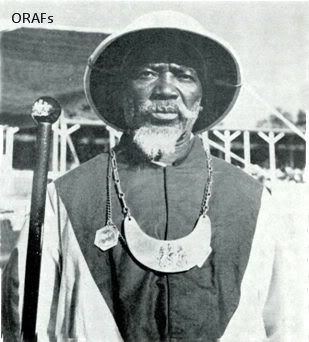

Caption
African Chief in his official regalia.
African Chief in his official regalia.
Caption
A measure of the advancement of African women is the readiness with which they take to a nursing career.
The African's reluctance to sell his cattle even when, through over-grazing, they are mere bags of bones, also has its roots in centuries-old tradition. Cattle are his wealth by tribal standards, and it is numbers, not quality, that count. Also, in the past the bride price for a new wife—the lobola system, a form of family insurance—was paid in cattle, which therefore have a special place in his life. Money is now replacing cattle for lobola purposes, but until the African is properly converted to a cash economy the old habits will die hard. Much time and infinite patience will be required before he is convinced of their folly in the Hght of modern conditions in a rapidly changing world.
At one time the traditional role of the African child in the tribal society was that of herder of the family's cattle and goats. School was considered a waste of time. But through the years this attitude has changed, and in recent years there has been a complete transformation. The average African parent today is eager to have his children educated to give them a better opportunity in life, and the demand for adequate school facilities is incessant. If all the demands were met the Government would have little money left for other services, and so the budget for African education is limited to two per cent of the Gross National Product, and in 1972 the vote amounted to $21 400 000
Until the end of 1970 the task of educating the African child was shared by the Government and the missions, which had been active in this field from the beginning of European colonisation. Until then the Government had borne the total cost of teachers' salaries, but in 1970 it decided to reduce the salary grant for primary schools from 100 to 95 per cent and use the saving to expand secondary education. The shortfall of five per cent would have to be met by the school authorities, and to this the missions objected. Most of them withdrew from the educational field. The African Councils stepped into the breach, and the change-over has been eff'ected with remarkably little fuss.
The new system has brought about a more co-operative attitude on the part of the parents, who now think of the primary schools under the control of their local Councils as "our schools". They are ready to help with the maintenance of school buildings, and they are also prepared to contribute to school funds. This is all to the good. Being directly involved in their children's education means that they appreciate it all the more, instead of taking it all for granted as they did when it cost them nothing.
The standard of teaching has also improved in recent years In the middle 1950s the Department was concerned about the number of untrained teachers employed in the primary schools, and teacher training was stepped up. In 1962 there were over 4 000 untrained teachers, representing 29 per cent of the total, but by 1971 their number had been reduced to 310, or only 1,8 per cent of the total employed.
By the end of 1971 87 African Councils had assumed responsibility for 823 primary schools and a year later 104 Councils were responsible for 938 schools. In areas where there were no Councils to take over schools relinquished by the missions, the Government took them over as "sponsored" schools, and in 1972 there were 1 226 of these. As Councils are established in these areas they will become responsible for the sponsored schools until eventually all primary schools will come under control of local government authorities.
Particular attention is being paid to secondary education for the African. In addition to the senior secondary schools which take them up to university entrance, a new category of junior secondary has been introduced in recent years with the emphasis on vocational rather than academic subjects. At all levels more and more attention is being 43aid to the teaching of Enghsh, and this is all to the good. Ready communication between white and black Rhodesians is essential for mutual understanding and racial harmony. A start has been made in the European schools on teaching the two main African languages of Shona and Ndebele, but the teaching of spoken Enghsh in the African schools holds greater promise. When black and white can converse freely and readily the scope for misunderstandings will be considerably reduced.
Caption
Clearing a maize land on an African Purchase Area farm.
Most of the tribal trust areas of today come under the jurisdiction of African Councils, and when all areas are covered there should be 250 of them. Each Council is composed of the local Chief as Chairman and his principal counsellors and is responsible for the development of the area as a whole and co-ordinating the efforts of the community boards. They have their own staffs, and here an entirely new field has opened up for the educated young African in the role of Council secretary or clerk.
Economic development in the Tribal Trust Lands is being actively promoted by the Tribal Trust Land Development Corporation, called Tilcor for short. The areas selected for attention are those that quaHfy on the score of population density, natural resources and economic potential. The Corporation's aim is not only to establish agricultural enterprises in suitable localities, such as the production of tea and cotton and other appropriate crops, but also to establish industries in TTLs close to the main European centres where good road communications permit their products to be marketed. An example of this policy is the Seki TTL near Salisbury, to which certain industrial concerns formerly located in Sahsbury's industrial sites have transferred their factories. They rely on African labour, and at Seki their workers are able to live in their tribal surroundings and yet be close to their work. Seki township is one of the "growth points" that Tilcor aims to establish in suitable areas which will form the nucleus of settled communities providing services to the tribal Africans. The provision of shops, and even supermarkets, which will make consumer goods readily available, will it is hoped induce the tribal farmer to grow crops for cash, and pressure in this direction is likely to be exerted by his women folk.
As the recognised local government bodies in the tribal areas, the African Councils are an essential part of the Government's overall pohcy of blanketing the entire country with local authorities responsible for handling their own affairs. In the European area this has been achieved by the formation of Rural Councils in the rural areas and in the cities by merging the former suburban Town Councils with the City Council to form one big administrative unit to cover the city and suburbs.
Caption
A busy scene at an African market in a Tribal Trust Land.
This policy is being applied equally to the African townships in the urban areas. The flow of Africans from the tribal areas to the towns has steadily increased through the years with the growth of commerce and industry and the lack of job opportunities in the Tribal Trust Lands. In all the urban centres the number of Africans, both employed and unemployed, greatly exceeds that of the Europeans. They live in their own townships under the overall control of the (European) Municipal Councils, but now African boards are being established within the townships to tackle some of the social problems that have been created.
When the African moves from his tribal area into a town, he leaves behind him a complex social system that gives him complete individual protection. In the tribal area he enjoys the moral and practical support of his immediate family, his extended family, his kinship group and his tribal structure. But when he moves into an urban area he is on his own. Instead of living with people who speak the same language, observe the same customs, share the same religious and spiritual beliefs, he finds himself in a largely alien society living cheek by jowl with people from many different tribes, with differing customs and social habits, often perhaps from tribes which in the blood-stained past waged war on his own and are therefore hereditary enemies. He has to live according to very different rules and in a social structure that is entirely foreign to him. He no longer has the support of the old disciplines; in the urban township he has to discipline himself if he is to stay out of trouble. The Government reahzes that what is needed is a new social order suited to the new circumstances, and that the impetus must come from the Africans themselves.
A first step to this new social order is the establishment of the urban township local authorities to undertake a hmited range of responsiblities under the watchful eye of community advisers and of the specialist staff of the parent urban authority. They have a lot to learn, especially in the field of administration, and it will be many years before they are really effective. But at least a start has been made.
As the years go by more and more Africans are breaking away from their tribal affiliations and becoming urbanised, although the great majority are still tied to their tribal hves by considerations of kinship and by a sense of insecurity in the towns. Every weekend thousands of them, whose tribal areas are within reasonable reach, swarm out of the cities by bicycle, bus and train to spend time in the bosom of their families, and with the advent of the rainy season many of them leave their jobs to return to the tribal lands to plough and plant. They are thus neither efficient urban workers nor tribal farmers, and the general economy suffers as a result. But in time, as they adapt themselves to urban conditions, the number of those with a foot in both camps is likely to decrease.
The African townships are considered African areas in terms of the Land Tenure Act, and only Africans may legally reside and conduct business in them. The African traders are thus protected from the competition of European and Asian businessmen, and this is just as well for they would stand little chance against more wily competitors. Many Africans are now substantial businessmen—especially the larger traders and the bus service operators—and the degree of their prosperity may be judged by the quality of their cars and their standard of living. At Marimba Park, to the west of Salisbury, where Africans enjoy title to their land and homes, the quality of their houses comes as a pleasant surprise, comparable to the best in the most exclusive European suburbs. These people are the vanguard of an African middle class which can be a vital factor in ensuring stability for the future, and their number is steadily growing. Many of them have advanced far beyond the average level and have become thoroughly Westernised, with social habits and Uving standards on a par with those of the better type of European.
Unfortunately the average white Rhodesian has little opportunity to come in contact with these advanced Africans. He has more to do with Africans of a lower standard who are his house servants and gardeners, and he is inclined to judge the whole race by them. But as time goes on it is likely that this will be corrected and that the average white Rhodesian will come to reahze that there are black Rhodesians who are just as entitled as he is to the rewards of initiative and enterprise and to the good life.
Race relations in Rhodesia, by and large, are pleasant and relaxed. The African of whatever social standard has an innate courtesy that calls for courtesy in return, and a sense of humour that sees the funny side of all kinds of unlikely situations. These are qualities that make for harmonious relationships, and on the whole white and black Rhodesians get on very well together.
But the African is capable of making a far greater contribution to the general prosperity of the country. He has to be encouraged to adapt himself to the needs of the 20th century, to raise himself from a primitive to a more advanced standard, to pull his weight both as a citizen and as a producer. Provided he can be induced to throw off his traditional shackles and reahze his potential as an individual, there is no limit to the influence he can exert on the future prosperity and progress of Rhodesia.
"No country can prosper with its masses living in ignorance and poverty". It is to banish ignorance and poverty and raise the African in the human scale that the policy of community development is all about.
Caption
The traditional role of the African child is that of herder of cattle and goats or. as in this case, driving donkeys with sacks of gram. Now they all want to be educated.
THE TERRORIST THREAT
For seven years now Rhodesia hat faced the continuing threat of armed subversive activity organised by the banned nationalist parlies of ZAPL' and ZANU from their headquarters at Lusaka, the capital of Zambia. The evidence of Communist support is overwhelming. The weapons captured from the terrorist gangs are invariably of Russian or Chinese manufacture, and the majority of terrorists have been trained in Russia. China. Algeria. Cuba. Bulgaria or North Korea.
This is no desperate campaign by oppressed people to throw off the shackles of repression; it is naked terrorism designed to intimidate the African population into supporting the overthrow of orderly government to facilitate a Communist take-over of a prosperous and highly developed country.
Africa south of the Zambezi is highly mineralized, with unlimited potential, and it contributes significantly to the prosperity of the Western world. It also controls the sea route round the Cape. If it ever falls into Communist hands the whole security and wcllbcing of Western civilization would be gravely threatened. The threat to Rhodesia is the spearhead of the attack, and in resisting and containing it Rhodesia is safeguarding not only her own security but that of the Western world as well. And yet there are British politicians who persist in referring to the terrorists as "freedom fighters", as though they were engaged in a nobk crusade instead of a terrorist campaign designed to cause chaos and disruption as part of Communism's global strategy .
The opening shots in this campaign were fired in April. 1966, when a gang of banned ZANU party members infiltrated into the Sinoia area north of Salisbury; seven of them were killed by the security forces and others captured. The following month a farmer and his wife were brutally murdered on their lonely farm some 20 miles from Hartley, and it was clear that the outrage had been committed by members of the Sinoia gang who had cscapcd from the earlier encounter. There were further infiltrations in July. August and September of 1966 and again during the months of May, June,July, August and Decembcr of 1967. At first the gangs were small and each one was systematically liquidated. The beginning of August, 1967. however, saw a new development in the campaign when a large force of both Rhodesian and South African National Congress saboteurs crosscd the Zambezi into Rhodesia between the Victoria Falls and Kazangula to the west. The purpose of the South African nationalists was to penetrate through Rhodesia and Botswana into the Republic of South Africa, but their foray was short lived. All were killed or captured at the cost of eight members of the security forces killed and 15 wounded.
A more ambitious invasion occurred in March, 1968, when a considerable body of insurgents crosscd the Zambezi from Zambia at the confluence of the Chewore and Zambezi rivers in Northern Mashonaland, again with members of the banned ZAPU party (a predominantly Ndebele organisation) combining with the South African dissidents. Most of them had been trained in Cuba and Algeria and they posed a more serious military threat than any previous group.
The area they had chosen for their operation is wild, desolate country (like most of the Zambezi Valley), with relatively few human inhabitants but heavily populated by wild animals such as elephant, buffalo and rhino. They managed to penetrate some distance through the Valley towards the escarpment, establishing a series of staging camps along the way. But before they could reach the prosperous farming regions on the uplands they were detected. A series of engagements resulted in 58 terrorists (41 ZAPU and 17 S. A. National Congress) being killed and a large number captured. The force as a whole suffered a total of 111 casualties.
Further efforts were made in July and August that same year to justify President Kaunda's claim that there was "turmoil" in Rhodesia, and they ranged from extreme east to extreme west of the 600-mile river border with Zambia. The biggest threat was posed by three groups of ZAPU and one of ZANU (the mainly Shona nationalist party) who crosscd the Zambezi at four points. The ZANU group of 14 members infiltrated into Rhodesia in the vicinity of Mapata Island and was soon spotted. Within 48 hours all had been killed or captured. The ZANU contingent of 91 men was divided into three parties who crossed at widely separated points- at the confluence of the Zambezi and Gwaai rivers in Matabeland in the area of Kariba in Northern Mashonaland and at the confluence of the Zambezi and Makuku river further east.
They were all soon accounted for, and of the 91 only eight escaped the security net, 42 being killed and 41 captured.
Their efforts had been both futile arid expensive and the nationalists withdrew ;o lick their wounds. Apart from a small Incursion in the region of Kazangula in the extreme west, which also was short-lived, they left Rhodesia alone for the next two years.
If their intention was to lull the Rhodcsian security forces into fatal complacency they failed. Vigilance was maintained, but it was impossible to patrol every square metre of the inhospitable country th.il separate* the Zambezi river from the settled farming areas. On August 30. 1972. came the first hint that the terrorists were becoming active again when a motorist, with his wife and children, was blown up by a land mine near Mana Pools, a popular wild life tourist area in the Zambezi Valley. They were all injured but fortunately escaped with their lives. Near the scene a handwritten note was found saying that ZAPU was responsible. Seven weeks later an Army vehicle Struck a mine in the Chete Game Reserve and the driver was killed. Tracks in the vicinity showed that those responsible had Crossed from Zambia and the next day ZAPU again admitted their culpability. Land mines also caused casualties in the Victoria Falls-Kazangula area. But worse was to come.
On December 22-- three days before Christmas—Rhodesians were horrified to learn of a cowardly attack by terrorists on a farm house in the Centenary area north of Salisbury on the edge of the Zambezi escarpment. Soon after midnight they sprayed the house with bullets from automatic weapons and wounded the eight-year-old daughter of the farmer as she lay asleep.
That same nigt they raided an African store nearby, helped themselves to food, clothing and cigarettes and set the store alight. On a road in the vicinity security forces later unearthed a land mine.
That same nigt they raided an African store nearby, helped themselves to food, clothing and cigarettes and set the store alight. On a road in the vicinity security forces later unearthed a land mine.
The terrorists struck again two nights later when they attacked a neighbouring farm house in which the farmer and his family who had been the victims of the first attack were staying with friends. They used rockets and this time the farmer and a noine year old daughter were injured. Near the same farm four soldiers were wounded. one fatally, in a land mine explosion.
By this time the security forces were combing the rugged country in which these farms lie and they killed and captured a number of terrorists. For a month, as the security forces harassed the infiltrators, all was quiet and life in the area had almost returned to normal when another Centenary farm was attacked late at night and the farmer was wounded and his wife killed. This was followed about a week later by a hand- grenade attack on still another farm in the region in which a visitor from Britain was killed while watching television. He was alone on his son's farm at the time, and his son returned that same night from a visit to Salisbury to find his father dead.
It was announced two days later that almost all the terror¬ists involved in the attack on the first farm had been wiped out.
It became obvious that they were active over a wide area, particularly in the planting of land mines, which claimed still more victims, including two South African policemen. In the vicinity of Mount Darwin, to the east of Centenary and on the edge of the escarpment, two Rhodesian land inspectors were murdered by a group of terrorists and a third land inspector, who was with them at the time, was taken prisoner.
The Rhodesian forces are contending with three separate organisations—ZANU, operating in the north-eastern border area; ZAPU, engaged in cowardly hit-and-run tactics from safe bases in Zambia, and FROLIZI, a group of dis¬sidents from both the banned parties, operating into the north-east of Rhodesia by way of Mozambique, which forms the border in that area. They have been using the organisation of the Frelimo terrorists operating against the Portuguese whose main target is the giant Caborra Bassa dam, taking advantage of their lines of communication and their supply system. These latest attacks, therefore, have come from an entirely new direction.
But how had the Frolizi terrorists managed to penetrate across the desolate country between the border and the Centenary hills without their presence being reported by the local African population ? Up to now, in all the areas in which infiltration had taken place, the local Africans had readily co-operated with the security forces by reporting the presence of strangers in their midst, and this had led to their swift detection and elimination before they were able to do any serious damage. But the Africans in this remote north-eastern corner of the country had obviously co-operated with the terrorists for six or seven months before the attacks were made—acting as porters of their equipment and supplies, giving them food and shelter, enabling them to get organised generally.
It was found that the invaders had managed to suborn some of the local witchdoctors, the spirit mediums in whom the Shona people have such a profound belief. It would be unthinkable for them to gainsay the utterances of the mediums and it is evident that the ordinary people were influenced in this way to give at least their tacit support to the terrorists. So the terrorists, over a considerable period, had been able to organise themselves for infiltration further towards the European farming areas and to launch their indiscriminate attacks on isolated farm houses.
The Government took stern action. A number of mediums suspected of aiding the terrorists were arrested and other steps taken to tighten up security in the area, such as the establishment of a district commissioner's station to maintain closer contact with the people, and by the imposition of collective fines on the community as a whole.
Since Zambia had openly harboured the terrorists and given them facilities for launching their raids on Rhodesian territory—in spite of repeated warnings that retaliatory action would be taken if they continued—the Rhodesian Govern¬ment closed its border posts at Victoria Falls, Kariba and Chirundu on January 9, 1973, and thus prevented traffic from South Africa and the port of Beira from reaching Zambia. Prime Minister Ian Smith told President Kaunda that the border would be reopened only when he had received an assurance that he (Kaunda) would clamp down on the terrorists operating from his soil. A month later, on February 8, Mr. Smith announced that in a formal message the Zambian Government had agreed to do all it could to prevent terror¬ist incursions into Rhodesia from Zambia, and the Rhodesian border posts were reopened. But Zambia immediately retaliated by closing her border posts to traffic through Rhodesia and redoubled her efforts to develop alternative routes to the sea through neighbouring countries under African rule.
On March 30, 1973, the terrorists once more attacked a farm, this time in the Wedza area, shot and killed the farmer in the vicinity of his farm compound, and later attacked a store 10 km from the farm. At the same time two coloured men said to be linked with a terrorist group which had moved into the central area of Rhodesia, were arrested near Salisbury and found in possesion of Communist-made grenades, pistols, ammunition and explosives.
On April 3 a member of the Security Forces was killed and another seriously wounded in anti-terrorist operations. Both men were farmers in the Umvukwes-Centenary area, and members of the Police Reserve.
Relations between the two countries, Rhodesia and Zambia, could hardly be at a lower ebb, and the Zambezi, instead of being a link, is now a more formidable barrier than it ever was. And it is obvious that the terrorist threat will be with us for some time yet. But whatever tactics they adopt thay have not the slightest chance of success against the determination of Rhodesians of all races to preserve their country and their
All through their brief 83 years of history since the arrival of the Pioneer Column and the establishment of European colonisation, Rhodesians have battled through periods of adversity and emerged stronger than ever after each experience. They have survived wars and rebellions, droughts and floods, recessions and depressions. But perhaps the greatest challenge they have yet been called upon to face has been the imposition of sanctions by Britain and a disap¬proving world after the unilateral declaration of independence in 1965. They have met the challenge with their customary determination, ingenuity, initiative and enterprise, and today the national economy is stronger than it has ever been. So is the national character.
Caption
Cattle grazing near the banks of a dam in the Eastern Districts.
A FLOURISHING ECONOMY
While sanctions have had an adverse effect on certain aspects of the economy, in other ways they have been bene¬ficial and on the whole have, ironically, produced more advantages than disadvantages. They have, for instance, entirely altered the pattern of Rhodesia's trade. Before UDI our best customer was Britain. Most of our primary products, especially tobacco, were exported to the British market, and British goods were imported on a large scale. Rhodesian manufacturers relied heavily on British components for the finished article, and the products of British factories filled the shops. When Mr. Harold Wilson imposed sanctions in the wildly optimistic belief that they would bring the Rho¬desian economy to its knees in a matter of "weeks rather than months", Rhodesia was cut off from her traditional sources of supply. But instead of meekly holding up their hands in surrender (something totally foreign to the Rhodesian charac¬ter), the industrial and commercial community rapidly ad¬justed themselves to the new situation.
First of all they found foreign suppliers who, despite the pious utterances of their Governments, were only too willing to fill the vacuum left by the British withdrawal. And they were pleasantly surprised to find that the foreign components were often of better quality than their British equivalents, were usually cheaper and were delivered with a scrupulous regard for dates. As time went on they found ways and means of producing many of the articles themselves, of equal and sometimes even better quality, with the result that the country's secondary industries have developed beyond recognition. And many of their products are being exported. In 1965 the contribution of manufacturing industry to the Gross Domestic Product was $136 millions; in 1971 it was $252 millions.
A somewhat similar story can be told about agriculture. Tobacco was the principal product and Rhodesian hue-cured Virginia had a world reputation for quality. It was in such great demand in Britain that before UDI some 40 per cent of the crop was exported to British manufacturers, and the types of leaf grown were geared to their requirements. The industry was highly organised and the three auction floors in Salisbury were a model of efficient organisation and a prime tourist attraction when the sales were on, with the auctioneers chanting their incomprehensible jargon. In 1965 tobacco accounted for almost half of the country's agricultural production and was worth $66 million. When sanctions were imposed sales to Britain came to a halt, to the consternation of both the British manufacturers and the Rhodesian growers. Tobacco was the one product British sanctions could really hit, and for a time it seemed that the industry faced disaster.
But only for a time. The Government took immediate steps to counter sanctions by setting up the Tobacco Corporation to sell our tobacco to whatever markets were available. And sell it they did, though the types grown for the British palate were not always suitable to foreign consumers.
What was not sold was stockpiled and the Government has spent millions of dollars in compensating growers for the lower prices obtained and in keeping the industry alive. A quota system was introduced to regulate production. Many growers, usually the less efficient who concentrated on tobacco only, found their rewards inadequate and dropped out of the industry. The remainder reduced their tobacco acreages and reorganised their methods of production to cope with the lower returns. And they diversified into other aspects of agriculture, directed mainly to the production of foodstuffs and raw materials that had previously been imported. The result was an expansion in the production of wheat and fibres. Rhodesia had hitherto relied on Australia for her wheat requirements, but a vigorous policy of wheat production in the Lowveld has enabled Rho¬desia to become self-sufficient in this essential commodity. The tobacco growers also diversified into livestock (cattle, pigs and sheep) and such crops as maize, cotton, soya beans and sorghums. By broadening the base of their operations instead of relying on only one crop for their incomes, the Rhodesian tobacco grower has become a real farmer.
What was not sold was stockpiled and the Government has spent millions of dollars in compensating growers for the lower prices obtained and in keeping the industry alive. A quota system was introduced to regulate production. Many growers, usually the less efficient who concentrated on tobacco only, found their rewards inadequate and dropped out of the industry. The remainder reduced their tobacco acreages and reorganised their methods of production to cope with the lower returns. And they diversified into other aspects of agriculture, directed mainly to the production of foodstuffs and raw materials that had previously been imported. The result was an expansion in the production of wheat and fibres. Rhodesia had hitherto relied on Australia for her wheat requirements, but a vigorous policy of wheat production in the Lowveld has enabled Rho¬desia to become self-sufficient in this essential commodity. The tobacco growers also diversified into livestock (cattle, pigs and sheep) and such crops as maize, cotton, soya beans and sorghums. By broadening the base of their operations instead of relying on only one crop for their incomes, the Rhodesian tobacco grower has become a real farmer.
The growing policy has also been adjusted to meet the needs of the times. The research scientists have concentrated on the development of leaf with a low nicotine content, and on types suitable for a variety of markets. Never again will production be geared to the requirements of a particular market, never again will the tobacco industry be allowed to become vulnerable to the vagaries of hostile politicians. Sanctions have taught the country a bitter lesson, but the experience has had its value. The industry today is soundly based, poised to take full advantage of the opportunities that will arise when trading conditions return to normal.
But sanctions have not been the only adverse factor with which the agricultural industry has had to con¬tend. Nature has also taken a hand. Since 1963 thecountry has been beset by droughts. There were serious droughts in 1963-64 and again in 1967-68, and in other years the seasonal rainfall has been unsatisfactory, with the exception of 1971-72 when for the first time for many years the rains were abundant and suited to the agricultual timetable. But 1972-73 has seen the return of near-drought conditions and things are likely to be difficult in some parts of the country towards the end of the coming dry season.
The Rhodesian farmer is facing other difficulties, notably increases in input costs which have reduced his profitability, a problem to which urgent attention is now being given. But in spite of all these setbacks— sanctions, droughts and costs—the value of agricultural production is being maintained. The farmer has survived crises in the past, and he will undoubtedly overcome the problems that face him today.
The mainstay of the Rhodesian economy is unquestionably the mining industry. It was gold that attracted European attention to this part of Africa in the first place, and although hopes of a second Witwatersrand were never realised, gold nevertheless contributed largely to the economic stability of the country in the early years of development. Such minerals as asbestos, chrome and coal also played their part, but it is only in the last 20 years that the base mineral industry has really come into its own. Vigorous prospecting has led to the discovery of many more minerals of great economic potential—tin, copper, nickel, iron ore, phosphate rock and the lithium minerals, to name only a few—which have given the mining industry a broad base and have enabled it to weatherthe onslaught of international currency problems, depressed markets, fluctuating prices and sanctions.
Caption
The fourteen storey Pioneer House on the corner of 8th Avenue and Abercorn Street, Bulawayo.
(Photograph by Bulawayo and District Publicity Association),
Caption
Jameson Avenue, Salisbury, with the Reserve Bank of Rhodesia
Some idea of the expansion of the industry and its value to the national economy can be gained from the value of manufacture of stainless steel, has an insatiable market. The vast coalfield at Wankie, with reserves estimated in millions of tons of high quality coking coal, is not only vital to the development of industry in Rhodesia but is also a major export factor. It is only one of 14 known coalfields in the country, so that the supply is practically inexhaustible. Wankie has successfully withstood all the slings and arrows of outrageous fortune. When the Kariba hydro-electric scheme was built and most of the thermal power stations were put into mothballs, it seemed that the demand for Wankie coal must diminish. But so great has been the rise in demand for electric power that the thermal stations are now back in production and there are plans to establish a huge thermal power station on the coalfield itself. The production of oil from coal also holds out great possibilities, and world demand for good coking coal is increasing all the time. There seems to be no limit to the demand for Wankie coal, and as soon as one market closes others open.production in 1965 as compared with that of 1972. In 1965 it amounted to £31 974114 (R$63 948 228) and in 1972 it was $108 037 086. This was the value at the mine. Some 10 to 15 per cent of the production was sold locally for use in the country, the balance of some 85 per cent was exported. The gross value of 1972's mineral output was $129 400000. The world needs Rhodesia's minerals, and in spite of sanctions it is only too ready to buy them.
Caption
Bank notes on the press in the printing works of the Reserve Bank
Bank notes on the press in the printing works of the Reserve Bank
Because of its superior quality, Rhodesian asbestos is in constant demand as a spinning fibre in the manufacturing of heat-resistant clothing and in the automobile industry. The high quality of Rhodesian metallurgical chrome is fully appreciated by the major consuming countries, and Rhodesia has the largest resources of this important mineral in the world. The production of ferro-chrome, essential to the manufacture of stainless steel, has an insatiable market. The vast coalfield at Wankie, with reserves estimated in millions of tons of high quality coking coal, is not only vital to the development of industry in Rhodesia but is also a major export factor. It is only one of 14 known coalfields in the country, so that the supply is practically inexhaustible. Wankie has successfully withstood all the slings and arrows of outrageous fortune. When the Kariba hydro-electric scheme was built and most of the thermal power stations were put into mothballs, it seemed that the demand for Wankie coal must diminish. But so great has been the rise in demand for electric power that the thermal stations are now back in production and there are plans to establish a huge thermal power station on the coal¬field itself. The production of oil from coal also holds out great possibilities, and world demand for good coking coal is increasing all the time. There seems to be no limit to the demand for Wankie coal, and as soon as one market closes others open.
Caption
The City Hall of Rhodesia's second largest city, Bulawayo.
The City Hall of Rhodesia's second largest city, Bulawayo.
Caption
Spraying against harvester termites at the Mkwasine wheat scheme in the Lowveld.
The production of copper is a comparatively recent development, dating from the early 1950's when the Messina (Transvaal) Development Company established mines to exploit the copper deposits in the Sinoia area to the north of Salisbury, and in 1960 built its own smelter to process the concentrates.
In 1963 the value of its production was just over $6 million, and two years later, in 1965, it had doubled. Subsequent figures are not available, but it is known that in recent years the rate of production, and consequently its value, have greatly increased.
Exciting prospects for the future are the exploitation of vast deposits of nickel and platinum, and the discovery of new mineral resources through modern scientific prospecting methods. There seems to be no end to the wealth that lies beneath Rhodesia's soil. And with active Government encouragement and support—through the promotion of a healthy investment climate, favourable taxation measures and the provision of various forms of assistance including free technical and professional services - there seems to be no limit to the contribution that the mining industry can make to the expansion and stability of the Rhodesian economy. A more visible sign of the country's economic health, so far as the man in the street is concerned, is the hectic building activity going on all around him. It is not confined to the main centres of population; in the smaller centres, too, the man with the trowel is giving expression to the faith in the country's future. The building industry is an unfailing barometer. After the failure of the Federation, when confidence in the country reached its lowest ebb, when houses, flats, shops and offices stood empty, when properties could be picked up for a song, building workers left Rhodesia in droves to seek employment elsewhere.
The typographical error is a slippery thing and sly,
The stagnation continued for several years, but when after UDI it was seen that the prophets of doom had been proved wrong confidence began to return and it has steadily grown stronger as the strength and resilience of the Rhodesian economy became increasingly evident. Today that confidence is a strong tide. In every suburb of every city and town more and more residential accommodation is being built to meet the demand created by the steady flow of immigrants. More factories are going up in every industrial area and impressive office blocks and shopping complexes are altering the face of the cities. The immigration figures are significant. In 1962 the European population stood at 222 000. With the ending of Federation in the following year it dropped to 215 000 and in 1964 to 209 000. In 1965, the year of UDI, it climbed back to 213 000 and since then has shown a steady increase every year, until in 1971 there were 255 000 Europeans in the country, the majority of them (113 000) living in Salisbury and 55 000 in Bulawayo. The net migration figures are also interesting. In 1962, '63 and '64 there was a total net loss of more than 21 000 Europeans, a net gain of 3 460 in 1S65, another loss of 2 000 in 1966,and from 1967 onwards a considerable net gain each year, with the highest gain of all, 9 400, being registered in 1971.
They have not all come from countries to the north of us through disillusionment with African rule, large numbers have come from countries overseas.
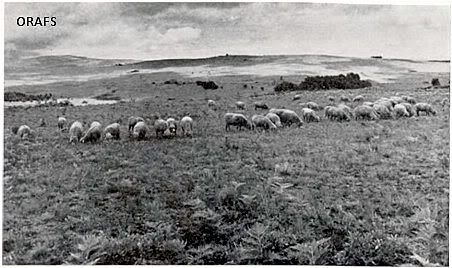
Caption
Sheep in the mist belt of the Inyanga Downs,6 600 feet above sea level.
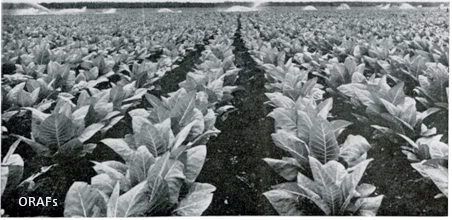
Caption
Field of Burley tobacco under irrigation
At the same time the African population, which is not so vulnerable to economic and political pressures from outside, has increased from 3 920 000 in 1962 to 5 310 000 in 1971. With a net natural increase of 36 per 1000 of population per year (as against 11 per 1 000 for Europeans) the rapid increase in the African population is understandable, and it is one of our biggest headaches. The Asian and Coloured populations have also increased through the years, largely through natural increase, and in 1971 stood at 9 400 Asians and 17 200 Coloured. The country's total population at the end of 1971 was 5 590 000.
The employment figures are another indication of the expansion of the Rhodesian economy over the last ten years. To take Europeans, Asians and Coloured first, in 1962 there were 88 600 in employment, with total earnings of $210 400 000. In 1965 the number in employment had risen slightly to 89 800, with earnings of $231 200 000. From then on the figures increased steadily until in 1971 the number in employment stood at 108 120, with total earnings of 000 $364 800 000. Statistics for African employment and earnings show that in 1962 there were 646000 Africans in employment with total earnings of $135 400 1971 778 700 in employment who earned $244200000. During the 10-year period the per capita annual real earnings of Africans had risen by 22 per cent, as against 15 per cent for the European section. While the African figure was considered satisfactory, the improvement was not general and in fact had been negligible in the agricultural sector. The Economic Survey for 1972 summarised another major problem facing Rhodesia.

Caption
Sheep in the mist belt of the Inyanga Downs,6 600 feet above sea level.

Caption
Field of Burley tobacco under irrigation
At the same time the African population, which is not so vulnerable to economic and political pressures from outside, has increased from 3 920 000 in 1962 to 5 310 000 in 1971. With a net natural increase of 36 per 1000 of population per year (as against 11 per 1 000 for Europeans) the rapid increase in the African population is understandable, and it is one of our biggest headaches. The Asian and Coloured populations have also increased through the years, largely through natural increase, and in 1971 stood at 9 400 Asians and 17 200 Coloured. The country's total population at the end of 1971 was 5 590 000.
The employment figures are another indication of the expansion of the Rhodesian economy over the last ten years. To take Europeans, Asians and Coloured first, in 1962 there were 88 600 in employment, with total earnings of $210 400 000. In 1965 the number in employment had risen slightly to 89 800, with earnings of $231 200 000. From then on the figures increased steadily until in 1971 the number in employment stood at 108 120, with total earnings of 000 $364 800 000. Statistics for African employment and earnings show that in 1962 there were 646000 Africans in employment with total earnings of $135 400 1971 778 700 in employment who earned $244200000. During the 10-year period the per capita annual real earnings of Africans had risen by 22 per cent, as against 15 per cent for the European section. While the African figure was considered satisfactory, the improvement was not general and in fact had been negligible in the agricultural sector. The Economic Survey for 1972 summarised another major problem facing Rhodesia.
Caption
Tapping an open hearth furnace at the Rhodesian Iron and Steel Company at Redcliff, Que Que.
Caption
Passenger train, hauled by a type 4 diesel-electric locomotive,leaving Salisbury.
The position of agriculture is a reflection of the world-wide farming problem of diminishing profitability brought about by relatively static prices for produce and rapidly rising costs. The problem has particular significance for Rhodesia since the agricultural sector is by far the largest employer of African labour. In 1971 nearly one-third of the additional 35 000 Africans in employment were engaged in agriculture. Despite this increase, there are signs that labour shortages on farms are reaching serious dimensions. Unless conditions of employment can be improved, the shortages are likely to become more acute and the more general problem of providing acceptable employment opportunities for the increasing number of African work seekers will be exacerbated". The statement concluded that since most of Rhodesia's agricultural output has to be exported and is therefore governed by world market prices, the prospects of improvement are not "altogether favourable".
Caption
A field geologist and his assistant engaged in the task of recording the
rock patterns for geological survey
rock patterns for geological survey
The general effectiveness of sanctions is reflected in Rhodesia's economic performance in 1972. The visible trade balance showed a surplus of $68 million, far exceeding any previous year, and the total export earnings soared to $345 million, or the highest ever, and $22 million above the figure for 1965.
One industry that is a sure money- spinner without depleting any of our natural resources is tourism. Just as Rhodesia has limitless wealth beneath her soil, so also has she some priceless assets on the surface. The incomparable grandeur of the Victoria Falls, with the mighty Zambezi plunging over the lip of a chasm over a mile wide; the vast reaches of Lake Kariba, where visitors may watch wild animals drinking at the lake shore and also enjoy some of the finest tiger fishing in the world; the wild bush country of the Wankie National Park where the law of the jungle prevails over that of man and the interests of the game are paramount, one of the greatest game reserves in Africa; the brooding mystery of the Zimbabwe Ruins, whose origin is still a matter of debate; the fantastic rock formations of the Matopo Hills near Bulawayo, the source of legends reaching far back into Rhodesian history and the resting place of Cecil Rhodes and other Rhodesians who have deserved well of their country; the mountains and downs and waterfalls and trout streams of the Eastern Highlands, with the lovely city of Umtali as their centre. All these and more are a magnet to visitors from all over the world, and their number increases every year.
Caption
Mangula Copper Mine: Aerofoil Grinding Mill handling 2 000 tons of ore in 24 hours.
Caption
Cecil Square, Salisbury, with the East Wing of Meikle's Hotel in the background.
And the more people from other countries come to see these scenic pearls the better. For in addition to these natural attractions they cannot fail to be impressed by the friendliness and hospitality of the white Rhodesian, the courtesy and helpfulness of the black Rhodesian, the cordial relationship that exists between the two races, the relaxed atmosphere free of the tensions that characterise other countries in Africa. And above all, the incomparable climate of the Rhodesian Plateau, with its abundant sunshine and tolerable warmth when Europe is freezing, and its crisp dry winters.
Visitors from Britain and other English-speaking countries must be impressed, too, by the Britishness of Rhodesia. Most white Rhodesians are either of British birth or of British descent, whether born in Rhodesia or in South Africa or elsewhere. Accents reminiscent of all parts of the British Isles can be heard on all sides— especially on the bowling greens, where Scotsmen seem to predomin¬ate. And most Rhodesian families, no matter how deep their roots go in Africa, have close associations with Britain, either through their im¬mediate family or through their ancestry. They are all proud to be Rhodesians, of course, and their first loyalty is to the land they live in, but deep down they are proud, also, of their British origins and have a sense of loyalty to what used to be called the Mother Country, as has been demonstrated in three wars in South Africa and Europe.
This loyalty has been under severe strain in recent years, as from time to time it has seemed that the British, and especially British officialdom, has taken a delight in applying the sanctions screw with malicious de¬light. And the tendency of British politicians to side with our enemies has added to the bitterness. But the average Rhodesian is prepared to see things in perspective and to acknow¬ledge that he has no quarrel with the ordinary people of Britain, and, indeed, that among them he has many friends.
The point is that he has inherited the British ideals of justice and fair play and that he applies them in his dealings with his fellow Rhodesians of other races. His record speaks for itself, and he resents the implication in much of the criticism emanating from Britain that he has discarded these ideals and assumed the characteristics of a tyrannical monster. In fact, he deserves credit for having remained loyal to them.
Caption
A coffee estate in the Eastern Districts
From many points of view Rhodesia is a favoured land. Of course she has her problems, the more urgent of which have been outlined in this survey. But life would be pretty dull if all was perfect, if there was no challenge, if there were no threats to our heritage. And the Rhodesian heritage, built up through the years by facing and overcoming adversity in many forms, is worth preserving.
Caption
Green leaf collection for transit to the estate factory at Ratelshoek estate of the Rhodesia Tea Estates Limited in the Eastern District.
(Photograph by Windsor Studios).
Rhodesia has come a long way since Responsible Govern¬ment was granted us fifty years ago. The Rhodesia of today bears little resemblence to the poorly developed little back¬water that Sir Charles Coghlan inherited from the British South Africa Company. Its progress and development into one of the most stable countries on the African Continent, with a place in the sun for all its inhabitants, is a tribute to its people, white, black and brown, all of whom regard Rhodesia as their home. Given goodwill and understanding on the part of the outside world, with no interference in her domestic affairs, with the people of Rhodesia free to work out their own destiny, there is no limit to the heights she can attain in the future.
Caption
Jameson Avenue, Salisbury, with Charter House, headquarters of the Anglo American Corporation, and on the left and banking, insurance and trust company buildings on the right.
TYPESLIP
The typographical error is a slippery thing and sly,
You can hunt till you are dizzy, but somehow, 'twill get by.
Till the formes are off the presses it is strange how still it keeps;
It shrinks down in a corner and it never stirs or peeps,
The typographical error, too small for human eyes,
Till the ink is on the paper, when it swells to mountain size.
The boss he stares with horror, then he grabs his hair and groans;
The copy reader drops his head upon his hands and moans—
The remainder of the issue may be clean as clean can be.
But that typographical error is the only thing you see!
YOU CANNOT PLAN WITHOUT A MAP
THE SCIENCE OF PHOTOGRAMMETR Y SPEEDS RHODESIA'S DEVELOPMENT
Caption
A de Haviland Dove fully modified and equipped for aerial photography.
You Cannot Plan Without A Map"—with costs of all development services rising and continuing to rise, this statement has become all the more significant. As a general rule it may be claimed that the more complete a reconnaissance the greater will be the ultimate saving in overall development costs. Many skills go to making a reconnaissance of a project complete, but in almost any development project a basic plan or map is required. It may be claimed today that the best and quickest way of obtaining reliable mapping is by the use of aerial photography. The science of photogrammetry has produced truly remarkable results over the past thirty years and the accuracies obtainable with modern cameras and plotting equipment are quite outstanding.
Aerial photography alone can and does provide a wealth of information to the trained photo-interpreter. Rhodesia stands unique in its Government's decision to have the whole country photographed every five years. From this photography, which can be purchased at 55 cents per print by members of the public, all kinds of uses may be found. A single print measuring 23 cms. x 23 cms. covers an area of about 6 km x 6 km. Enlargements of these prints yield a great deal of information to a variety of users. Conservation officers study a farm's planning on photography—roadway reconnaissance is made easier—soil types are clearly discernable—dam sites are selected—sensible subdivision is planned—geological information is often offered—vegetation types and density are studied. Viewing the contact prints pair by pair under a simple stereoscope makes it possible to study gradients and general contour forms.
The arrival of colour photography in Rhodesia has facilitated the classification of road making materials. Thousands of dollars are now being saved by the very thorough examination of colour prints, and the planning of roads with their construction materials is now far more economical than in the past.
Aerial photography alone, therefore, provides a part answer to many development projects. It also forms the basis upon which accurate mapping of detail and the provision of contours is built. At about the beginning of the century, it was known that, if two photographs were taken of the same object from two different positions, then if these two photographs were viewed together or fused, a three dimensional model of the common area photographed was obtained. Progress since the first stereoplotter was constructed until recent times has been remarkable. The modern stereoplotter, costing tens of thousands of dollars, can transfer a pair of aerial photographs into a very accurately drawn line map showing all detail and contours in a matter of hours rather than months taken in the past by outdated field survey methods.
Lest it be thought that photogrammetry has displaced the field surveyor it must be explained that accurate survey of certain control points is still necessary. Having provided this control, however, the field surveyor is now free to undertake other work.
There is hardly a section of our growing country which has not benefited from the facilities offered by aerial survey. The principal advantages offered are speed, accuracy, completeness, and cheapness enabling a preliminary survey of any project to be undertaken ahead of the detailed planning.
The first stage of all aerial mapping projects is obviously the acquisition of high-class photography. This task calls for the highest degree of skill in navigation and for team work, especially at high altitudes. The strips of overlapping photographs must be straight and no gaps left in the area to be mapped. It is important that the aircraft be maintained in a level position whilst conditions of humidity and temperature must be controlled to within narrow limits. Film itself is usually 24 cms wide and up to 100 metres long. The modern camera is a marvel of precision optical, electrical and mechanical engineering and costs in the region of $30 000. With the very expensive aerial photographic set-up of high performance aeroplane, skilled crew and cameras, there is no room for error. Operating altitudes vary from 1 000 feet to 15 000 feet above ground level which may mean sorties on Rhodesia's national photography flown at 18 500 feet above sea level at sub zero temperatures for up to six hour periods in clear, cloud-free weather. Processing of the exposed film is undertaken with extreme care so as not to upset in any way the emulsion coating.
Caption
R$60 000 worth of stereoplotting equipment.
The flying height of the photographic aeroplane will determine the scale of the photography and in general the lower the flight level the greater the accuracy with which the all important contouring can be achieved. A skilled stereo- plotter operator can, by using photography taken from a height of 3 500 feet above ground level, depict accurate contours at one-metre intervals on the map sheets. Spot heights can be read with even greater accuracy. Over large development areas the provision of contours, using now outdated tacheometric methods, took field teams many months to provide whereas modern aerial survey methods take a mere fraction of the time.
The task of the field surveyor is now to provide a framework of fixed points and heights on which the natural and artificial details and contours may be plotted. Great accuracy is required in this vital stage of the work. Advances in recent years in the construction of electronic distance measuring apparatus has eased the field surveyor's task. Nevertheless in remote areas the ground control survey may still be very arduous, lonely and unrewarding. Despite tremendous advances in technology it seems certain that the ground survey will never be entirely displaced and that an aerial survey organisation will count its field survey section as amongst its most important.
Once the field surveyor has provided the required control the ultimate stage, that of plotting the detail and contours, is undertaken on very precise photogrammetric equipment. In effect this equipment converts the common overlap of two consecutive photographs into a three dimensional model. A reference mark may then be made to traverse the model by the operator and in so doing, a tracing pencil is following the reference mark on a separate table where the map is compiled. It may be easily seen that a complete map of the model is possible. The birds-eye view which the operator enjoys allows a comprehensive and complete map to be compiled. No field survey of any large area could be as complete in the time taken by aerial mapping.
Caption
A modern aerial survey camera.
Over recent years, it has been fully realised that the use of aerial surveying has contributed in no small measure to the progress of developing Rhodesia. To this extent the Rhodesian Government granted special permission to a Rhodesian air survey company to import the very latest stereoplotting equipment to augment its already sophisticated service. Despite setbacks, development of the country continues at a remarkable rate and wherever development is taking place, whether it is the design of a small traffic intersection or a large scale national project, the science of photogrammetry or mapping from aerial photography is playing its useful part. With justification it may certainly be claimed that "You cannot plan without a map".
Southern Rhodesian Government launches drive to stamp out intimidation in African townships.
CHRONOLOGICAL TABLE
1923
September 12. Southern Rhodesia annexed to Great Britain. October .Responsible Government established.
1924
First elections to Legislative Assembly. Sir Charles Coghlan becomes first Prime Minister.
1927
Death of Sir Charles Coghlan who is succeeded by the Hon. H. U. Moffat, a grandson of the famous missionary, Dr. Robert Moffat.
1929
Beit Bridge over the Limpopo River is opened.
Beit Bridge over the Limpopo River is opened.
1933
Government purchases the mineral rights of Southern Rhodesia from the British South Africa Company for £2000 000.
July.: The Hon. H. U. Moffat resigns Premiership and is succeeded by the Hon. George Mitchell.
September 11.: General Election. The Hon. G. M. Huggins becomes Prime Minister.
1934
Split in the Reform Party. A General Election is held and the United Party is returned with large majority. Hon. G. M. Huggins, Prime Minister.
1935
Rhodesia House, 429 Strand, London, is opened. Trade agreement with South Africa comes into force. Salisbury becomes a city.
First State Lottery is held.
Birchenough Bridge across the Sabi River is opened.
1937
Royal Commission under Lord Bledisloe considers question of closer association between the Rhodesias and Nyasaland.
1938
April. Plumtree railway disaster.
1939
April 14. General Election. The United Party is returned with Hon. G. M. Huggins as Prime Minister.
May 24. Otto Beit Bridge over the Zambezi River at Chirundu is opened.
September 3. Outbreak of World War II.
1940
May 24. First Empire Training School for the Royal Air Force is opened at Salisbury.
Army Camps were established in Salisbury, Bulawayo and Umtali for initial and advanced training. During the 1939-1954 War, Southern Rhodesia contributed, on a pro rata population basis, more fighting men than any other Commonwealth country.
Army Camps were established in Salisbury, Bulawayo and Umtali for initial and advanced training. During the 1939-1954 War, Southern Rhodesia contributed, on a pro rata population basis, more fighting men than any other Commonwealth country.
1942
Southern Rhodesia Military Forces come under Union of South Africa Command.
1945
May 8. Surrender of all German Forces in Europe. August 15. Japan surrenders. End of World War II.
1946
April 25. General Election. Return of the United Party with Sir Godrey Huggins as Prime Minister.
1947
April 7. Royal Visit to Southern Rhodesia. The Royal Family arrive by air in Salisbury, and King George VI opens the second session of the Sixth Parliament.
April 30. Parliament agrees to purchase the Rhodesia Railways for £19 000 000.
1948
September 15. General Election, United Party returned with Sir Godfrey Huggins as Prime Minister.
1949
February. Preliminary conference at the Victoria Falls between representatives of the Southern Rhodesia Government and unofficial representatives of Northern Rhodesia and Nyasaland on the federation of the three territories.
1951
March 12. 100 young Rhodesians depart for the Far East to form a squadron of the Malayan Scouts.
1952
February 6. Death of King Goerge VI. February 8. Princess Elizabeth proclaimed Queen.
June 4. State visit of His Excellency the Governor-General of Mozambique.
June 18. The White Paper on the proposed federation of the Rhodesias and Nyasaland is tabled in the Legislative Assembly.
September 29. Lake Mcllwaine near Salisbury is opened.
1953
January. The Prime Minister, Sir Godfrey Huggins, attends the final conference on federation in London.
April 9. The referendum on the federation of the Rhodesias and Nyasaland is held. 25 560 voted for, and 14 729 voted against.
July 3. Queen Elizabeth the Queen Mother opened the Central African Rhodes Centenary Exhibition at Bulawayo.
September 7. Sir Godfrey Huggins resigned his Premiership and was succeeded by Mr. R. S. Garfield Todd.
December 15. General Election for the First Federal Assembly was won by the Federal Party with Sir Godfrey Huggins as Prime Minister.
1954
January 27. The General Election for Southern Rhodesia's eighth Parliament was won by United Rhodesia Party. R. S. Garfield Todd, Prime Minister.
February 3. First session of the first Parliament of the Federation opened.
April 1. Sir Gilbert Rennie, formerly Governor of Northern Rhodesia, becomes the first Federal High Commissioner in the United Kingdom.
1955
March 1. The Federal Government announces its decision to proceed with the construction of the Kariba hydro-electric power project, and in August the river diversion works are started.
August 1, The new railway line to Lourenco Marques, through the lowveld, is opened.
1956
March 3. Mr. Winston Field is elected leader of a new political party, the Dominion Party, at a meeting in Salisbury.
June 30 was the first day of official civil operations at Salisbury's new international airport.
October 31. Lord Malvern (formerly Sir Godfrey Huggins), Federal Prime Minister, retires and is succeeded by Sir Roy Welensky.
1957
June 6. Mr. Winston Field wins the Mrewa by-election and becomes Leader of the Opposition in the Federal Parliament. Dissension within United Rhodesia Party leads to revolt of Mr. Todd's Cabinet. Ministers resign and Mr. Todd forms new Cabinet. Party congress deposes Mr. Todd and invites Sir Edgar Whitehead, the Federation's representative at Washington, to become Prime Minister. Sir Edgar accepts.
1958
Sir Edgar forms Cabinet and stands for Parliament in by-election at Hillside (Bulawayo) but is defeated by Dominion Party opponent.
United Rhodesia Party merges with Federal Party to form United Federal Party and general election is called. UFP wins by narrow margin over Dominion Party (17 seats to 13) and URP led by Mr. Todd is eliminated.
Dr. Hastings Banda returns to Nyasaland after an absence of 40 years and assumes leadership of African National Congress party.
1959
Widespread riots and disturbances break out in Northern Rhodesia and Nyasaland, being particularly serious in Nyasaland where plot to murder Governor and top officials is revealed. Troops and police from Southern Rhodesia sent to assist local security forces.
Dr. Banda and principal lieutenants arrested and sent to S.R. for detention.
February 25. Security Branch in S.R. arrests African Congress leaders and nips planned rising in bud.
In Northern Rhodesia the Governor, Sir Arthur Benson, bans the A.N.C.
1960
Monckton Commission appointed to consider future of the Federation, and visits all three territories. It is boycotted by the African nationalists in the two northern territories. The Commission recommends that individual territories be given the right of secession.
May 17. Kariba hydro-electric scheme on the Zambezi is completed and officially opened by Queen Elizabeth the Queen Mother.
December. Federal Review Conference assembles at Lan¬caster House, London, under chairmanship of British Prime Minister, Mr. Harold MacMillan. African nationalist leaders of three territories walk out on opening day. Conference adjourns for Christmas break and is not resumed.
1961
New Constitution granted to Northern Rhodesia which aggravates relations between Federal and British Government.
February. Conference to review S.R.'s Constitution opens in Salisbury with British Commonwealth Secretary, Mr. Duncan Sandys, as chairman. Conference agrees on removal of reservations in return for Declaration of Rights and appointment of Constitutional Council. Parliament to be enlarged from 30 to 65 members and Africans to be given representation through "B" Roll.
PAGE 88
July 26. New constitutional proposals approved in referendum by 41 940 votes to 21 826.
1962
New Constitutions granted to Northern Rhodesia and Nyasaland which ensure the return of African nationalist governments.
March 16. British Government creates new office of Central African Affairs, headed by Mr. R. A. Butler, Home Secretary, to look after Federation and constituent territories.
Sir Roy Welensky resigns to hold general election to obtain new mandate on future of Federation.
Official Opposition, Rhodesian Front (formerly Dominion Party) decides not to contest election.
April 27. General election results in UFP controlling 54 out of 59 seats in Federal Assembly.
May. Mr. R. A. Butler visits Federation and indicates that Nyasaland will be allowed to secede. Team of advisers to investigate consequences of Federal break-up arrives in June. November. New Nyasaland constitutional talks held in London. Territory to be granted self-government without delay.
December. Officially announced that Nyasaland will be allowed to secede. British decision is bitterly attacked by Sir Roy Welensky, who charges Britiain with "bad faith".
December 14. General elation in S.R. sees UFP government dethroned. Rhodesian Front gains 35 seats to UFP's 29, and Central Africa Party (left-wing) is eliminated. Prime Minister, Mr. Winston Field.
1963
March. Federal, N.R. and S.R. Governments invited to London to prepare agenda for conference on future of Federation.
March 26. Kaunda demands that N.R. be given right to secede.
March 29. British Government announces that any territory will have the right to secede.
June. Federal break-up conference held at Victoria Falls with all governments represented.
September 27. Order in Council signed by Queen detailing functions to be handed back to territorial governments.
December 10. Federal Parliament meets and is prorogued for last time by Acting Governor-General, Sir Humphrey Gibbs.
December 12. British Order in Council published detailing arrangements for liquidating the Federation.
December 31. FEDERATION OF RHODESIA AND NYASALAND OFFICIALLY COMES TO AN END.
1964
January 1. Mr. Evan Campbell, C.B.E., appointed Rhodesian High Commissioner in London.
Southern Rhodesian Government launches drive to stamp out intimidation in African townships.
April. Mr. Winston Field resigns as Prime Minister and is succeeded by Mr. Ian Smith, Minister of the Treasury.
May. Dr. W. Alexander, Speaker of the Legislative Assembly, dies. He is succeeded in July by Mr. A. R. W. Stumbles, M.P. for Avondale.
August. Government bans the "Daily News", Salisbury, for security reasons. Two African nationalist parties, the People's Caretaker Council and the Zimbabwe African National Union, are also banned. Highfield African township near Salisbury is declared an emergency area.
October. By-elections held in Arundel and Avondale constituencies, Sir Roy Welensky, Rhodesia Party leader is defeated at Arundel by Deputy Prime Minister, Mr. C. W. Dupont, and Rhodesian Front candidate wins Avondale. Both are Front gains from Rhodesia Party. Southern Rhodesia to be henceforth known as "Rhodesia".Rhodesian Chiefs hold indaba at Domboshawa, near Salisbury, and vote unanimously in favour of independence. Indaba is boycotted by British Government. November. Rhodesian Independence Referendum held on 5th. Votes in favour: 58 176, votes against: 6 101. Overall percentage poll, 61,6 per cent, of which 89,1 per cent voted "yes". December. Sir Roy Welensky announces his retirement from Rhodesian politics and resigns as leader of the Rhodesia Party.
1965
January 29. The Prime Minister, Mr. Ian Smith, visits London for Sir Winston Churchill's funeral. Has talks with Mr. Harold Wilson and the Lord Chancellor, Lord Gardiner, about Rhodesia's independence.
February 21. The Secretary for Commonwealth Relations, Mr. Arthur Bottomley, arid Lord Gardiner arrive in Salisbury "to sound out public feeling regarding independence". Mr. Smith said later that nothing concrete had been achieved by the visit.
April 26. The Rhodesian Government issues a White Paper on the economic aspects of a possible U.D.I.
May 7. General election. The Rhodesian Front wins by an overwhelming majority .winning all 50 "A" Roll seats.For the first time in Rhodesian history, an African, Mr. J. Gondo, becomes Leader of the Opposition.
June 16. Mr. Evan Campbell, C.B.E., relinquishes his appointment as Rhodesian High Commissioner in London, and is succeeded by Brigadier A. Skeen, O.B.E.
July 21. Mr. Cledwyn Hughes, Minister of State for Commonwealth Relations, arrives in Salisbury for talks on the con¬stitutional issue.
July 23. Speaking at the Chipinga Show, Mr. Smith, said that as a result of Mr. Hughes's visit, "the British Government realizes that we have no intention of allowing them to cool their heels on the independence issue".
September 18. Mr. Smith stated that the favourable climate for independence negotiations with Britain seemed to be turning into a kind of "mirage", "I cannot go on much longer allowing the people of Rhodesia and the future of Rhodesia to hang in suspense".
October 1. In a broadcast, Mr. Smith announced that he was going to London for talks with the British Government which he believed would be the end, "bitter or sweet", of the negotiations. He was not optimistic about the chances of a negotiated independence.
October 3. Mr. Smith, accompanied by the Minister of Justice, Mr. D. Lardner-Burke, flies to London. October 8. British Government announces that the basis of the British case is a five-point plan: 1, Increase in the number of B roll seats to provide a "blocking third" in the Rhodesian Parliament; 2 A wider franchise for B Roll voters; 3, The abolition of discrimination in public places; 4, The phasing out of the Land Apportionment Act; 5, The acceptance of substantial funds from Britain for a crash programme of African secondary education.
October 9. Mr. Smith announced that the talks had broken down. U.D.I, seemed the only way Rhodesia would get her independence.
October 12. Mr. Wilson proposes that a mission of Commonwealth Prime Ministers should visit Rhodesia in a last- minute bid to solve the crisis.
October 18. The Rhodesian Cabinet turns down the suggestion of a Commonwealth mission.
October 20. Mr. Smith sends Mr. Wilson a last-minute demand for independence and includes a proposal for a treaty to guarantee African rights. Mr. Wilson says this would provide a fresh basis for negotiation, and he proposed to visit Salisbury.
October 25. Mr. Wilson arrives. He told a Press conference his aim was to break the deadlock by seeing if any common ground could be established.
October 30. Before leaving for London. Mr. Wilson said "the door was now wide open for the successful negotiation of Rhodesia's independence". A Royal Commission should be appointed to produce a scheme that would be acceptable to the people of Rhodesia as a whole.
November 1. In a statement in the House of Commons Mr. Wilson disclosed that a wide gap still existed between the two Governments on the terms of reference for the proposed Royal Commission.
November 2. Mr. Smith warned that the proposed Royal Commission offered the last possible chance of a negotiated settlement. "If Mr. Wilson slams the door the end of the road might be nearer than we think". November 5. The Minister of Law and Order, Mr. Lardner- Burke, announced that a State of Emergency had been declared for a period of three months because the security of the country was threatened. Mr. Smith denied that it had been declared as a prelude to U.D.I.
November 7. Mr. Wilson proposed that he and Mr. Smith should hold a further meeting at Malta. He suggested that Sir Hugh Beadle should fly to London immediately to discuss the proposed Royal Commission with him. Sir Hugh left for London, making it clear that he did so entirely on his own initiative.
November 8. Mr. Smith rejected Mr. Wilson's proposal for a meeting at Malta. A further meeting would serve no useful purpose since the views of the two Governments were irreconcilable.
1965
November 10. Mr. Wilson urged Mr. Smith to resume talks for a settlement and warned him against an illegal seizure of independence.
November 11. U.D.I. IS DECLARED. In a broadcast at 1.15 p.m. the Prime Minister made the declaration. Immediately afterwards the Governor, Sir Humphrey Gibbs, announced that he had been instructed to suspend Mr. Smith and his Government. The Government imposed censorship of the Press and all other forms of publication, and also announced a new Constitution to replace the 1961 Constitution. Sir Hugh Beadle returned from London and took up residence with the Governor at Government House.
November 12. The Government requested Sir Humphrey Gibbs to leave Government House, Sir Humphrey refused, and was permitted to remain in residence as a private citizen. November 13. Rhodesia expelled from the Sterling Area and her assets in London are frozen.
November 17. Mr. Clifford Dupont resigns as Deputy Premier and Minister of External Affairs and is appointed Acting Officering Administering the Government in terms of the 1965 Constitution.
November 25. When the Rhodesian Parliament met, the Speaker, Mr. A. R. W. Stumbles, announced that he accepted the legality of the 1965 Constitution.
December 6. The British Government introduced economic sanctions immediately after U.D.I. and banned the importation of Rhodesian tobacco and sugar. Sanctions were now extended to cover about 95 per cent of Rhodesian exports to Britain. Rhodesia's Commonwealth trading preferences were also withdrawn.
A committee of London financiers, headed by Sir Sydney Caine, set up to take over all the assets of the Rhodesian Reserve Bank in London.
Britain also bans the payment of pensions, interest and dividends to people living in Rhodesia.
Britain also bans the payment of pensions, interest and dividends to people living in Rhodesia.
United States imposes sanctions on Rhodesian imports (principally chrome) amounting to about £7 000 000 a year.
December 8. British Government states that it has no liability for Rhodesia's external debts.
Australian Government announces that ban on import of Rhodesian tobacco has been extended to ferro-alloys, chrome and asbestos.
Canada also bans Rhodesian goods.
December 9. Zambia announces that she will not recognize Rhodesian passports issued or renewed after November 11. Rhodesia announces that all exports to Zambia and Malawi must be paid for to advance in non-sterling currencies.
December 14. British Government announces that payments to British pensioners living in Rhodesia will be resumed.
December 15. Two of Britain's largest tobacco companies, the I.T.C. and Gallaher's, announce that they will not purchase any of Rhodesia's 1966 tobacco crop unless normal trading relations between Rhodesia and Britain have been resumed.
Kenya, Uganda and Tanzania suspend all telecommunications with Rhodesia. East African Airways suspend their weekly Comet flights to Salisbury.
December 17. Britain announces embargo on oil to Rhodesia. Oil tanker heading for Beira is diverted. Swiss Government announces that the Swiss National Bank will temporarily block funds lodged with it by the Rhodesian Reserve Bank.
December 28. Petrol rationing introduced in Rhodesia.
December 31. Government states that Sir Humphrey Gibbs must pay a rental of £250 a month for Government House and be responsible for all household expenses, staff salaries and wages.
Independence stamp, value 2s. 6d., introduced. Britain declares it illegal.
1966
January 11. Washington announces that no more lithium ores or asbestos will be imported from Rhodesia. Japan announces that restrictions on the import of pig iron from Rhodesia will come into operation April 1.
January 14. Fall in British exports to Rhodesia since the imposition of sanctions is reported to be costing Britian £4 000 000 a month.
Kenya, Uganda and Tanzania ban over-flights and landings in their territories by aircraft that stop in Rhodesia.
All transit postal service to and from Rhodesia are also banned.
January 19. British Treasury announces that financial sanctions have been relaxed on the sending of money to charitable institutions in Rhodesia, including certain missions.
January 21. Britian bans import of Rhodesian chrome.
January 25. Petrol ration for private motorists cut by 25 per cent. Value of a unit now becomes six pints instead of one gallon.
January 28. Government announces that the value of the Rhodesian pound will no longer be determined in relation to sterling but in relation to gold. Value of the Rhodesian pound remains unchanged.
British sanctions are eased by the exemption of books, periodicals, newspapers, magazines, etc. from the general trade ban.
January 30. British Government freezes all trade between Britain and Rhodesia. The final five per cent of trade between the two countries is now cut off.
May 17. Hartley farmer, Johannes Hendrik Viljoen, and his wife murdered by saboteurs.
December 20. Following Rhodesia's rejection of the Tiger proposals, British Government withdraws all offers of independence. "In future no grant of independence will be contemplated unless African majority rule is already an accomplished fact".
1968
April. Press censorship regulatiors withdrawn.
May 30. United Nations Security Council adopts resolution imposing comprehensive mandatory sanctions against Rhodesia.
November 11. New Rhodesian flag hoisted for first time at ceremony at Rhodes's Statue, Jameson Avenue.
1969
June 20. Referendum held on two issues: (a) Adoption of new Constitution, and (b) Whether Rhodesia should become a Republic. New Constitution favoured by 72,5 per cent of electorate, and Republic favoured by 81 per cent.
June 21. Sir Humphrey Gibbs resigns as Governor.
July 14. British Residual Mission closes in Salisbury and Rhodesia House closes in London.
1970
February 17. Rhodesia changed its currency to a decimal system. The unit became the Rhodesian Dollar, worth 10s. with the Dollar divided into 100 cents.
March 2. The new Constitution came into force by the dissolution of Parliament and Rhodesia assumed the status of a republic with Mr. Clifford Dupont, previously the Officer Administering the Government, as Acting President. A general election was announced to take place on April
1970.
April 10. At the General Election of members to the 12th Parliament all the Rhodesian Front Party candidates for the 50 European Roll seats were elected and shortly after Mr. Clifford Dupont was nominated as President of Rhodesia.
May 28. First Rhodesian Senators take their seats, including Chiefs. African M.P.'s chosen by tribal electoral colleges join elected African M.P.'s in the Legislative Assembly.
June 19. Conservatives returned to power in British general election, arousing hopes of a settlement of Rhodesian constitutional issue.
1971
May 8. Death of Lord Malvern, former Prime Minister of Federation and, as Sir Godfrey Huggins, Prime Minister of Southern Rhodesia for 20 years.
June 17. On behalf of British Government, Lord Goodman visits Rhodesia to assess prospects for a settlement. Lord Goodman and senior British officials returned for further talks during September and October.
July 1. Greater Salisbury comes into being through incorporation of suburban town councils with City Council.
September 23. Death of Sir Edgar Whitehead, former Prime Minister of Rhodesia.
October 2. Umtali and Gwelo raised to status of cities.
November 15. British Foreign Secretary, Sir Alec Douglas-Home, arrives for talks with Mr. Ian Smith. Agreement reached nine days later on terms of settlement which, however, are subject to test of acceptability.
December 16. African National Council formed under leadership of Bishop Abel Muzorewa, of United Methodist Church of America, to oppose settlement terms.
1972
January 11. Lord Pearce arrives with commission to test whether settlement terms are acceptable to the Rhodesian people as a whole. Their arrival was followed by outbreaks of violence at various centres.
March 11. Lord Pearce and commission return to London to prepare report.
May 23. Pearce Commission returns a "No" verdict based largely on African rejection of settlement terms.
June 6. Disaster at Wankie No. 2 Colliery when series of explosions kill 36 European miners and 430 African miners instantaneously.
December 22. Terrorists launch first of a series of attacks on isolated farm houses in Centenary area. A farmer's wife and a visitor from Britain were killed, and a farmer and his two daughters were injured. Large-scale security operations were launched against terrorists in the area.
1973
January 9. Rhodesia closes border with Zambia as reprisal following increased terrorist activity. Prime Minister stated that it would not be reopened until assurance received from Zambia that terrorists operating from Zambia would be curbed.
January 12. Two European land inspectors found murdered by terrorists in Mount Darwin area. A third land inspector was taken prisoner.
February 8. Rhodesia reopens border with Zambia, but Zambia keeps border closed and intensifies development of alternative routes to the sea.
March 27. Colonel George Hartley, Rhodesian Front Member of Parliament for the Victoria constituency, is elected Speaker of the House in succession to Mr. A. R. W. Stumbles.
March 30. A European farmer in the Wedza area was murdered by terrorists, who also attacked a store near the farm. Two coloured men, linked with another terrorist group, were arrested near Salisbury, and found in possession of Communist-made grenades, pistols, ammunition and explosives.
April 3. A member of the Security Forces was killed and another seriously wounded in anti-terrorist operations.
April 23. Four members of the security forces were killed and five seriously wounded in operations against terrorists on the north-eastern border.
April 24. A Shamva farmer and his wife repulsed a terrorist attack on their homestead.
Participants
They had adverts in the original booklet which have been omitted from this recompilation but ORAFs records its thanks to the companies and individuals who made the booklet available)
AE & CI Rhodesia Limited
Air Survey Company of Rhodesia Ltd
Arthur Garden & Company (Pvt.) Ltd
Barclays Bank International Ltd
Barlow & Sons (Rhodesia) Ltd., Thos
Central Africa Building Society
Central African Power Corporation
Columbus McKinnon Rhodesia (Pvt.) Ltd
Craster (Pvt.) Ltd., W. S
Discount Company of Rhodesia Ltd
Doves-Morgans (Pvt.) Ltd
Dunlop Rhodesia Ltd
Elcombe (Pvt.) Ltd., Goerge
Fairey Air Surveys of Rhodesia (Pvt.) Ltd
Haylett-Gibbs (Rhodesia) (Pvt.) Ltd., G
Hudson & Sons (Pty.) Ltd., Robert
Information, Department of
Kingstons Limited
Lion Match Company (Rhodesia) Ltd
Lysaght & Company (Pvt.) Ltd
Mardon Printers (Pvt.) Ltd
Mashford & Son (Pvt.) Ltd.
Meikle Trust & Investment Company (Pvt.) Ltd., Thomas
Mocambique Harbours, Railways and Transport Administration
Old Mutual Fire and General Insurance Company of Rhodesia (Pvt.).Ltd
Parker Pen Company (Pvt.) Ltd.
Radio Limited
Rhodesian Banking Corporation Ltd
Rhodesian Bata Shoe Company Ltd
Rhodesian Cables Limited
Rhodesian Iron & Steel Company Ltd
Rhodesian Milling Company (Pvt.) Ltd
Rhodesia Railways
Rhodesia Tea Estates Ltd
Sanders (Salisbury) (Pvt.) Ltd
Satcoy (Pvt.)
South African Mutual Life Assurance Society
Southampton Insurance Company Ltd
Standard Bank Limited
TAP Portuguese Airways
Webb (Salisbury) (Pvt.) Ltd., Nigel
End of Article
Special thanks to W. D. GALE, M.B.E. for all the hard work in compiling this information
Thanks to Diarmid Smith and Robb Ellis for their assistance.
Recompiled by Eddy Norris for no or intended financial gain but to record the memories of Rhodesia and hopefully illustrate our story.
To conclude - Bob Manser this one is for you.
Special thanks to W. D. GALE, M.B.E. for all the hard work in compiling this information
Thanks to Diarmid Smith and Robb Ellis for their assistance.
Recompiled by Eddy Norris for no or intended financial gain but to record the memories of Rhodesia and hopefully illustrate our story.
To conclude - Bob Manser this one is for you.
